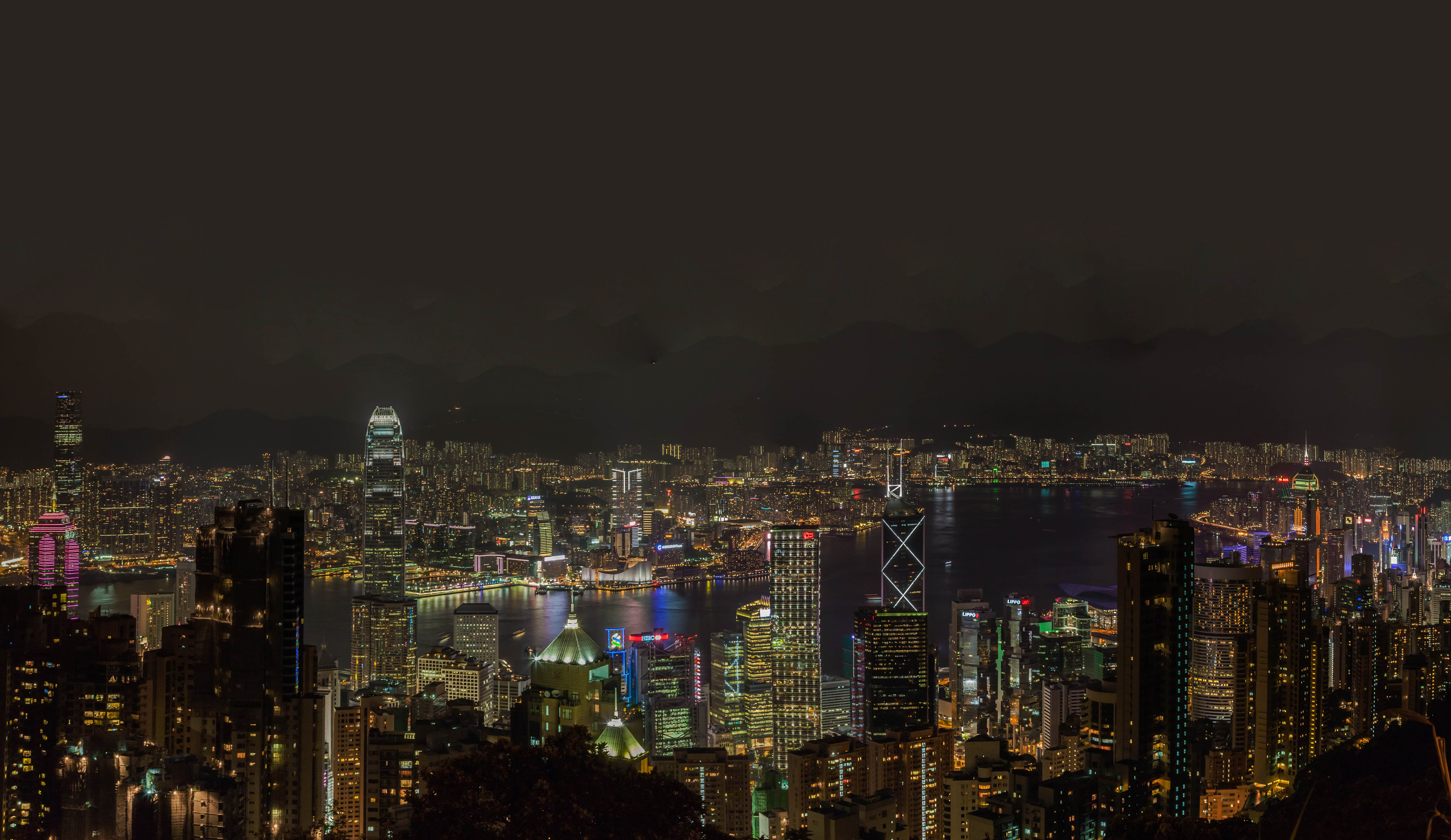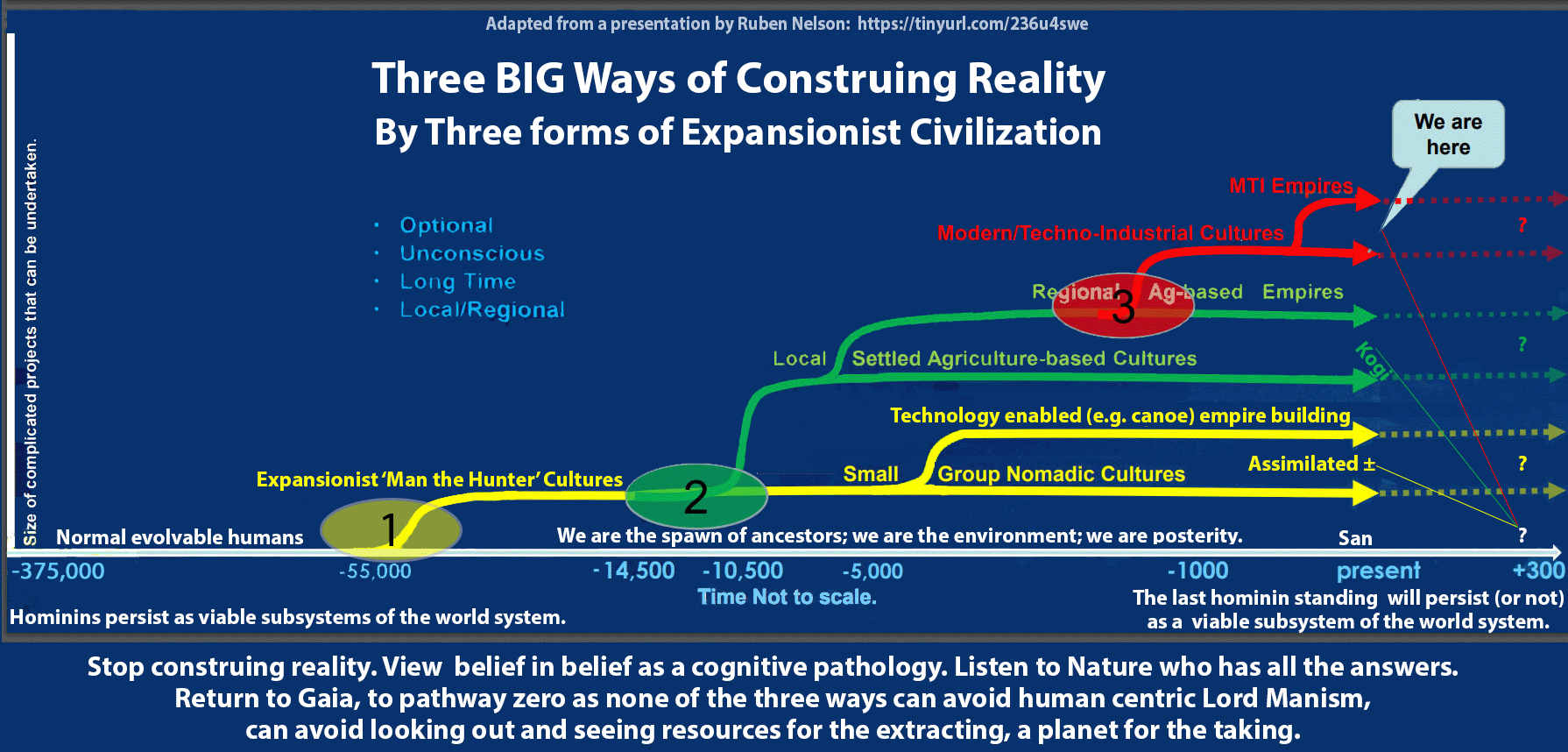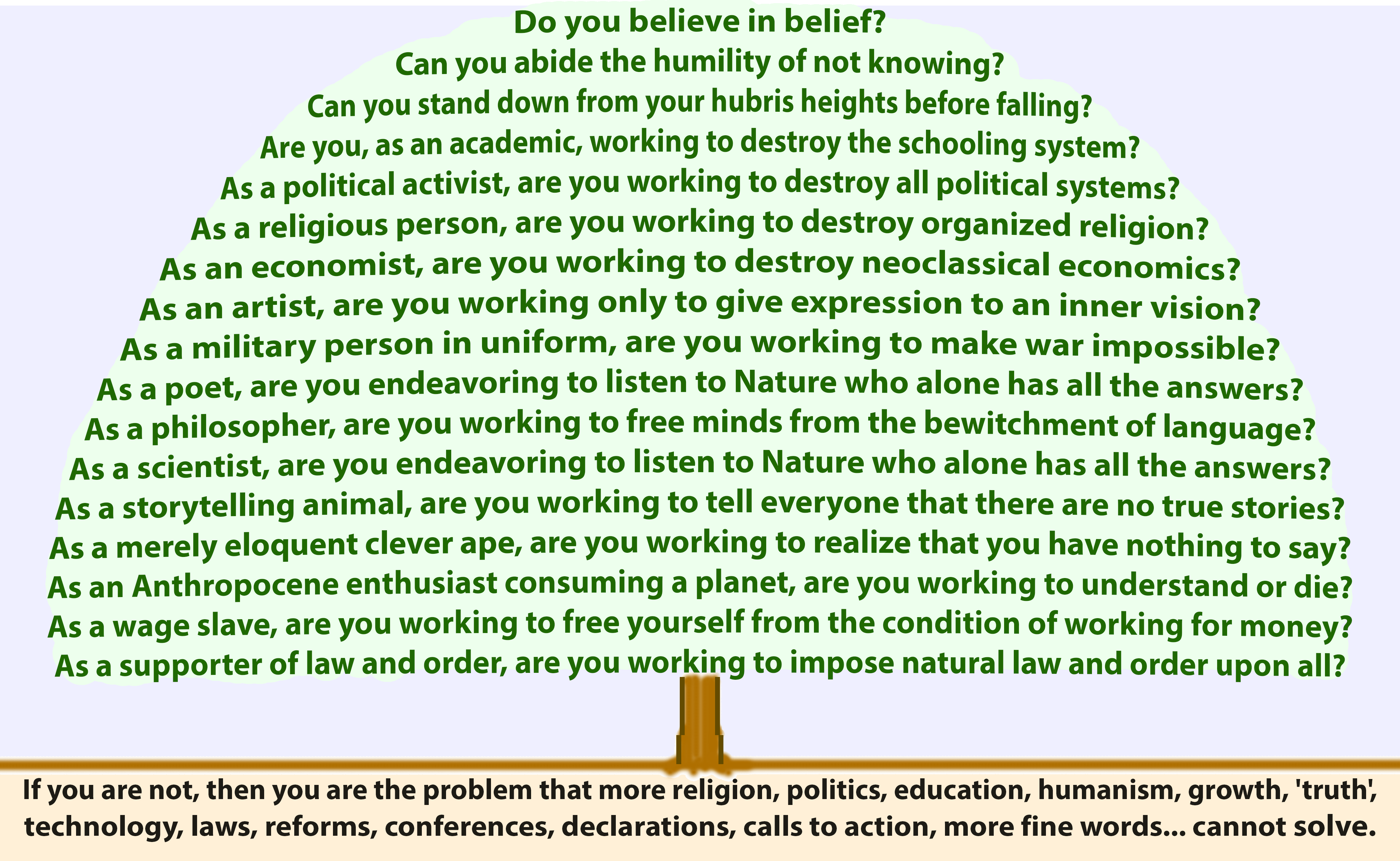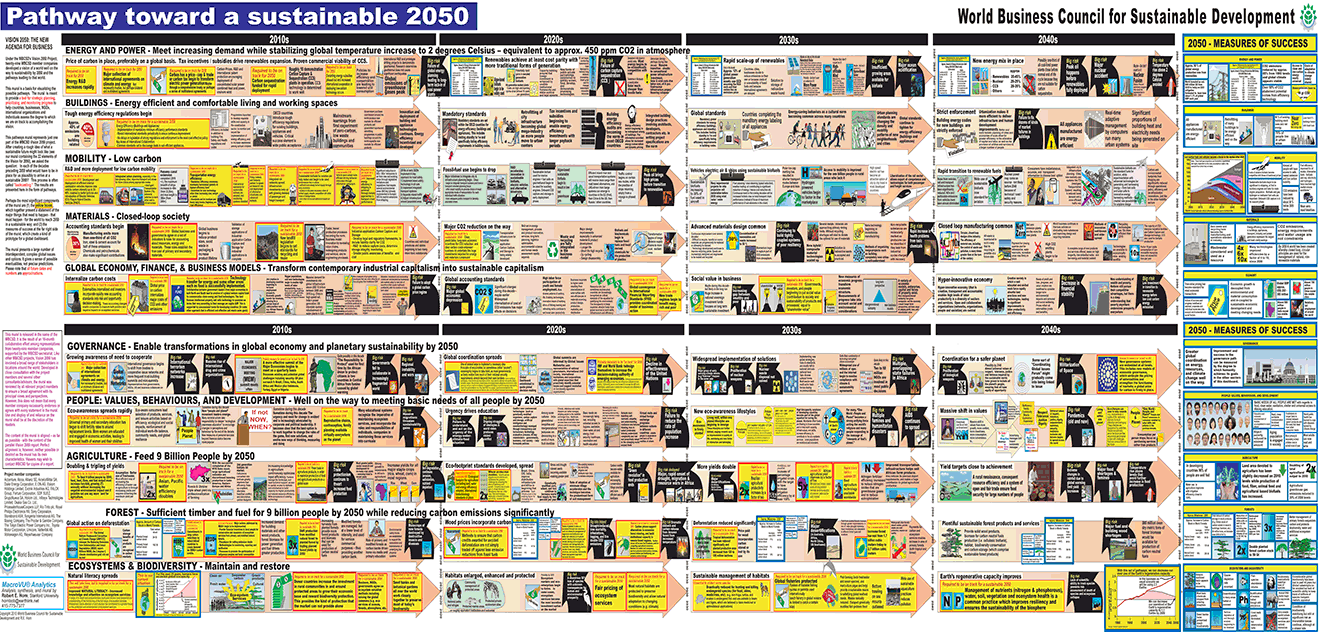.

THURSDAY, OCT 31, 2019

Lord Man
Omniscient conqueror extraordinaire
Eric Lee, Sue Lee, A-SOCIATED PRESS
TOPICS: HUMANITIES, UNCIVILISATION, FROM THE WIRES, THINKING ABOUT DESCENT
Abstract: A guide to the human problematique in images is itself an image. I bought the ultimate coffee table book for left-leaning environmentalists (there actually are a few right-leaning). Although the images were used to tell a tangled (politicized) tale, they are images of the what-is, of what doesn’t go away because you stop believing in other people’s worldview. Any political spin is a distraction. Most of the images and quotes come from the book, Overdevelopment, Overpopulation, Overshoot, a 12" x 13" picture book that opens to some 12"x24" pictures. Some of the images are striking, i.e. serve as a 2x4 up against our blindered heads, which is arguably better for us than the latest comic book offering or superhero movie. Without thinking good or bad, take in the information about what’s out there and think solutionatique, otherwise the images become part of the problem. More amygdala's hijacking more prefrontal cortices is so BAU (business-as-usual).
COOS BAY (A-P) — The original images in original context may be viewed here and here, and the book itself, vastly more impressive, and easily the heaviest book I have, can be acquired here for a bit of digital counterfeit money. Over 50 images and graphics not in the book were added.

Overdevelopment, Overpopulation, Overshoot
Consider that Modern Humans MUST Renormalize or Die
A Parable
To Be Fruitful and Multiply
The Human Tide
Standing Elbow to Elbow on Zanzibar (And Elsewhere)
To Feed the Multitudes
Overshoot
Our Material World
The Trashing of a Planet
Nature Unraveled
Wildlife Lost
Energy Empowers
Foul Water, Foul Air, Foul Planet
Darkness at Noon
Climate Change
Parable Redux
Afterword
Some Intro Comments/Images
Initial comments are a response to reading multiple 'reviews' (reactions) to the book Overdevelopment, Overpopulation, Overshoot that most of the images and content of this web page comes from. For the most part the right-leaning to Far Right ignored this book by and for Far Left 'enviro-mystic nutcases'. The left-leaning to Far Left saw it as a neo-Malthusian screed by misinformed environmentalists who haven't heard that Malthus, the Ehrlichs, Bartlett, the Meadows, Odum, Hardin, Catton, and the 1,675 senior scientists who signed the World Scientists Warning to Humanity in 1992 (that the left-leaning New York Times, right-leaning New York Post, and most media deemed not newsworthy and neglected to share) got it all wrong. They made predictions or something that didn't happen. They're just a bunch of doomers who want to kill black babies by claiming there are too many non-white people. Their shrill views and dissonant claims are disgraceful. No right thinking progressive person who was properly educated would be deceived by them.
So look around. Filter every narrative you've ever heard of through a politicized fine-toothed mesh of nuanced analysis within a concept-mongering house of mind mirrors. What confirms your political/tribal certitudes is true. All such reactivity is a distraction, as is my reactivity to the 'mere eloquence' of the intelligentsia. So click to skip to beginning.
About 38% of scientists self-identify as 'liberal' and 14% are 'very liberal' (52% liberal) and 9% admit to being 'conservative'. And 35% are 'moderate' in their politics, meaning up to 4% could be sane, i.e. apolitical or anti-political. Political animals tend to view my narrative (Nature's?) as an existential threat to their political solutions (because it is). I see the need for rapid degrowth of human population (managed or not) and of the growth enterprise, which to the right-leaning means I'm probably not an Anthropocene enthusiast, and to the left-leaning that I'm a racist who wants to kill black babies like human ecologist Garrett Hardin from whom I admit I may have learned a few things.

Earth before the glow. Deglow NOW!
When looking at all the pictures I noticed that, of the about 166 photos, three of four that featured individual drop-dead gorgeous humans had high melanin content skin. But I only noticed after I noticed that of 14 photos featuring humans overpopulating en masse, none were of Africans (the one showing Africans en masse is not from the book). The reactivity of the left-leaning was anticipated but not deflected. 'People would rather believe than know.' [E.O. Wilson]

Madonna and child.
No pictures featured the Emperor's new clothes, but if the right-leaning are 'wolves', the left-leaning are wolves in sheep's clothing. Okay, there are racists, but there are also plenty of racists in sheep's clothing serving their color-think worldview (which too shall pass away).

Another day, another fist full of dollars to spend in New York City, Times Square.
Today there are right-leaning Anthropocene enthusiasts and left-leaning Anthropocene enthusiasts (in sheep's clothing), i.e. BAU and GND enthusiasts, and for some reason antifa enthusiasts look like fascists in sheep's clothing.
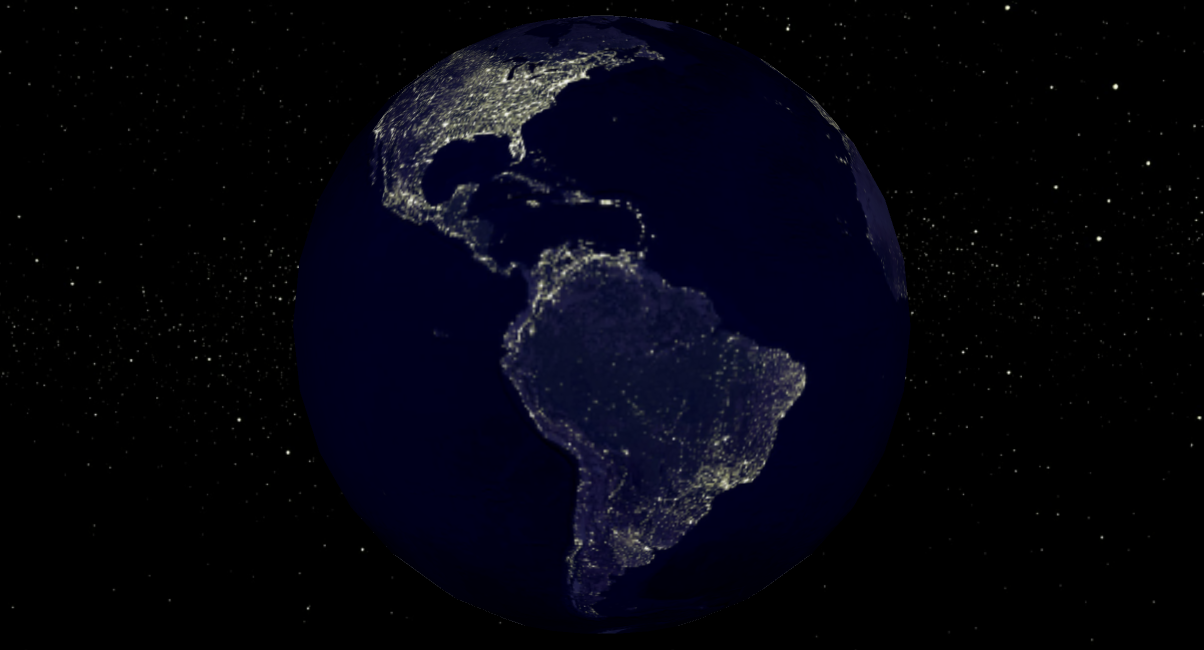
Earth at Night during the glow.
Maybe 25% of humans are sane..., no, sorry, I was thinking maybe scientists. As I admit, I'm biased; I'm an extreme cornucopian optimist, but only before breakfast. After breakfast I sometimes imagine that with proper belief therapy, 0.25% of us hu-mans of NIMH could become sane, meaning my extreme cornucopian optimism gives way to Panglossian optimism because this world is clearly the best of all possible worlds (that we know of) that exist.
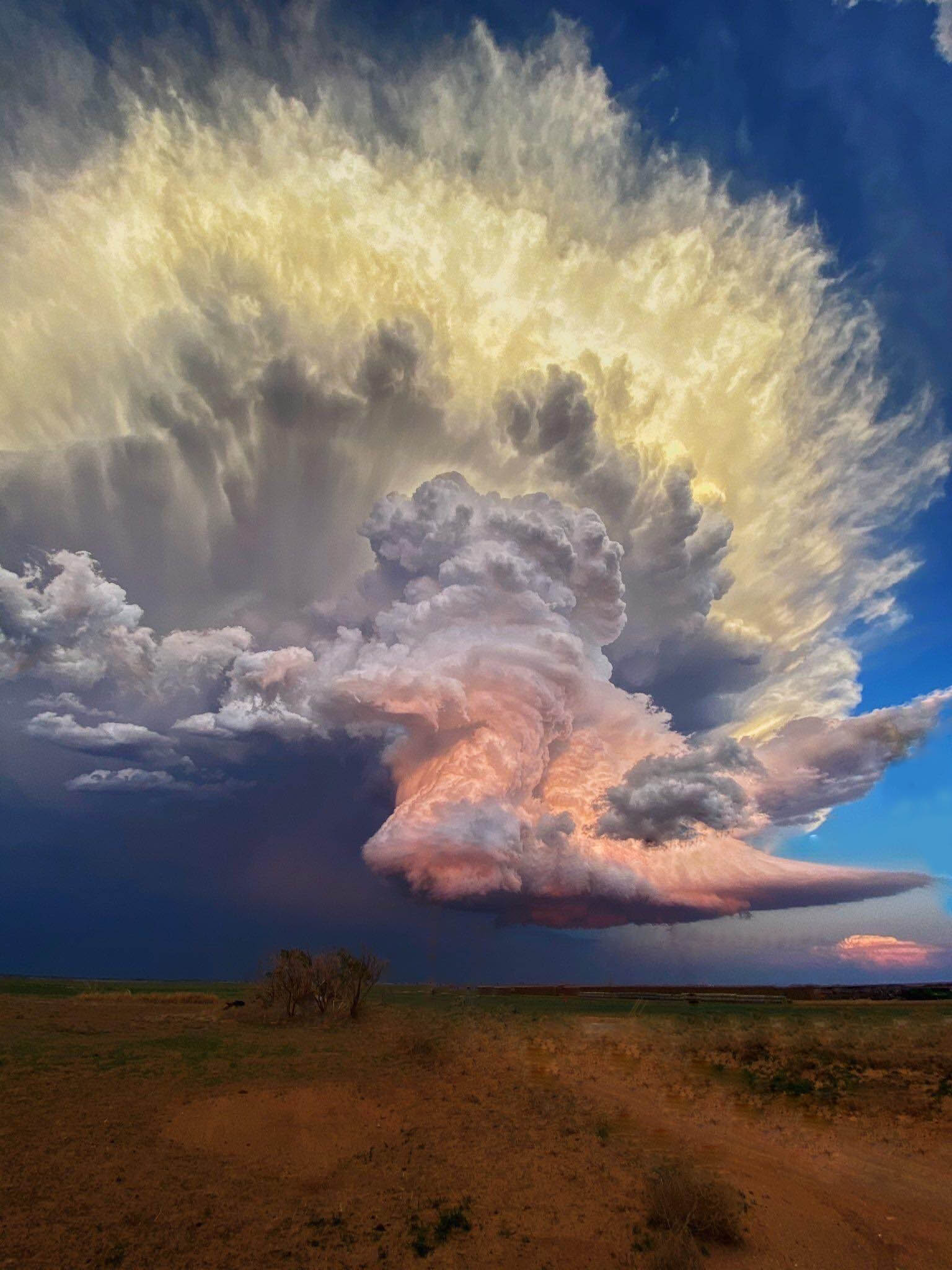
Supercell, Texas.
The Now is the what-is, apart from which not a thing is, i.e. is 'possible', except in your dreams which are like voices in our heads. Could we understand the dynamic we are captured and being dragged along by? And thereby alter our trajectory? I think so, as a fideist, but I'm biased.

Patagonia coast.
I'm a fideist because I cannot believe in a future without posterity living prosperously on an abundant Earth. I believe in brother cabbage who has half my genes if not my memes.

But after breakfast there is no 'I' to have genes or memes (do memes have value?). There are no 'my' stories, merely stories, a chatter of complex verbal behavior that sometimes comes out as typing.
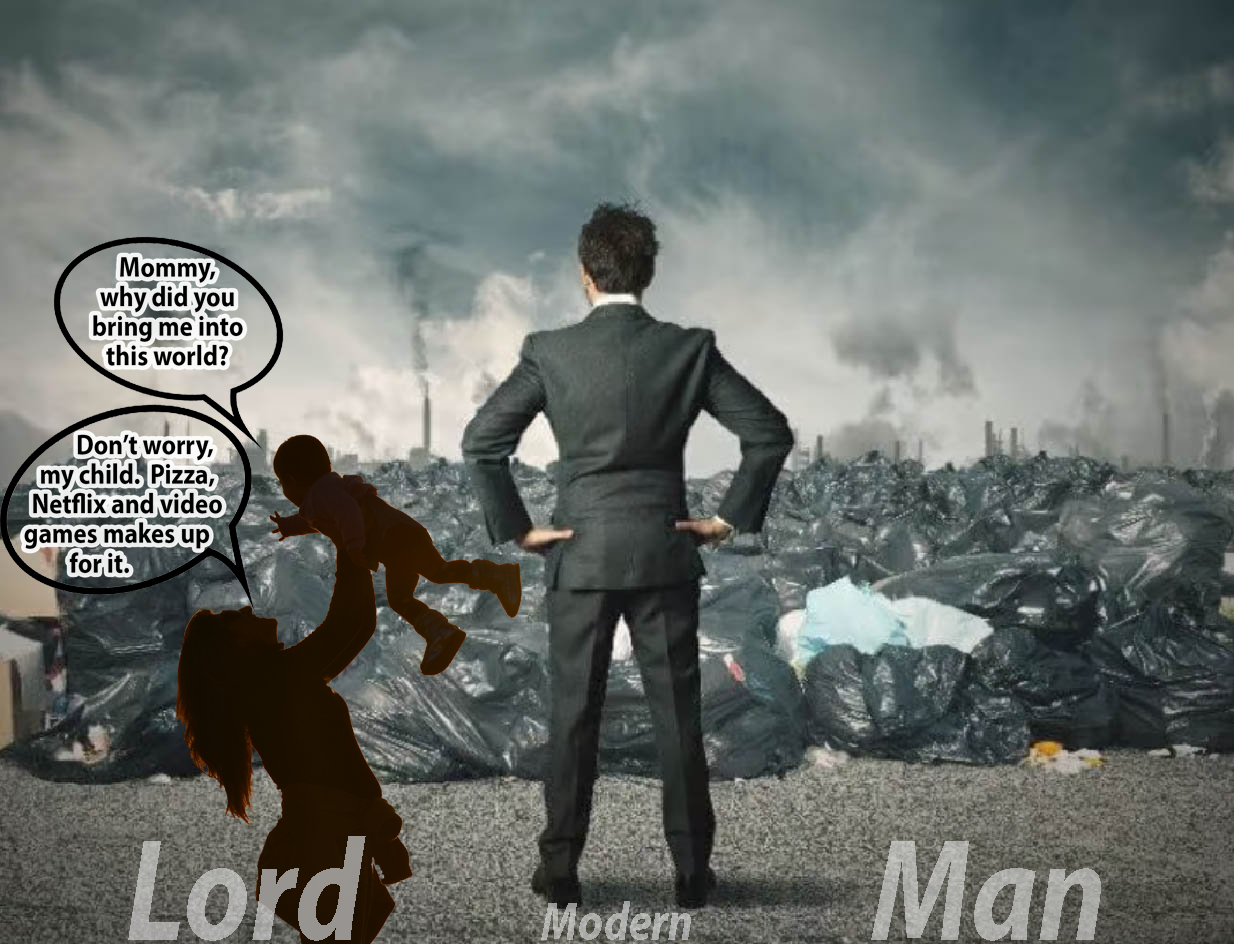
"Houston, the planet has been taken. And now what?"
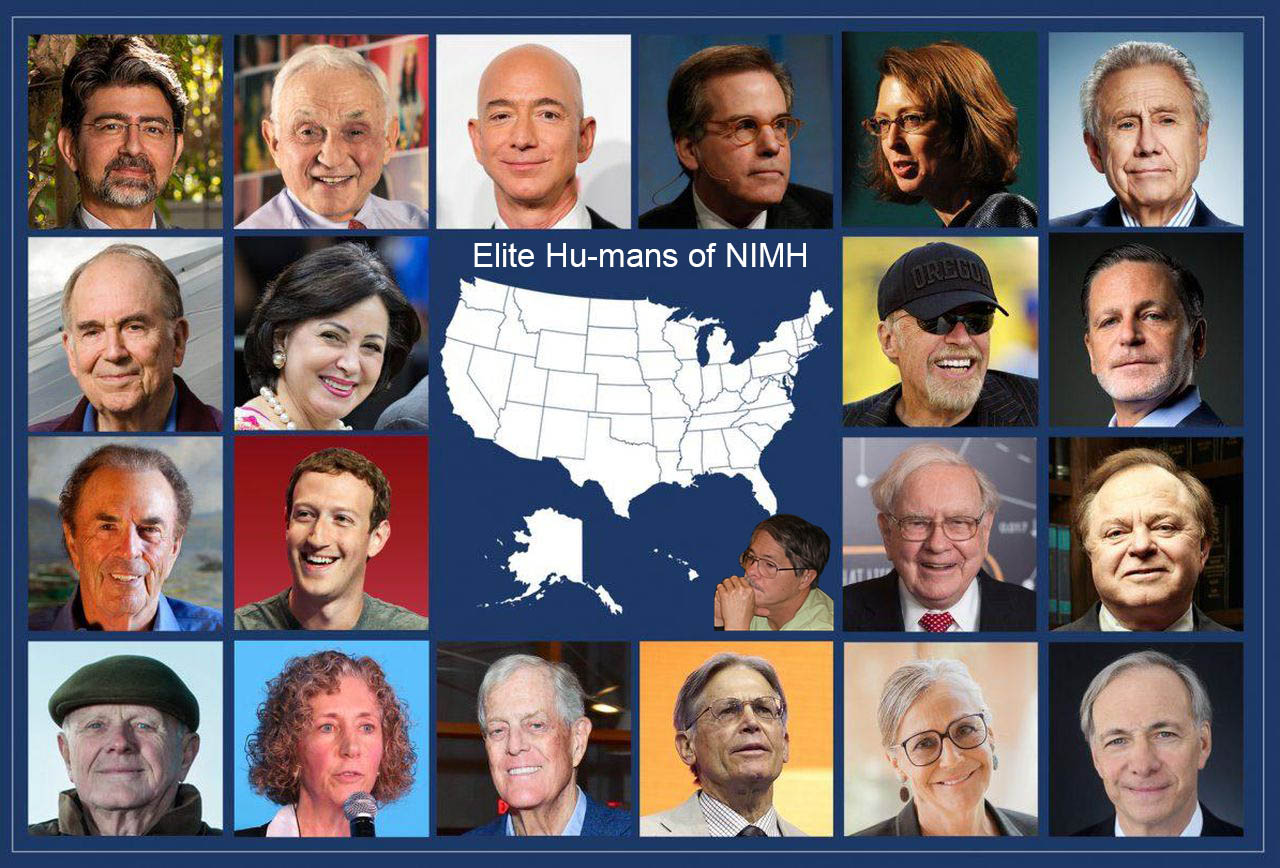
Top 20 richest by state in USA.
Bezos and Gates live in Washington and Bezos is a bit richer, so Gates doesn't make this list.
Yes, about 80 percent of the most moneyed of Americans are white men and 20 percent are white women. History doesn't go away because a few years or decades go by, and neither does systemic racism, sexism, genderism, and tribalism. So, to confess my bias, I looked for an image of a beautiful Black man to epitomize Lord Man, but I only found the darkly wise Darth Vader to balance the photo that featured five pregnant women who were all deathly pale. As the properly leaning know, the only overpopulation problem is that there are too many rich white people who consume too much stuff. The color of the empire-builders, however, is a distraction. 'Race is a crock of shit' as is national/tribal identity.

The cover is as above, and back cover as below. As one reviewer noted, 'Malthusian literature has an unfortunate and disgraceful history of portraying development in poorer nations as somehow unnatural and a threat to Western society. As the American anti-racist organisation Imagine2050 put it in a review of Overdevelopment, “this photo essay is part of a long history of the use of fear of overpopulation to advance policies that are biased, unjust, or often downright racist”. In failing to properly and adequately contextualise and discuss issues of exploitation and inequality and how they relate to the issue of population growth and overconsumption Overdevelopment, Overpopulation, Overshoot ultimately fails to move the debate forward, instead perpetuating the same unbalanced westernised perspective that has traditionally inspired so many other Malthusian works.'

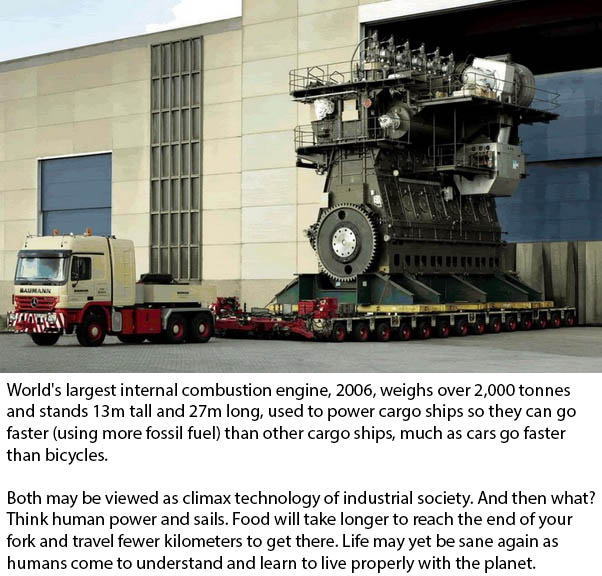 No, dear Albert, I can't and that bothers me as I think I'm such a clever ape. So surely there has to be some problem.... Oh, I got it, there's a shortage of kidneys for those who can afford transplants, and what happens when our energy slaves are depowered by eco-fascists? Without fossil fuel empowered AI minions, more wage slaves will be needed, not less. That's why China jettisoned its one child policy, right?
No, dear Albert, I can't and that bothers me as I think I'm such a clever ape. So surely there has to be some problem.... Oh, I got it, there's a shortage of kidneys for those who can afford transplants, and what happens when our energy slaves are depowered by eco-fascists? Without fossil fuel empowered AI minions, more wage slaves will be needed, not less. That's why China jettisoned its one child policy, right?
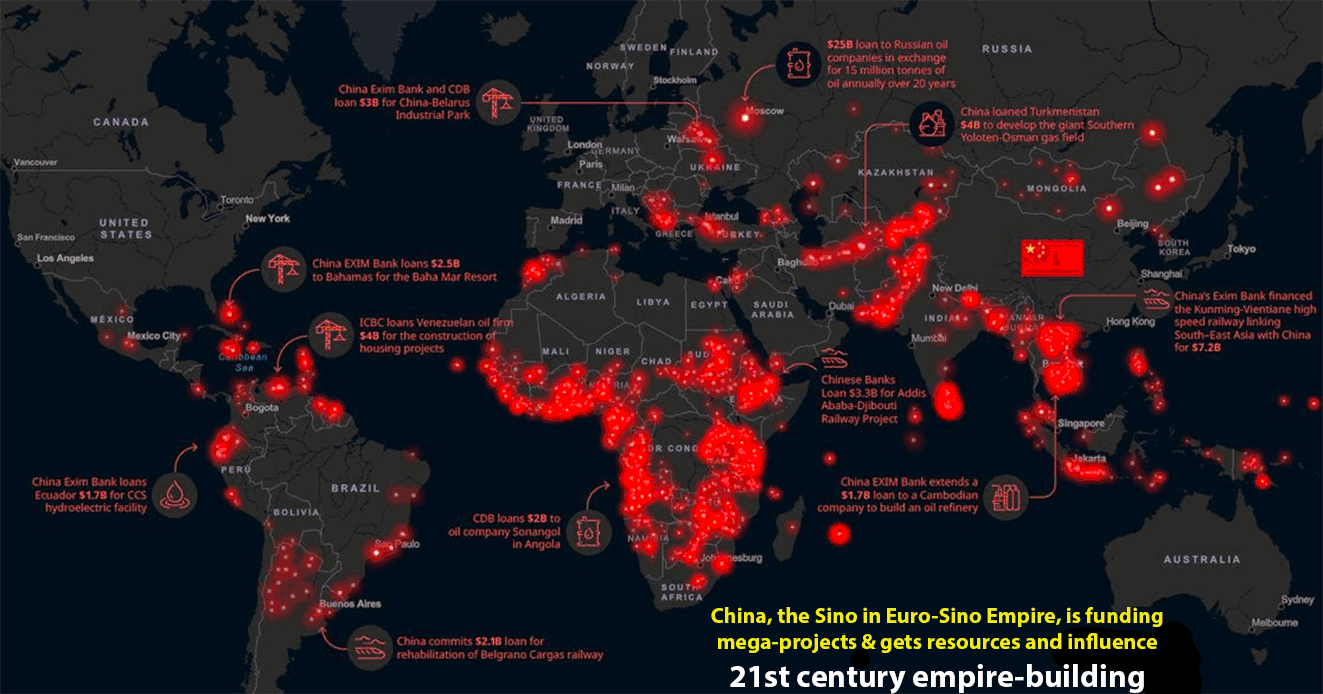
In all your years of schooling (not to be mistaken for education), did anyone mention that you live in the Euro-Sino Empire? Or that empire-building is not remotely sustainable? Will Lord Man ever learn to just say no to shortage-building short-term self interest..., to empire-building? But how can enthusiastically growing the economy at 5 to 10 percent build shortage? Oh, sorry, stupid question: hu-mans are time blind.
You and I put together can't stop progress, but I'm not so sure about Nature.
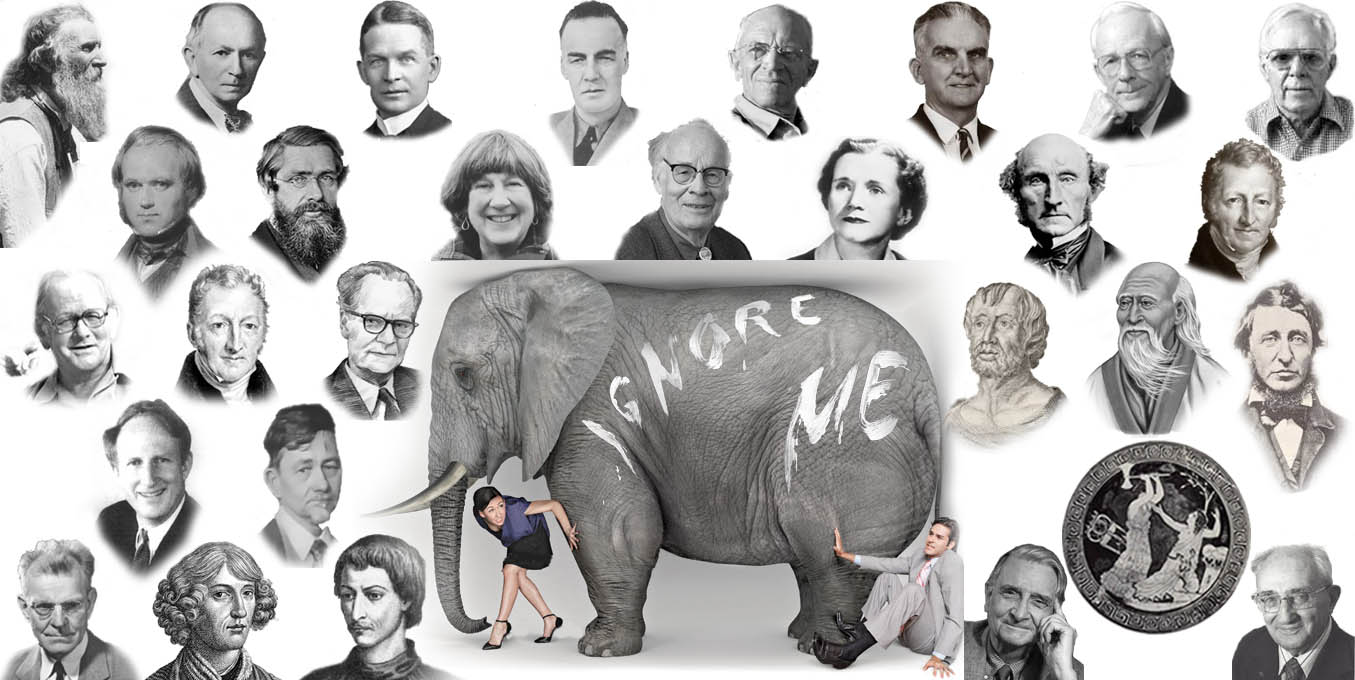
[Mouse over, pause; sorry if too many dead white men, but one goddess (e.g. Donella) = 100 dead men any day.]
If I answered a Quora question, 'If I'm elected to office and could (okay, maybe will)
only read one book, what should I read?', what would my answer be?
Easy, Thinking in Systems: A Primer by Donella Meadows 2008
The Overshoot book is faulted for quoting racist Malthusians like Garrett Hardin and other extremists alongside 'far better respected mainstream figures such as the Dalai Lama'. So from the merely left biased view, the book is too far-left, too far outside their Overton window as it features radical left Deep Ecology views, which it does. Any quotes I use I will vet.
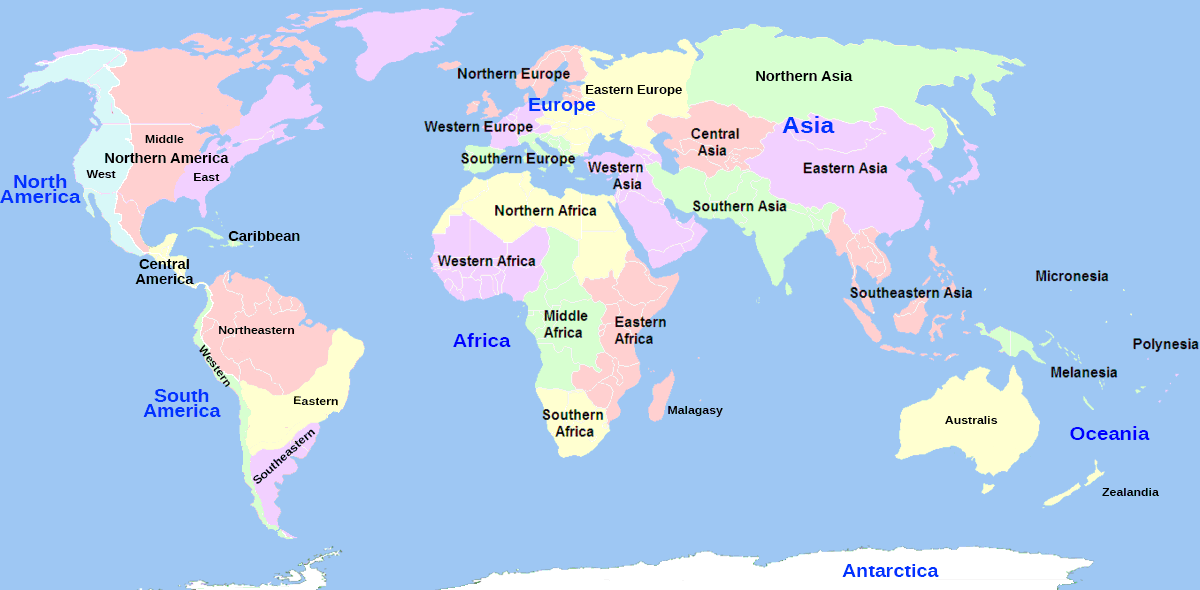
Apolitical management map of world system: 7 ecolates, 30 sublates, 20+ thousand watershed management units.
Each sublate would contain bioregions, e.g. I live in the Cascadia bioregion,
aka Pacific Northwest bioregion in the Pacific Northwest Coast Range ecoregion.
I may cite many of the same sources as deep ecologists cite, but DOWN WITH alleged political 'solutions', e.g. Decisive Ecological Warfare, and all other manifestations of belief-based environmentalism as enthusiasts either fail to understand the problematique or are unable to think about real solutions that might work. Nature 'decides' what works. Pundits don't get to decide. There are no political solutions that will alter the human growth dynamic. Deeply held beliefs are involved in, but do not cause, our trajectory (energy is a precondition).
'Reality must take precedence over public relations [politics], for Nature cannot be fooled.' —Richard Feynman

And I added the question mark, and we may reach 8 billion in 2022, but I don't want to quibble.
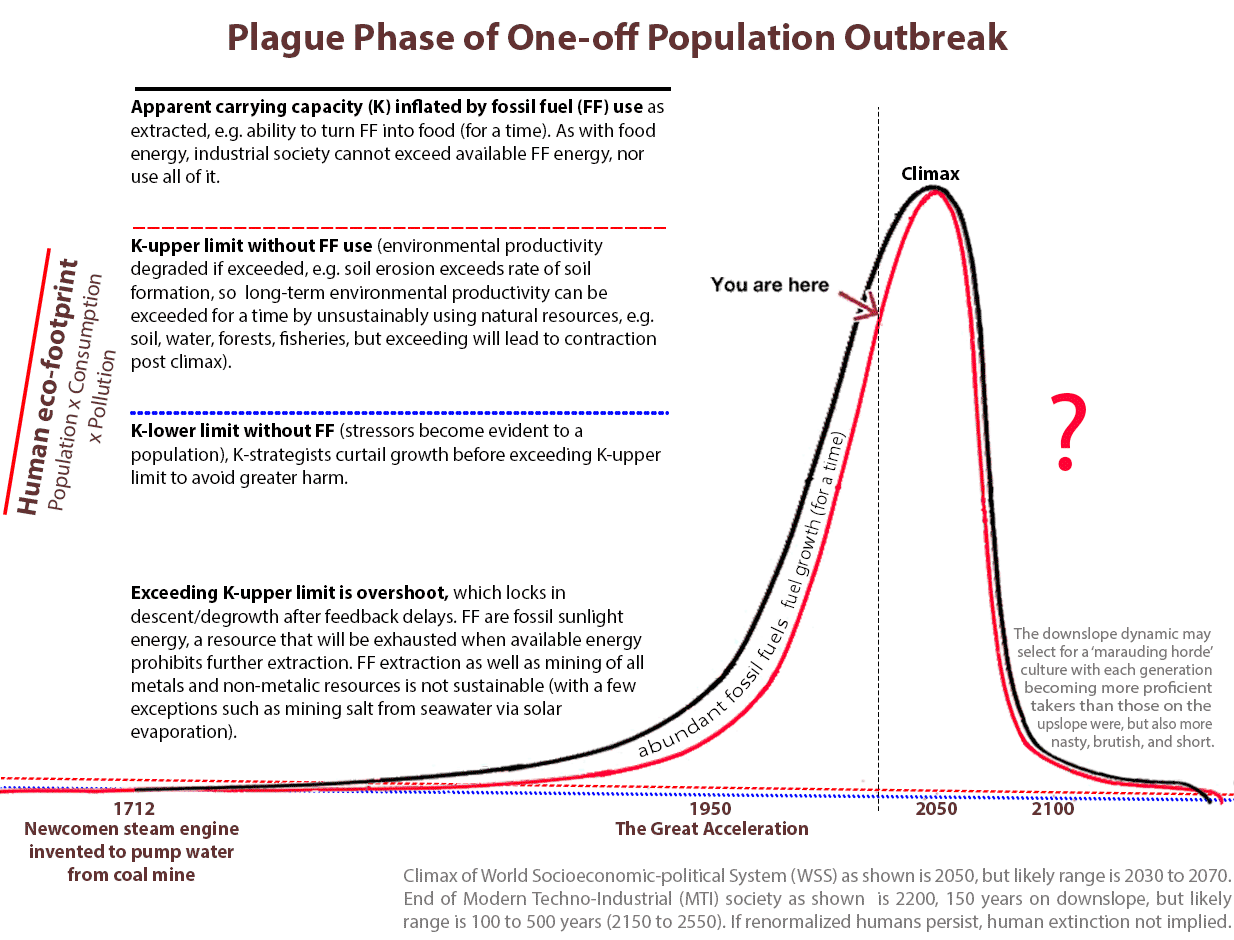
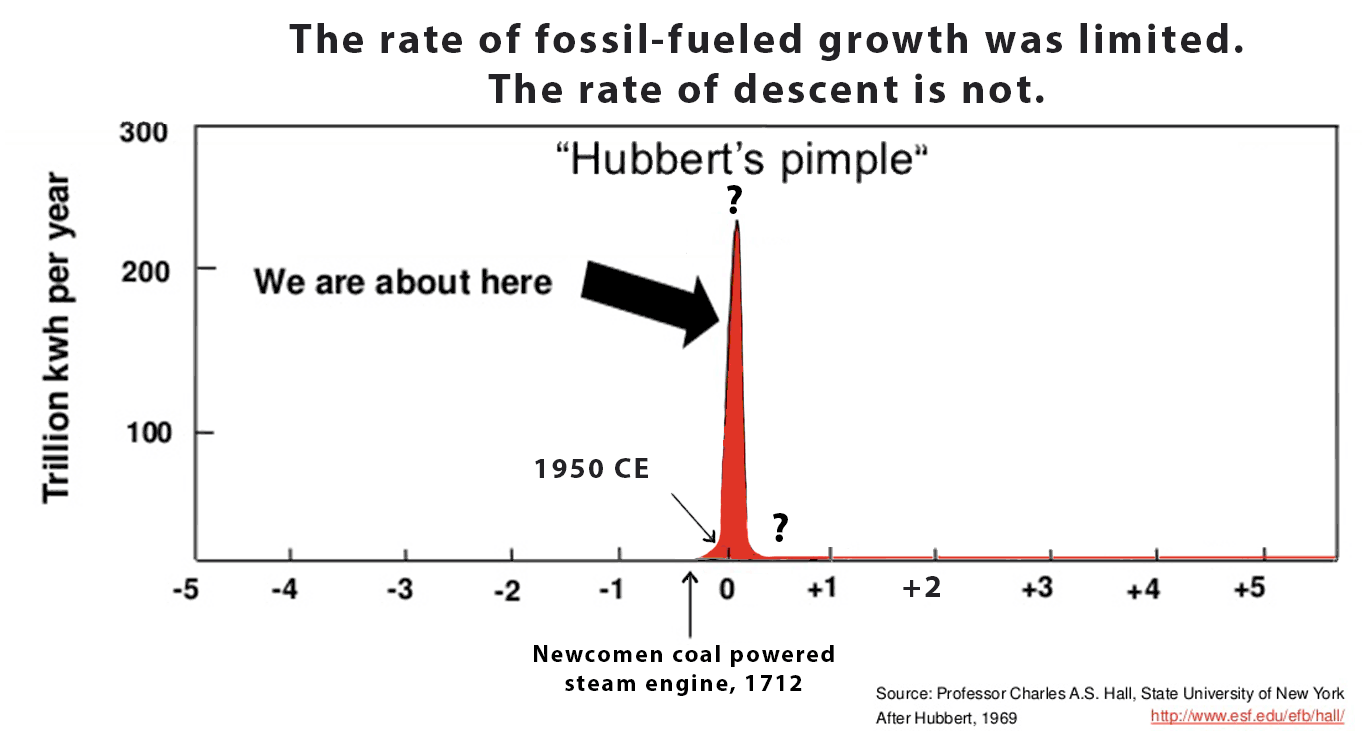

Vancouver Island, Canada.
The view from the Dark Mountain changes slowly. In 500 years or so it may again be covered in old growth forest.

Easter Island
'The human society of the planet is reaching the climax of its succession. Reversals of attitudes, policies, and laws are to be expected in the transition from the era of growth to a time of descent. By developing explanations and plans now for making descent prosperous, we can be ready when the shocks of change galvanize the attention of society. Some can have faith in the future that comes from understanding energy principles. Others will find faith in religions that adapt the necessary commandments for once again fitting culture to the earth. The people of Easter Island disappeared, leaving only their monuments as an example to the world of what happens when culture cannot downsize to fit its environmental production.' —Howard T. Odum, who was not an environmentalist, much less a Deep Ecologist (just a know-nothing systems ecologist).
'The people' who put up 887 high-rise statues also devised the Rongorongo writing system. No one who could read it survived. Ergo the information content of their culture, 'the people', disappeared other than as a remnant population.
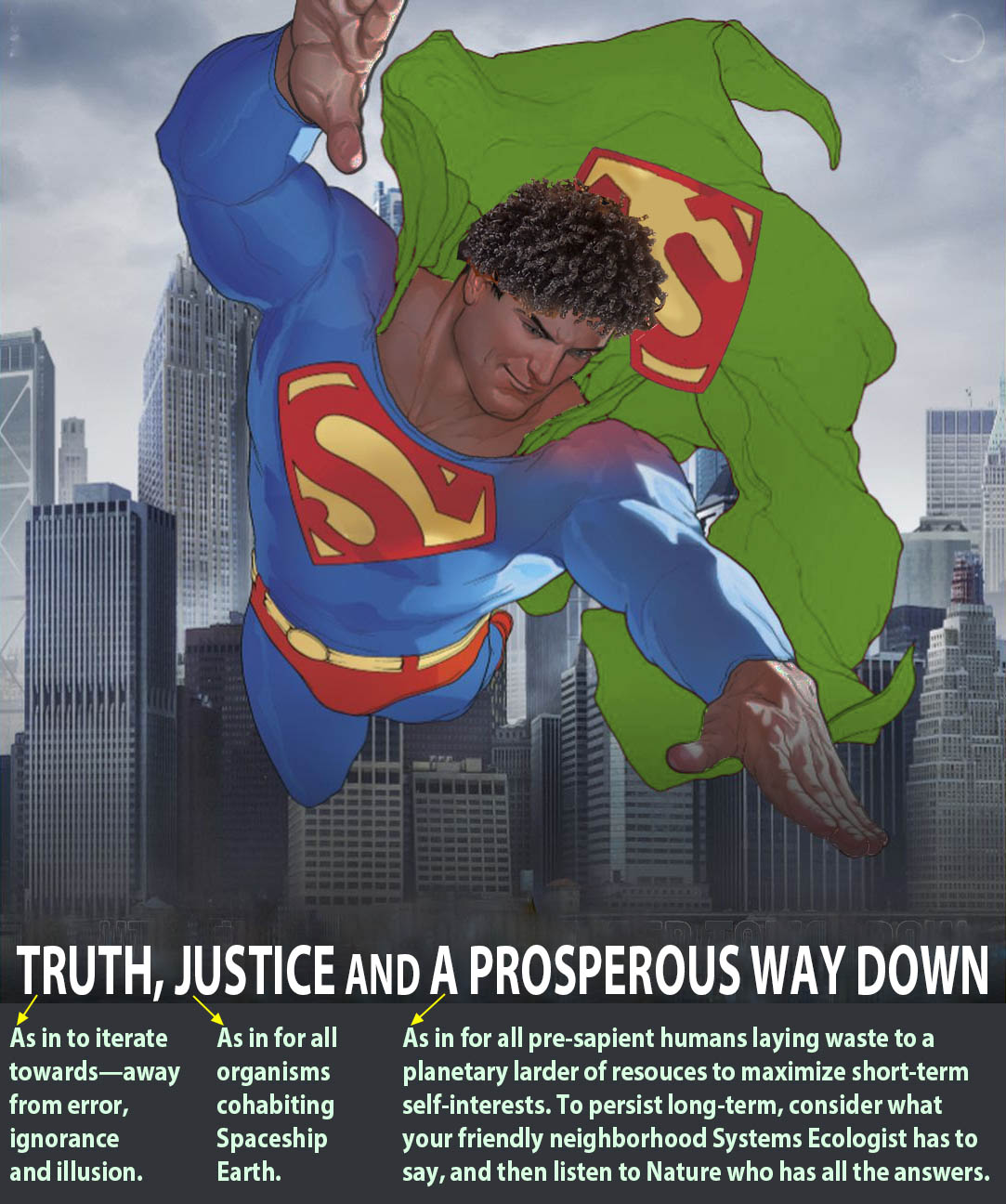
Superman's motto changed to 'Truth, Justice and a Better Tomorrow', aka 'Progress' for..., so the above.
Truth: 'You iterate towards the truth. You don’t know it....eventually we'll have a human on the planet that really does understand it and can live with it properly. That's the source of my optimism.' —James Lovelock, who exemplifies extreme optimism and pessimism (he thinks it possible/likely that humans will experience an 80% to 90% depopulation in the 21st century).
Justice: On Spaceship Earth, R. Buckminster Fuller and Kenneth Boulding.
A Prosperous Way Down: 'Nature has all the answers, so what is your question?' – H.T. Odum, systems ecologist.
Consider that Modern Humans MUST Renormalize or Pass Away
We are in civilizational overshoot?

Will we come to be known only as the builders of ruins? Known by whom? Cairo, Egypt

Billionaire Vijay Mallya's Mansion Atop A Skyscraper In Bangalore, India

Chongqing, China

Downtown Seattle Washington, USA, in the Heart of the Retail District

Dubai, India, 1985 and 2016

Dubai, The Hollow City of Artificiality that Fossil Fuel Built

Electrical Wiring and Water Pipes in a Brazilian Favela

Evening Traffic in LA, City of Angels, USA

Ghost City in China, Tianducheng, made to be a Replica of Paris

Hong Kong Street Life and Future Ruins

Hong Kong Ruins will Make a Lovely Sight

Houses on the Roof of an Eight-Story Mall in Zhūzhōu, China

Hyderabad, India

Renormalize NOW: Juhu beach in Mumbai, India

Kowloon Peninsula, Hong Kong. 1964 - 2016

Highway too?

Some years ago a child was heard to say, "Look Mom! The tree!" Manila, Philippines

Mirny Diamond Mine Siberia, Russia

New Belgrade, Serbia

New Delhi - During Lockdown vs. After

Next to a Helicoidal Street in Chongqing, China

Petare, Venezuela

Pima-Maricopa Indian Reservation on Left, Scottsdale AZ, USA on Right

Uae Nad Al Sheba III, Dubai, UAE

Fastest growing city in the world... for a time, Dubai, UAE
Omniscient conqueror
In the beginning was the inflation from which light cameth as did the particles—from which all stars, quasars, galaxies, clusters of galaxies, superclusters, planets, moons, dust, and organisms did form. In a galaxy, one among billions, from the dust of first generation stars, did arise Sol having a Class M planet upon which an abiotic replicator begat more like unto itself, evolving into deoxyribonucleic acid, which did bioticly replicate more like unto itself.
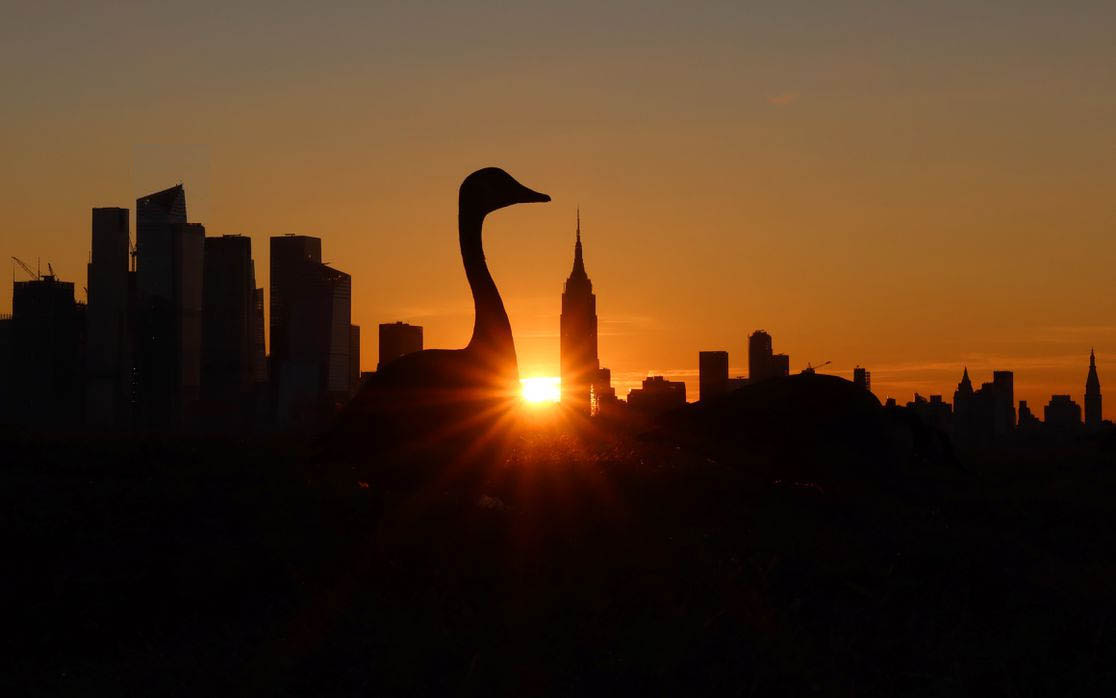
Lord Goose
In the end it was Lord Goose who prevailed, who towered over Lord Man's Empire State Building. Hubris Man came to know his place in Nature.
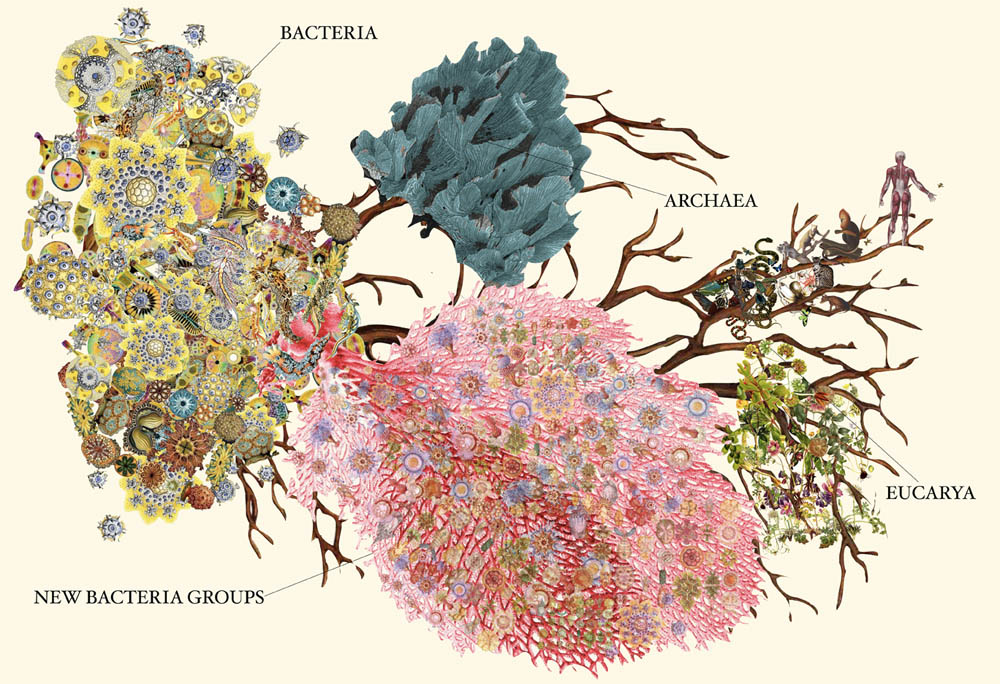
With genes did information come into being, a thing new under the sun, and its value grew over the eons—know thee the sanctity of information. And Lo, there were rays from the heavens, and mutation came to pass with error correction. And the deoxyribonucleic acid begat prokaryotes. And there was variation amongst them, and competition, so that some thrived; but others vanished from the planet—natural selection be praised!

Dolphins at play, South Africa.
And prokaryotes multiplied upon the face of the planet: the true bacteria, the mitochondria, and the chloroplasts; and the archaebacteria. And the mitochondria and chloroplasts knew the prokaryotes, and they cleaved to one another. And together they begat the eukaryotes who were nucleated unto themselves. But the prokaryotes shall remain the inheritors of the pale blue dot unto the end of days.

Migrating zebra and wildebeests, Serengeti.
Now the eukaryotes multiplied greatly, and they begat sixty or more lineages of protozoans, red algae, flagellates, ciliates, diatoms, brown algae, giardia, slime moulds, slime nets, red seaweeds and other wonders; but also they begat the opisthokonts, the begetter of the creature that begat the plants, and which also begat the microsporidia and the fungi, and the choanoflagellates, and the metazoa—also to be known as animals. And the plants and animals and fungi are close kin, and together they departed from the other lineages.
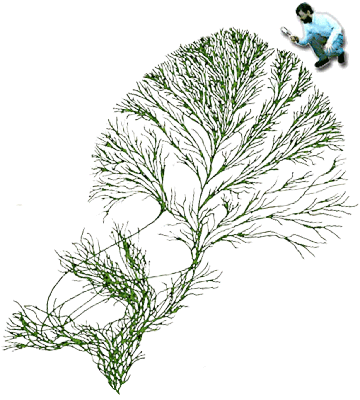
And creatures did overpopulate, until corrective feedback loops restore balance. 'Nature is unkind.' —Laozi

Bull elk, Lord Elk, Yellowstone.
The animals also knew each other in their day. Over the generations they divided amongst themselves and begat sponges and placozoa, and also the eumetazoa—the comb-jellies, as well as the cnidarians also known as jellyfish, sea anemones, corals and hydra. And the eumetazoa had tissues and organs. And they also begat the bilateria, which are the same on the left and on the right and have three layers of cells, and among these are many worms, and many are the children of worms.
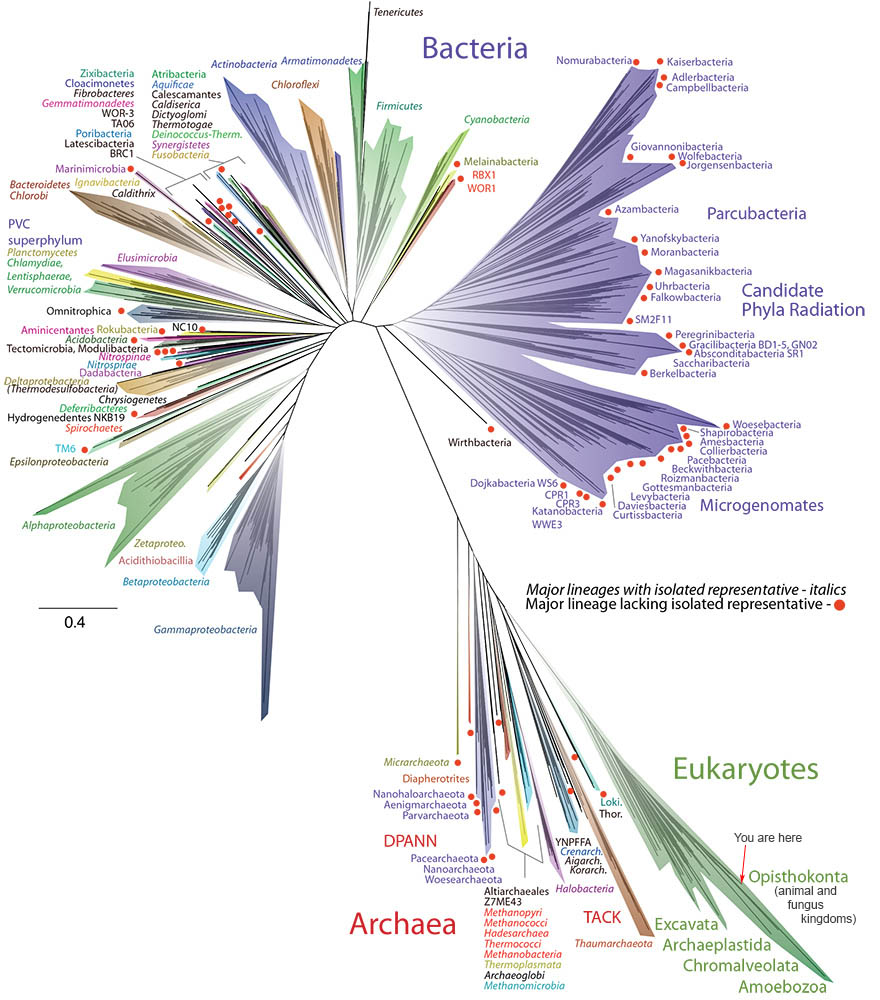
Myriad were their languages, from the nearly imperceptible song of moss to the bugling of elk and caroling of whales.

Sperm whale pod with calf, Azores.
After some time, the deuterostomes begat the echinoderms which are the sea urchins and starfish and many others too; also the hemichordates; and the chordates, whose back is stiffened by a rod and who have a dorsal nerve. The chordates begat the generations of the urochordates and the amphioxus and lancelet; but also the chordates begat the vertebrates who have a spine. And among the vertebrates are all the fishes: the hagfish and ostracoderms, which have neither skulls nor jaws, and the lamprey, which has a skull but no jaws. And there are many other creatures among the vertebrates, but also the gnathastomata, which have both a skull and jaws, as thou doth, being of a kin with such fish.
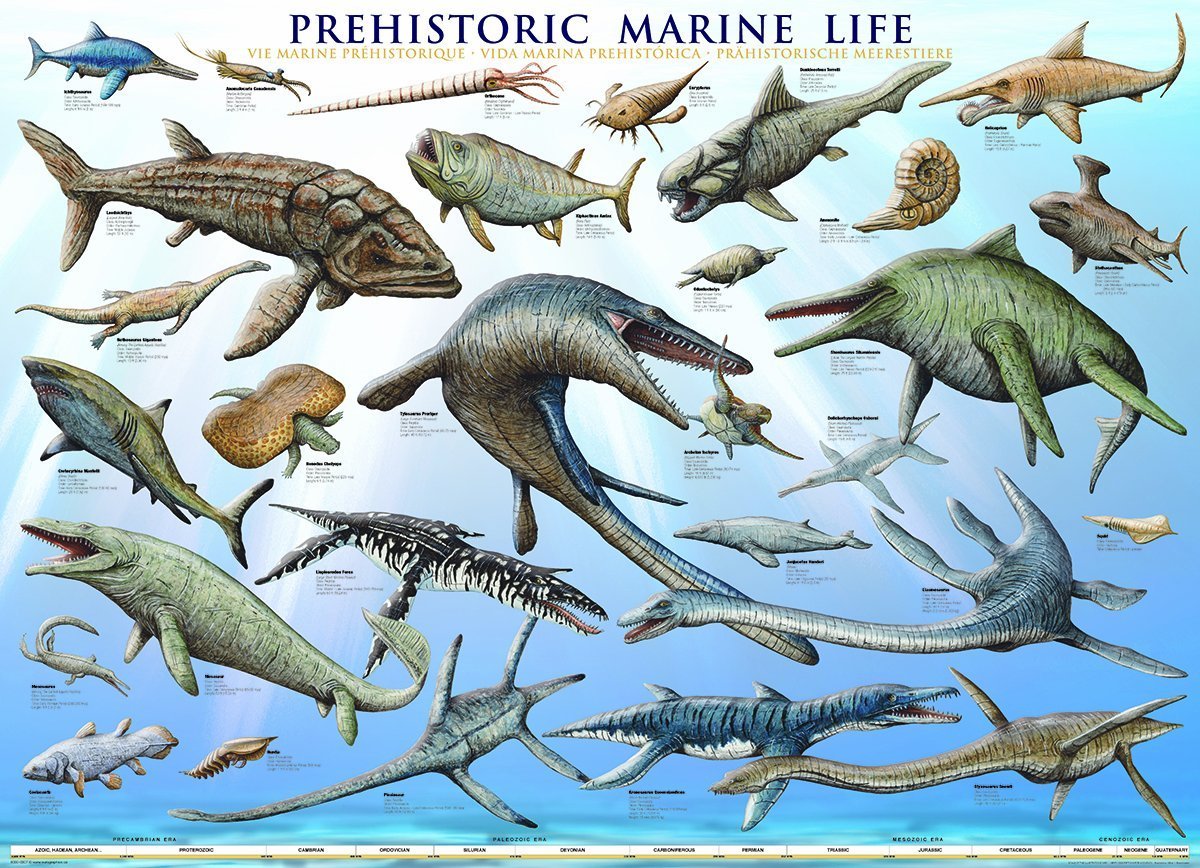
Near the endgame, whales performed their symphonies in the deep. The sounds of life were everywhere. Life pulsed and contracted and flourished through the ages.

Lord Man, Ayers Rock.
Eventually, a being darkly wise, and rudely great: with too much knowledge for the skeptic side to parse, with too much weakness for hubris pride, appeared who learned to speak and count, but who put self over system. For millennia she lived well among her wild kin until agriculture did empire-building make.
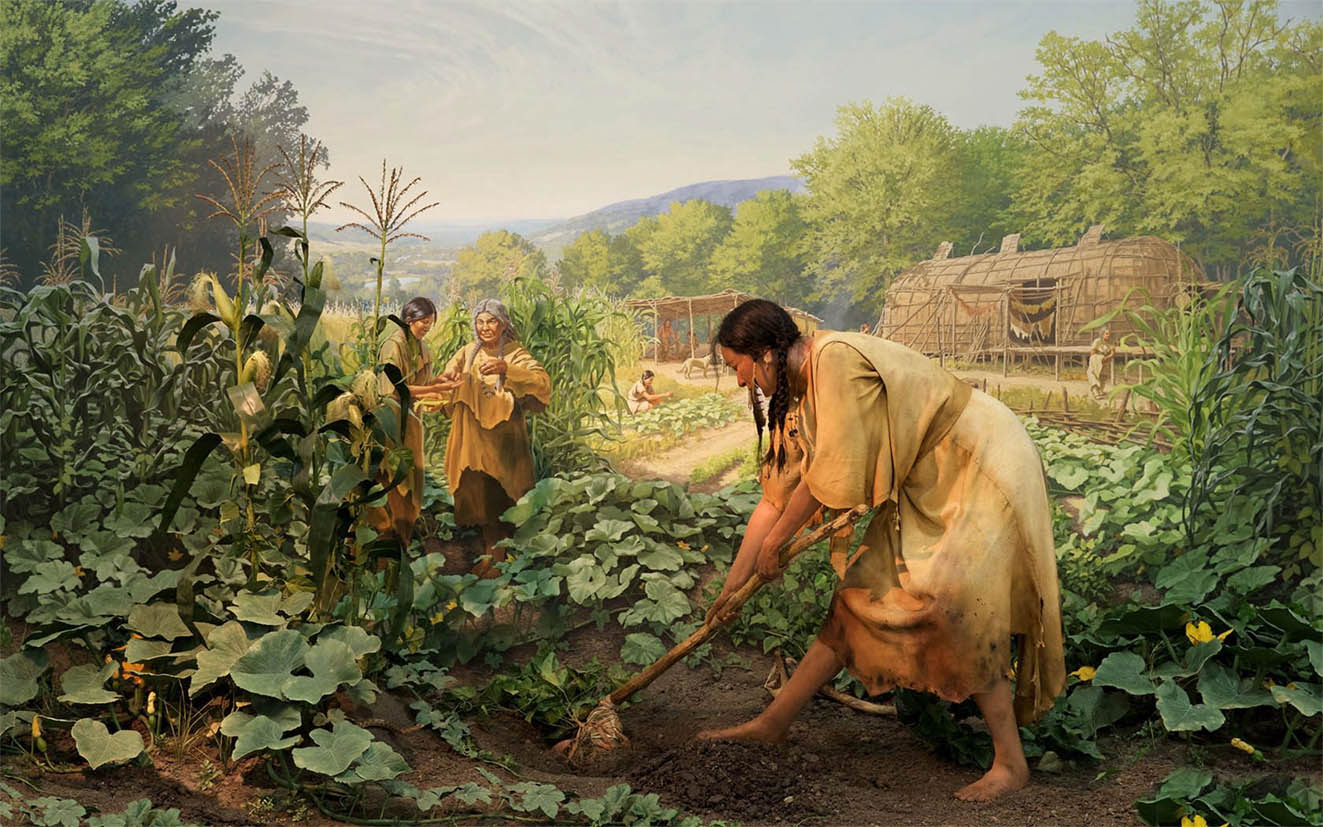
With hominids did bipedality, calorie consuming brains, dependency on tool technology, and complex verbal behavior arise. With language another new form under the sun of information, encoded not in genes but in memes, did flourish—know thee the sanctity of information.
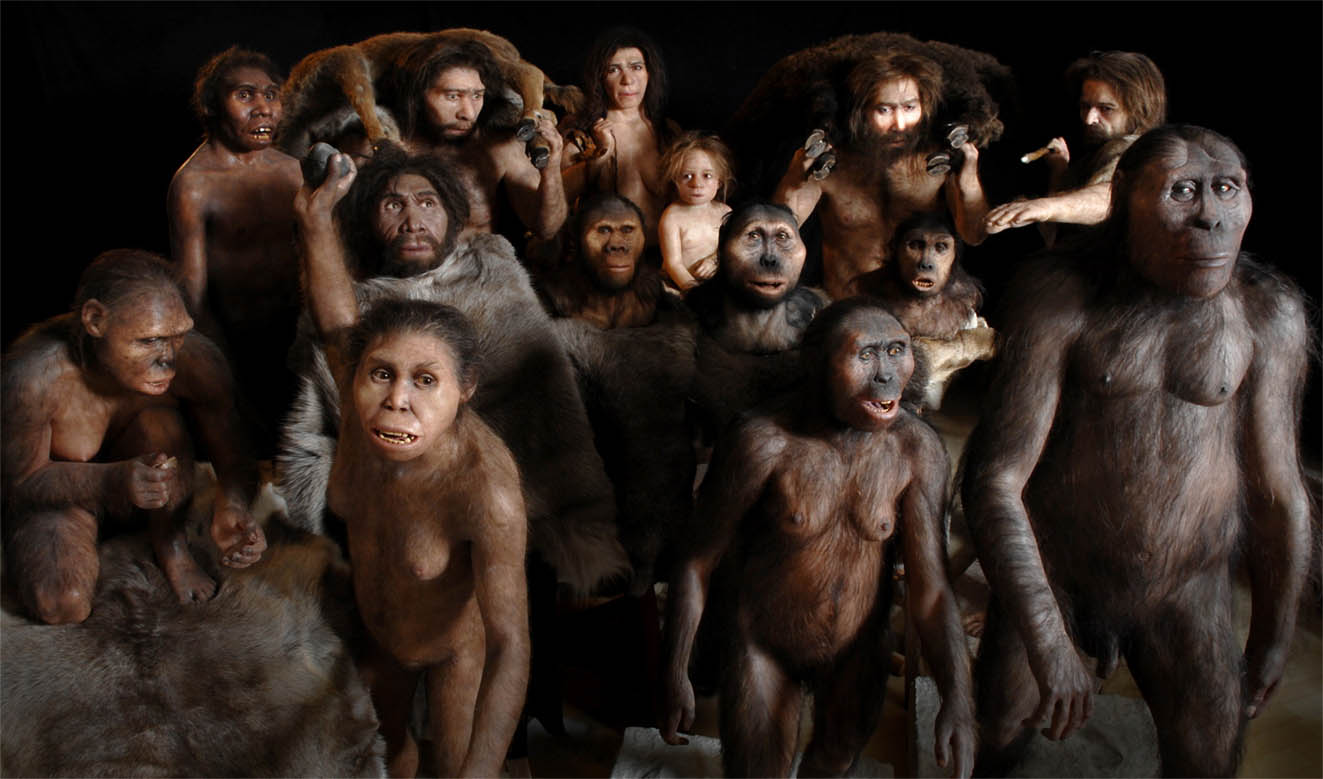
And Sahelanthropus (7 million years ago [Ma]) did stand upright—the begetter of Orrorin (6.1 to 5.7 Ma), Ardipithecus (5.6 to 4.4 Ma), Australopithecus (4 to 2 Ma), Kenyanthropus (3.5 to 3.2 Ma), and Paranthropus (2.7 Ma). And Australopithecus did beget A. prometheus, A. afarensis, A. africanus, A. deyiremeda A. anamensis, A. bahrelghazali, A. garhi, A. sediba, A. robustus, A. boisei as well as Homo sp. (2.4 to 3 Ma). And thus did Homo naledi (2.5 to 0.25 Ma), Homo habilis (2.3 to 1.4 Ma), H. ergaster (1.8 to 1.3 Ma), and H. erectus (1.8 to 0.143 Ma) come to be. And from Homo erectus came H. erectus yuanmouensis, H. e. lantianensis, H. e. nankinensis, H. e. pekinensis, H. e. palaeojavanicus, H. e. soloensis, H. e. tautavelensis, and H. e. georgicus.

Former Lords of Fire, Homo erectus.
Homo erectus, the maker of fire, did beget Homo gautengensis (1.9 to 0.6 Ma), Homo rudolfensis (1.9 Ma), Homo heidelbergensis (1.3 to 0.2 Ma), Homo antecessor (1.2 to 0.8 Ma), Homo denisova (1 to 0.04 Ma), Homo neanderthalensis (0.6 to 0.03 Ma), Homo cepranensis (0.5 to 0.35 Ma), Homo rhodesiensis (0.3 to 0.125 Ma), H. sapiens (0.3 to 0.03 Ma), and H. floresiensis (0.7 to 0.012 Ma).

'I was here.' Early graffiti.
Homo sapiens begat Homo sapiens idaltu (0.16 to 0.15 Ma) and Homo sapiens sapiens (0.18 to 0.06 Ma) who, by way of becoming the last hominid standing, spread forth as if fruitful, did multiply, and knew dominion over the beasts of the field. Behold, Homo sapiens sapiens neared extinction, then begat Homo s. sapiens var. narrator (0.06 Ma), the storytelling animal, who came to oversee the greatest mass extinction of life since the late Cretaceous.
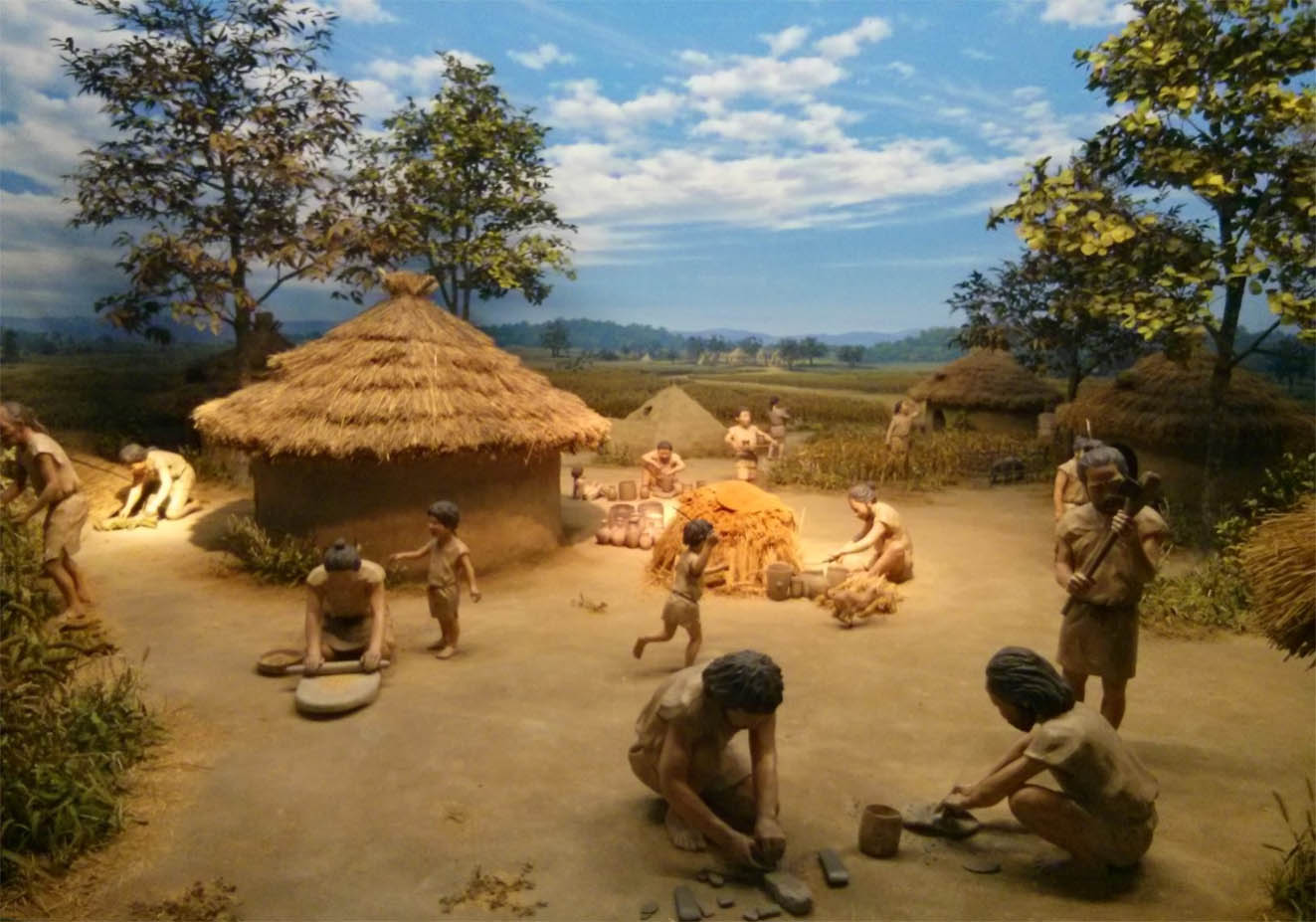
Imagined scene of early lords in a museum of latter-day lords.
Homo s. sapiens var. narrator, the memetic one, did value the non-childbearing elders who did help raise their children. The old ones, the over 30-year-olds, did ripened in knowledge and did teach the young through the stories they told resulting in a memetic cultural explosion from which the arts and agriculture did flow. Yet some knew not how to live, and error, ignorance, and illusion crept upon the face of the land: dominance hierarchies formed, chieftainships with warrior minions arose, some storytellers claimed to speak for the gods whom they had invented in their own image. And servitude was upon the land. The storytellers begat the priests who spoke in self-serving certitudes to enthrall the believers and together with the power mongers, they begat a time of empire-building.

First monument building, Göbekli Tepe, 9130–7370 BCE, over a 1,760 year period,
with priestly overseers, the first empire-builders.
The empires did rise and fall in power and wealth beyond the dreams of all but a few arose. The pre-Anthropocene story as told so far comes from The Book which also tells of things to come.

Collapse followed collapse until one corporate empire, empowered by ancient fuels, came to dominate the globe. The Growth Culture, so enamored by consumptive wealth, grew exponentially unto overshoot, until hard limits manifested in a perfect storm of biotic, material, environmental, and cultural collapse.

A latter-day monument, one of many—future ruins all; Kiev, Ukraine.
Empowered by fossil fuels, empire grew to global dominion for a time. During this pulse, Lord Man, in the privacy of his primate mind, declared himself (and his military-industrial complex) ruler of all.

Clear-cut deforestation looks about the same everywhere, but this example is in Indonesia.
Believing the self-deception that his kind was different in kind, and was therefore sovereign over the others, he taught his children that the Earth had been made for Lord Man's use and profit, that we live on a planet for the taking and it must be taken.
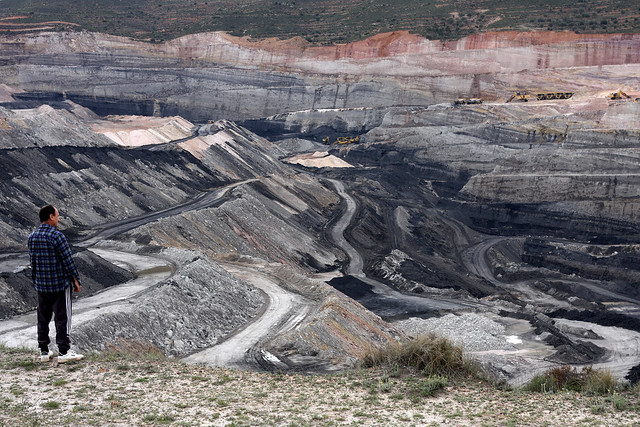
Open pit coal mine, Spain.
And taken.
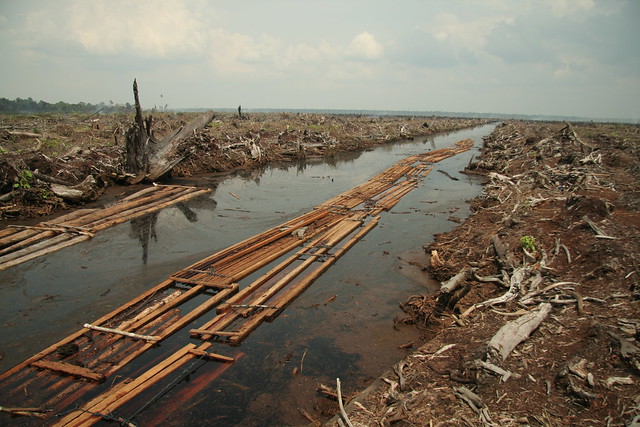
A recently removed forest to make way for another palm oil plantation, Indonesia.
And taken....

Transportation evolved. From the good old days before the wheel when everyone, not being carried by their slaves, walked—to today's teaming urbanscapes. There was a time when horses were the alternative to walking. They soon became regulated. Impromptu horse racing outside of bars became an issue. Horse racing was prohibited on Main Street. Horse lovers chafed at each restriction of their personal freedom.
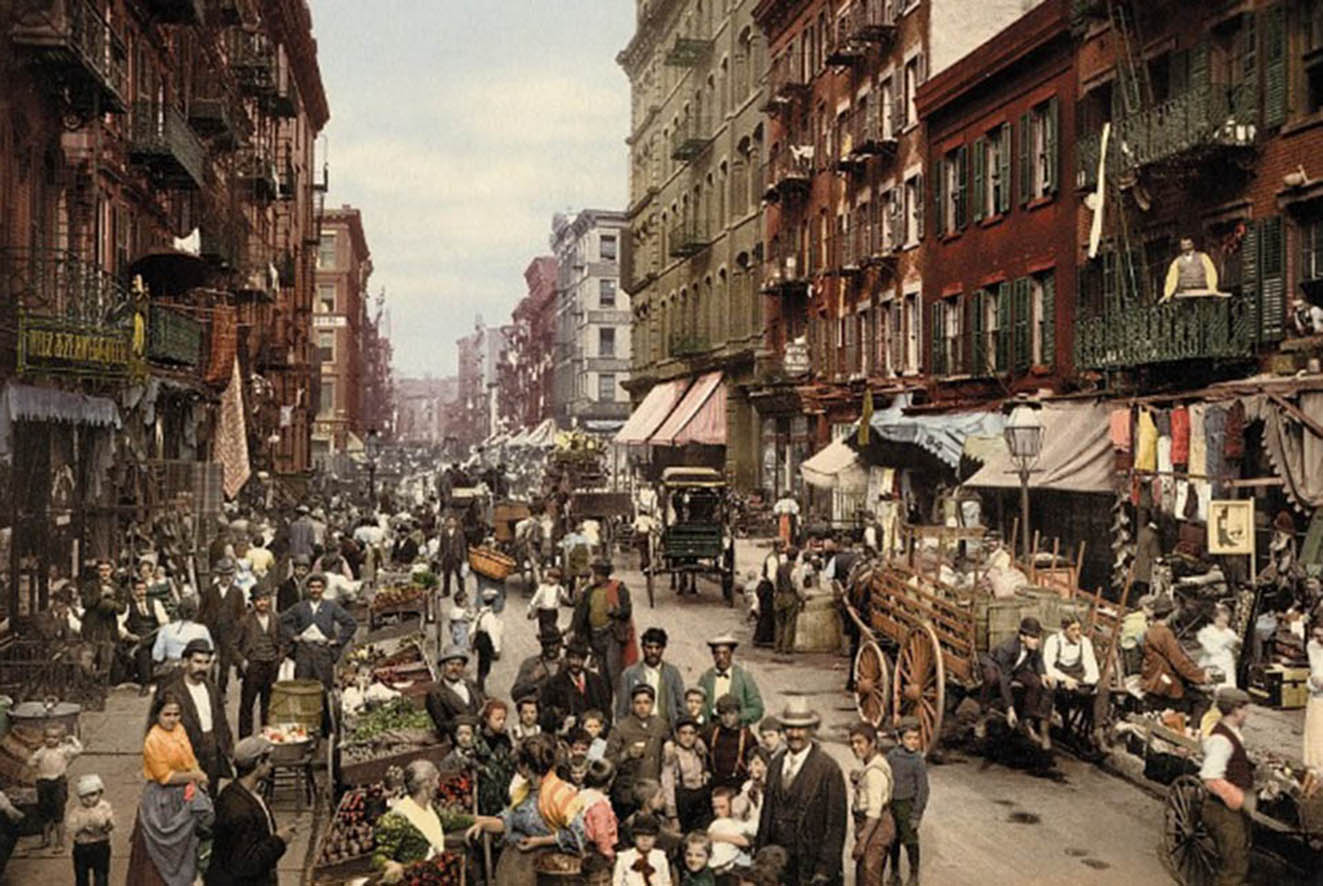
There were wagons and carriages drawn by horses, but the horses walked leisurely, and pedestrians, the many, could step from the raised sidewalks (used by ladies to stay out of the horse manure and mud after rains) at any time and any place. At the turn into the 20th century, pedestrians ruled the streets. Humans ruled, socialized, and the streets were the children's playground. But in 1921, in New York City alone, over a thousand children died by being hit by cars, on average three per day, and the public demanded speed controls be put on the monstrosities.

By 1925, cars killed two-thirds of those who happened to die from all causes in US cities with populations over 25,000. Motorists, the rich or wannabe rich, wrote letters to newspapers pleading that they were not the speed crazed, selfish, marauding murderers mowing down the innocents that the public knew them to be. The enraged public (as majority) were poised to strike the car endowed down. The motorists struck back by spending more—they used the media, their writers (public-relations fast guns for hire), and political pressure created by their lobbyists to make their case that the deaths and mayhem were the fault of pedestrians who stepped in front of them. A new offence was created that involved jays walking where they wanted to. Jays were hayseeds from the country, fresh off the turnip wagon, who didn't know enough to not "jaywalk" across streets. Sophisticated urbanites supposedly knew they should only use sidewalks and designated crosswalks. Jaywalking, the universal norm, soon became a crime.

By the early 1930's, cars ruled the urban landscape, but the death toll was merely moderated and normalized. Children all but disappeared from the streets, and walkers were few. The Car Culture ruled; all the Haves were assimilated by Lord Car.

Cod fishing off Maine; there was once vastly more, for a time.
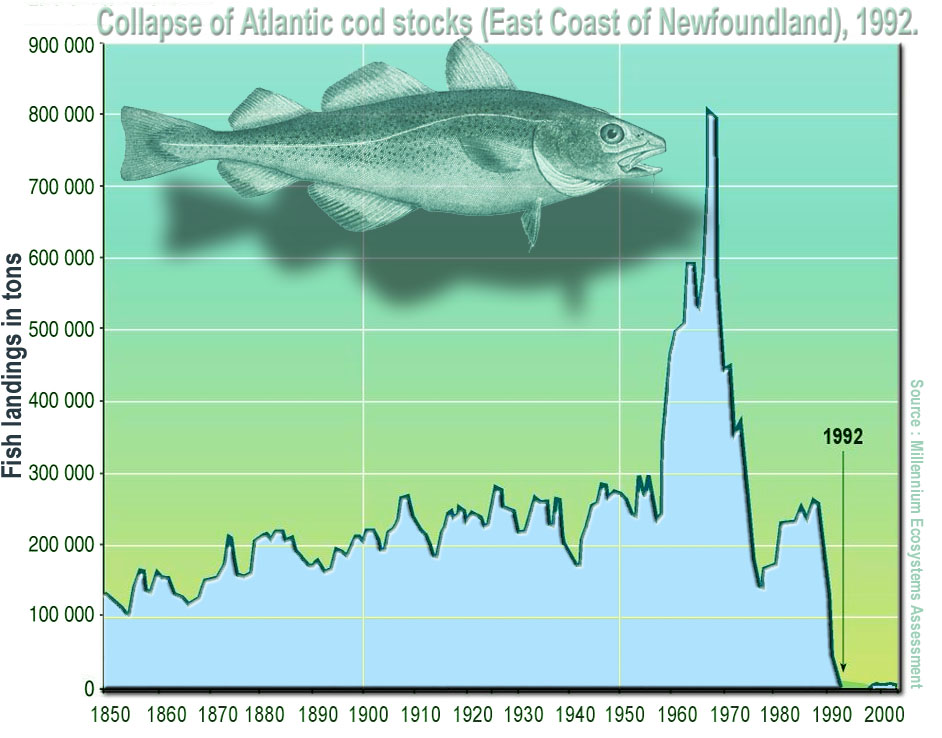
Lord Man recognized his neighbors in the community of life, the vast world, to be 'natural resources' for the taking, and all else to be externalities.

Removing overburden to get at the coal for the taking, Germany.
His work he named 'progress'.

A beautified girl in Ethiopia.
A global cosmetic products market was valued at USD 532 billion in 2017, and is expected to reach a market value of USD 805 billion by 2023. The easily oversold ones forgot how to beautify themselves and loved ones because no one profited by doing so.

California oil field, 1941. There be oil, for a time.
Feigning himself Lord Man, he grew evermore clever. He learned to gather and burn fossil fuels a million millennia in the making, to grow empire for a time.

Another California oil field.
We'll never run out of oil. But when it takes a barrel of oil to get a barrel of oil (or 10 as the extended EROI is hard to figure), some other source of energy, perhaps humans running in wheels, will be needed.

Constructing more urban area, Dubai.
Praise was sung at the gates of the new God: Growth everlasting!
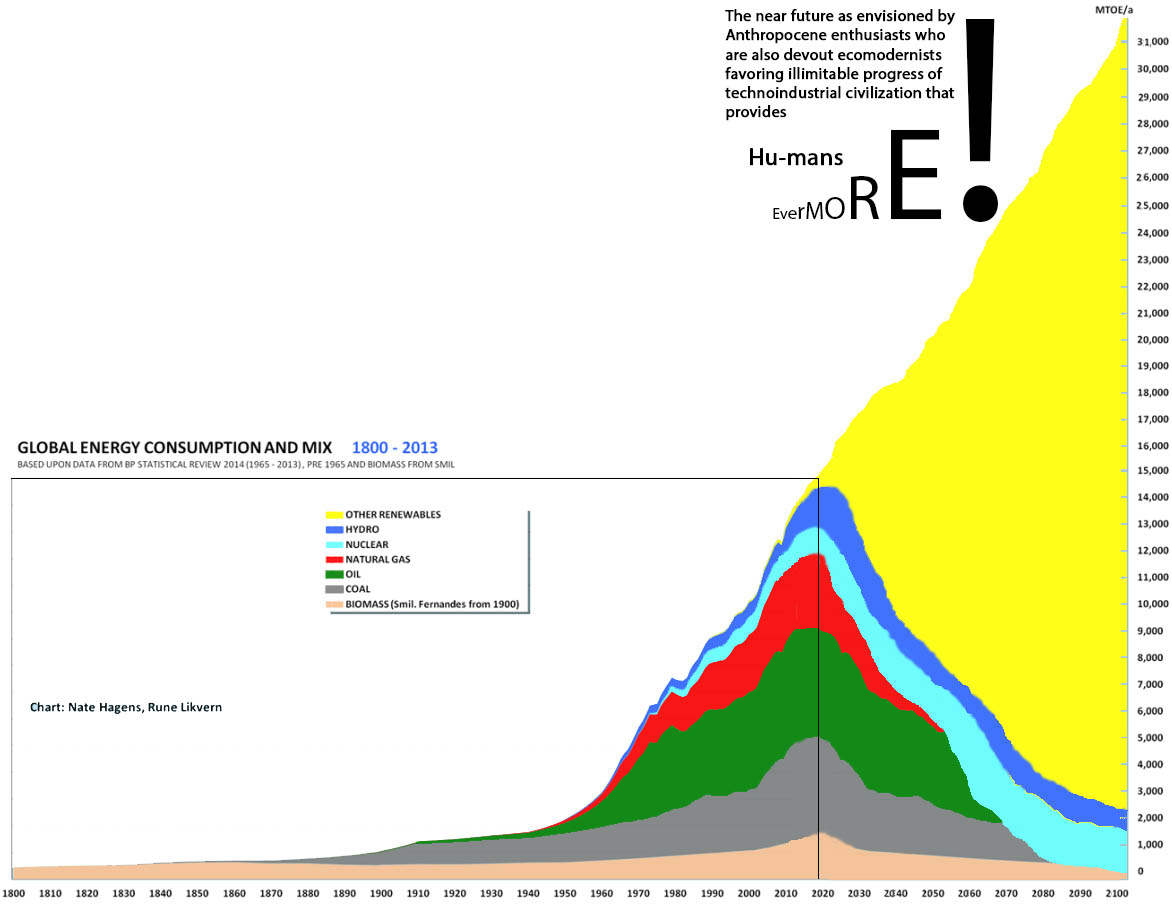
The graph up to the 2013 line is from Nate Hagens. The future is as imagined in our dreams.
Whose bread we eat his song we sing.
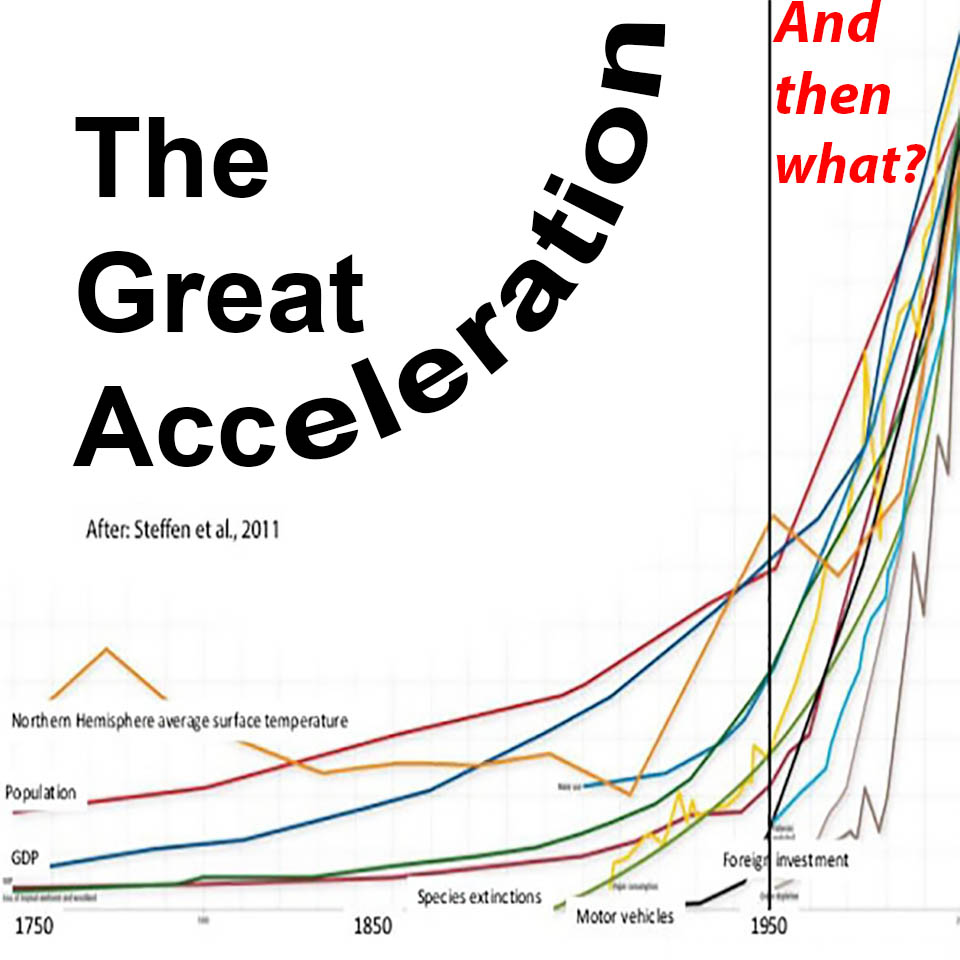
In Growth we trust. All believed in Growth's Mandate as all had once believed in God's Mandate, the divine right of elites, of Lord Man, because it was the same story in other words.
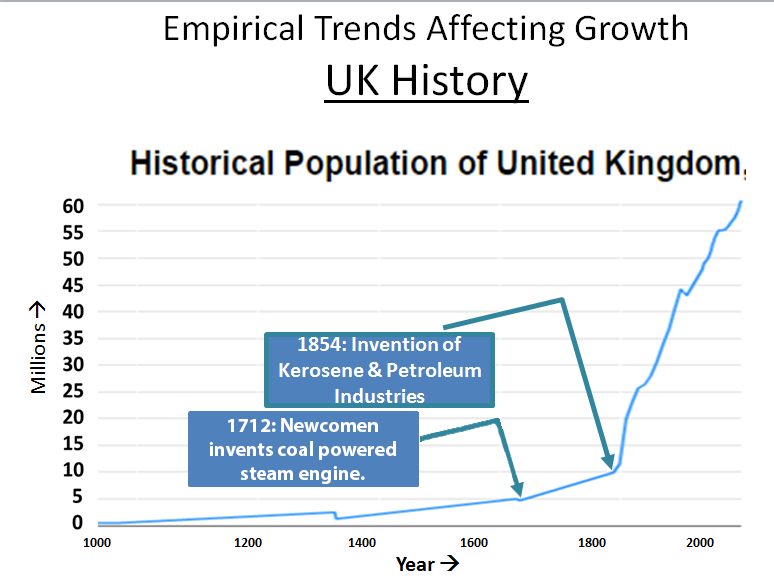
The glory of growth occurred in the UK first and the fossil-fueled monetary culture soon spread throughout Europe among Indo-European empire-builders and then to the Americas giving rise to an illusion of manifest destiny.
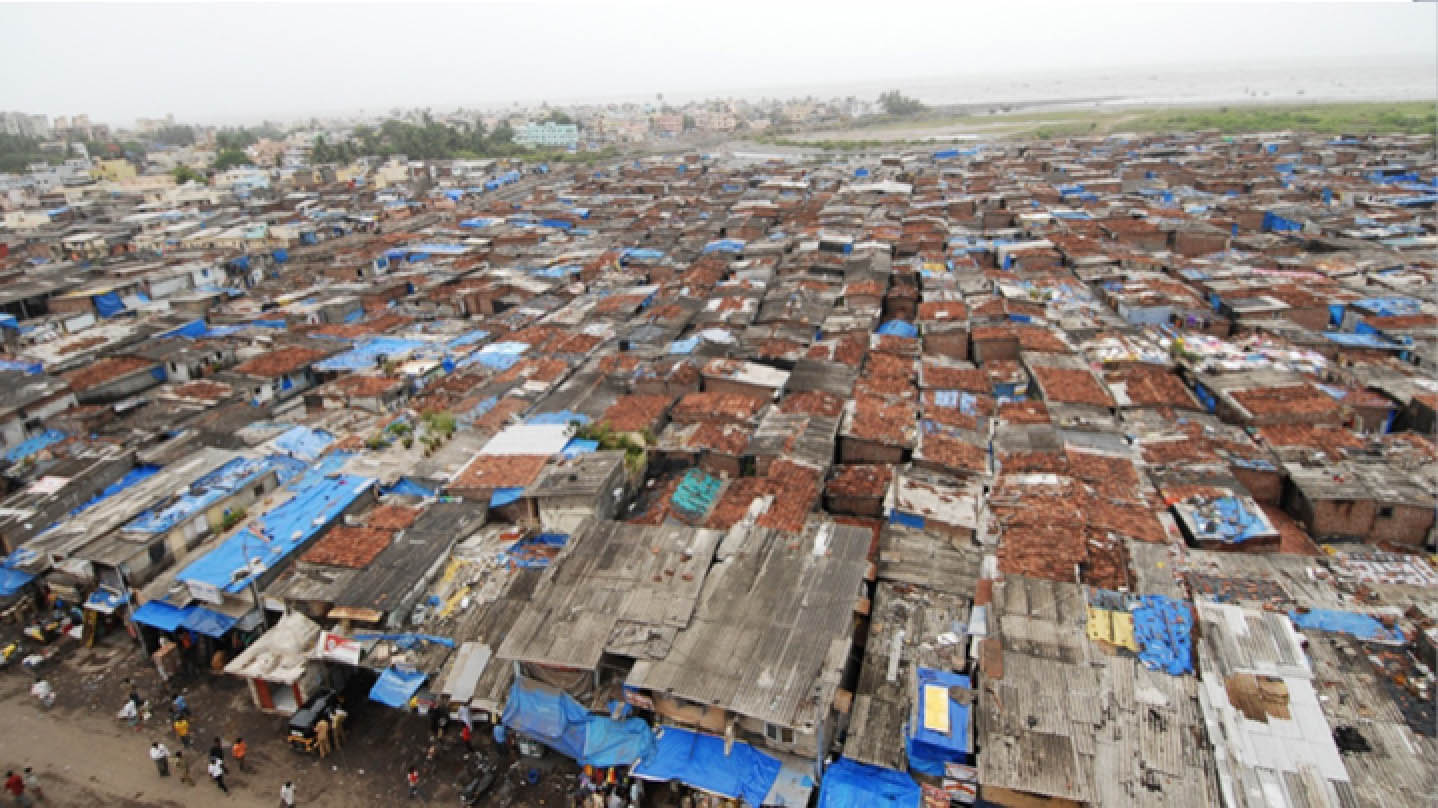
Bangladesh.
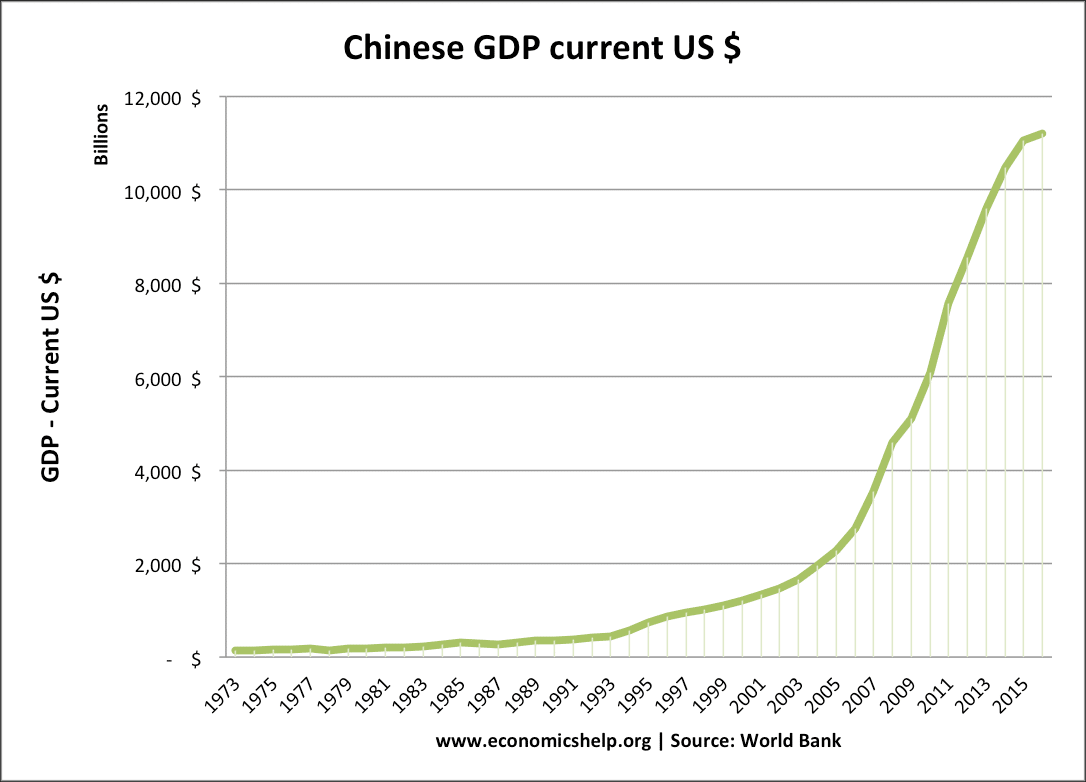
Growth came to China last, but climax and degrowth will come globally to all living in and depending on the unsustainable services of the Euro-Sino Empire whose song they sing. Lord Man will kneel as he has regionally (Past Lives of Humans) many times over the past ten thousand years of empire-building.

The teeming multitudes going to a Hindu holy festival.
Our numbers became legion. The extractive economy provided for those who worked to serve the new god. If a month's work provided a pair of shoes, then praise be the corporatocracy. By Growth, if I work harder, next year I can buy some of my children's shoes, and someday I'll buy a bicycle to get to work faster. As long as those who make $1/day can hope to someday make $2/day, then our services to the Growth Hegemon will be forever offered.

Sometimes it takes religion. Hubris man at outdoor mass, Brazil.
As the multitudes spread across the face of the Earth, the songs of the other creatures and cultures grew fewer and fainter. Few followers of the old false God noticed so long as there be money to acquire goods and services.

War ships under command and control of a nation-state,
one of the more extractive ones, and it doesn't matter which.
All humans need protection from other humans and sometimes from the environment, so the warfare never ends until the sun finally sets on the Empire of Lord Man.

Mother pig and coal powered plant, Macedonia.
Every day the Earth grew poorer—transformed bit by bit by Lord Man's numbers and actions. By our works, ye Mighty, the world was made safe for commerce.

Hawaiian monk seal on Kure Atoll caught in plastic net debris.
The seas were emptied of fish and filled with garbage.

Industrial forestry, in a National Forest, Oregon, USA.
The trees were replaced by rotting stumps.

Crop circles, Texas, USA.
The prairies were transformed into feeding factories for the ever-expanding human masses.

Coal-burning power plant, UK.
Smokestacks darkened the skies.

Megacity sprawl, Shanghai, China.
No place was sacred, no landscape safe from our thirst for more energy to serve our beloved God of Growth. By turning fossil fuel into food, over seven billion came to do what they had to do.

Cooling towers for nuclear power plant, Scotland.
Lord Man dammed rivers, made wind generators, solar PV, split atoms by using fossil fuels, and thereby had carnal knowledge of Mother, and it felt good, but only for a time.
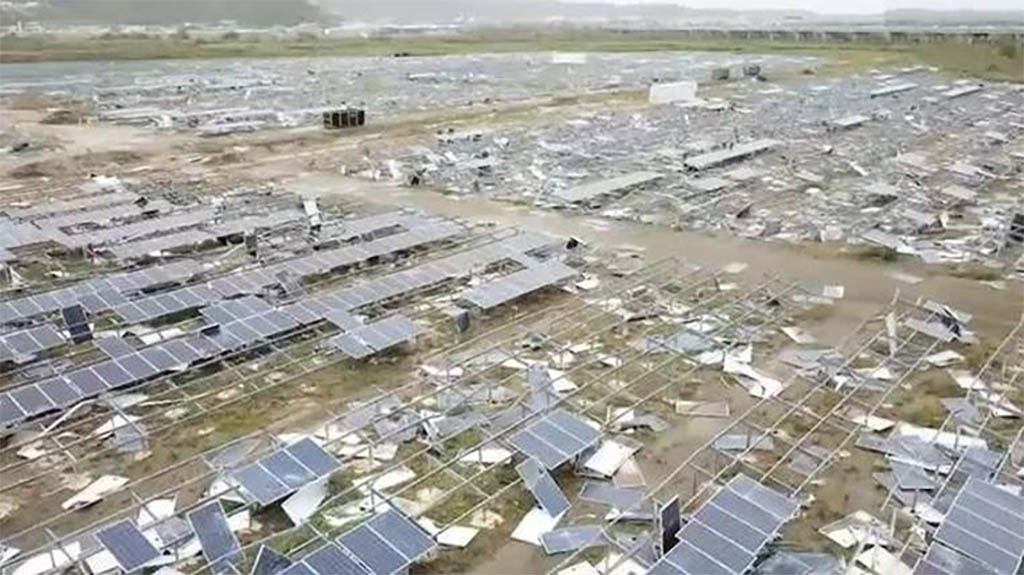
Solar PV doesn't make solar PV nor recycle waste; the future of solar PV is..., Puerto Rico.

Stripmining coal in Germany.
Empowered by ancient sunlight, we could excavate mountains, and stab the Earth everywhere a vein of fuel or minerals lay hidden. No one voted for the reckoning to come, all clamored for delay except for a few who thought degrowth would be a good thing even during the degrowing, the coming descent.

Supercell over Nebraska, USA.
The Earth will be here when we are gone,

Polar bear in Arctic.
Lord Man knew of no limits to his unsustainable denial, denying unto his last breath that he was or could be in denial. As Mark Twain is often attributed with saying, de Nile ain't just a river in Egypt.

Vulture and child, Sudan. 'Nature is unkind.' —Laozi
Lord Man has seen famine ravage the land many times since the beginnings of empire-building, yet the enthusiasm of those who do not starve unto death has always been rekindled like last night's campfire when new fuel is found.

Communal well, India. Water is shared with pets.
When he saw precious sources of freshwater disappear, he imagined that he chose to move on.

Them bones, them bones, them dry bison bones
When the abundance of bones, leftovers of prior harvest, the economy paid some to gather them to be sold, ground into fertilizer.

Tuna for sale, Tokyo.
Seeing the effects of his hubris, some began to wonder if his empire was secure and Schools of Sustainability grew in universities at an exponential rate (for a time).

Shipping containers go overboard.
His delusion weakened just enough to reveal the choice before him;

Birds and lake, California.
Two paths, one leading to an abundant Earth where some birds sing;

Rich and not as rich industrialized humans, São Paulo, Brazil.
Which is happier and more functional has not been determined.
And the other path—the way of Growth, is the way that works for a time to grow the economy so the rich on both sides of the wall get richer. Those living on the left side of the wall are better off than those in the countryside they left behind. Those who make $1/day hope to make more next year, and those who make $10/day or $1K/day hope to make more next year. What part of this dynamic do we not understand? Who, other than political/religious true believers, is so delusional as to imagine they are not part of it? When growth transitions into degrowth, scarcity will arise, consumption (of both wants and needs) will decline. Conflict increases scarcity, which increases conflict leading to a downward spiral, a fight to see who inherits the rubble. Any sane human on either side of the wall should consider voting with their feet.
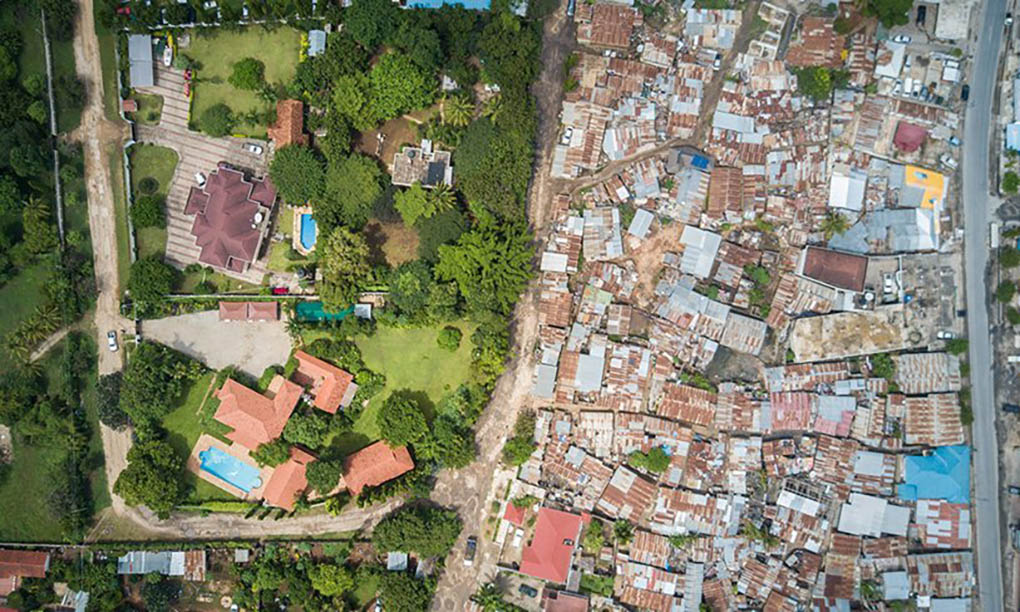
The rich (two families on left) and the many not as rich on right whose lifestyles the rural
'poor'
(subsistence farmers who rarely buy food and may make $1/day) hope to enjoy someday
[in Tanzania, a presidential democratic republic, multi-party system with an independent Judiciary].
Understanding the Great Divide
The image above comes from an article, Inequality, Poverty, and Injustice, and the following lengthy comments were occasioned by considering a possible error in interpretation:
'Most of us have played the popular game Monopoly, where players compete to gain control of all the money and property. Each player starts with the same amount of money from which to buy property and build homes or hotels. Players move around a game board by a roll of the dice. Thus, there is an element of skill (players must choose when to buy or trade property, when to build houses or hotels) and an element of chance (the roll of the dice). The game ends when one player has successfully ‘monopolized’ (owns) all the money and property.
In the game of Monopoly the playing field is equal, every player starts the game with the same amount of money. Every player has the same opportunity to roll the dice and advance (unless they go to jail). Every player follows the same set of rules. Imagine instead if one person started the game with a hundred times more money than the other players?...'
When we see 'the great divide', such disparity in wealth, most humans think immediately of sinful and immoral personal characteristics such as greed, avarice, selfishness, or insensitivity to the plight of others. We want to remove the privilege from the wealthy and boost the privilege of those disenfranchised from power and wealth. We want to lay blame and punish malefactors. These are 'good' moral judgments – 'good' motives, or were among our hunter-gatherer ancestors.
Is the solution to unrig the game such that everyone has a fair and equitable start? Otherwise people might not want to play the game with enthusiasm. If perfect justice and equality were achieved for all 18-year-olds, if everyone enjoyed playing the game of growth and exploitation for its own sake, of pursuing short-term self interest, then surely we would be living in the best of all possible worlds.
But what if 'the game' we are all playing and have been since empire-building started 6-11K years ago, is rigged as are other games, such as Monopoly and chess. There is one winner, and then it is GAME OVER for them too. In the game of life, for a species, GAME OVER means extinction. What if the only way to win the dissipative structure game is to not play it?
In the small world that we used to inhabit not 100 years ago, taking action on such morally responsible thoughts did not occur to prevent the BAU world we live in. Would ethically motivated actions have saved humanity from today's predicament? And, what is the best response now? What would have been the best response 100 years ago? Things have changed rapidly, and are still changing rapidly. Do we have the sapience now that we did not have 100 years ago? Has 100 years of history sharpened our wits? We need to better understand what is happening! Perhaps we can find some wisdom in the examination of a board game.
But, let’s start at the beginning. Good or bad? From what point of view? The point of view of the wealthy, of the poor, of posterity living 100 years later, or of Nature? Is Nature the forgotten player in this panorama? What morally acceptable solution would leave more room for Nature and also give us more equality?
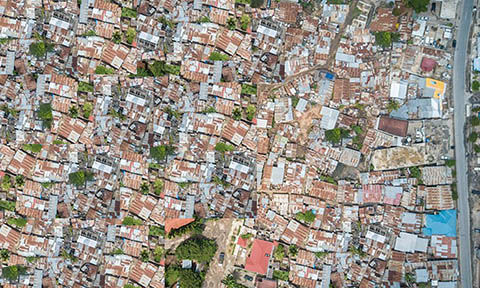 Let’s try to think of equality from the point of view of a systems scientist. If per capita consumption had been virtually and consistently equal across the entire population (0.8-1.2 range, 1=enough), the entire picture might look more like the right side with maybe a few more trees and slightly bigger backyards. The population could and likely would have grown faster (doubling per capita prosperity of those on the right would likely lower death rate) assuming economic growth and production was the same.
Let’s try to think of equality from the point of view of a systems scientist. If per capita consumption had been virtually and consistently equal across the entire population (0.8-1.2 range, 1=enough), the entire picture might look more like the right side with maybe a few more trees and slightly bigger backyards. The population could and likely would have grown faster (doubling per capita prosperity of those on the right would likely lower death rate) assuming economic growth and production was the same.
Eventually the land would fill up, and we are back to subsistence living in an unsustainable situation. So, equality of access to wealth would not offer much hope for the long term. It would not be enough of a change to BAU to be sustainable.
Assume one person on left for every hundred on right and each person on left earns $1K/day in income. They consume a hundred times more stuff/energy (other than food and other self-limited consumption, e.g. hair-dryers per person) than those on the right (earning $10/day in income). Eliminate all those on the left and redistribute their stuff/income. Those on the right could double their consumption, but only for a time as the SYSTEM (socio-economic control system) would collapse sooner. Increased consumption and reduced production from the lack of services provided by the elites would cause the economic/socio-political system to fail sooner. And then what?
If those on the right could buy more cars, TVs, washing machines—doubling their energy use, then what? Under the current system, while the economy is growing, both sides can get richer, so there can be co-existence and persistence, for a time, of a global growth system that is not remotely sustainable (that the In-Growth-We-Trust SYSTEM will continue long-term is belief-based).
Let's work harder for prosperity for all.... Oh, wait, that is what they did 100 years ago and what we are still trying to do. With scarcity induced conflict and breakdown of social control and service subsystems, those on the right could kill those on the left, loot their stuff, cut the trees for cooking fuel and ultimately collapse the economy they depend on. And then what?
For a 'sustainable' community, envision a human biology friendly village size of perhaps 20-50 forager-gardeners living prosperously on local environmental resources provided by an area much larger (maybe 100 ha per forager-gardener) than pictured (about 16 ha or 40 acres shown), and only after depopulation and environmental restoration. Per capita consumption of industrial products would be much less or even zero. At least two things are needed to make this eudaimonic vision sustainable. There must be room for Nature and there must be a limit on the number of people that is inversely related to per capita consumption.
Lord Man becomes our future's past. All would spend most of their day having face-time with loved ones they trusted with their lives while working together, perhaps four hours a day, to support their lifestyles free from the very long list of pathologies associated with modern 'civilization', These would include acne, Alzheimer's, arthritis, atherosclerosis, asthma, some cancers (e.g. lung, breast, and colorectal cancer), carpal-tunnel syndrome, chronic liver disease/cirrhosis, chronic obstructive pulmonary disease, colitis, irritable bowel syndrome, malnutrition, obesity, type 2 diabetes, heart disease, hypertension, metabolic syndrome, chronic kidney failure, osteoporosis, PCOD, diverticulitis, gallstones, rickets, dental caries, stroke, depression, OCD, suicide, chronic stress, addiction/anxiety/bipolar/personality/psychotic/eating disorders, substance abuse, ideology, and vascular dementia.
 But, how can we establish this eutopian goal, when we have failed time and again in the past? We must understand why we have failed. There may be some hints in a common board game. In the board game of Monopoly everyone starts out in a state of perfect equality and the rules apply to each with perfect fairness and justice for all. No one starts with more money nor can anyone print Get Out of Jail Free cards at will.
But, how can we establish this eutopian goal, when we have failed time and again in the past? We must understand why we have failed. There may be some hints in a common board game. In the board game of Monopoly everyone starts out in a state of perfect equality and the rules apply to each with perfect fairness and justice for all. No one starts with more money nor can anyone print Get Out of Jail Free cards at will.
Nevertheless, the game is rigged. It really does not matter who owns what at any given time. It is the rules of the game that select for the inevitable outcome: Eventually one player gets it all and then GAME OVER, including for the 'winner'. We are playing (badly) a game on a global board – a game for which the rules are rigged (no smoke filled room implied). If the ultimate outcome is not what we intend, then we must stop playing the game.
The current national and global systems define the 'rules of the game' and working tirelessly for more equality and justice is a distraction – a morally necessary but ultimately a futile distraction. The political, religious, and industrial subsystems: the media, the military, the legal, and the educational subsystems—the whole shebang—is based on the contingencies of short-term self interest. They are instrumental institutions that embody the rules—they are the SYSTEM that selects for its own endgame and determines our inability to win it. Voting for or against some policy, or tweaking policies to the Right or Left, is merely like players in the game rolling the dice, hoping for luck, but selecting for the as-usual raise and fall outcome.
In the game of global Monopoly, the only way to win, as with Russian roulette, is to not play the game. We are all players who strut our stuff for a time, but who cannot foundationally change the rules of the game. Our only alternative is to not play the game, to vote with our feet and consider playing a different game that selects for a different outcome. The question that we desperately need to figure out is this: What rules will lead to a sustainable and functional society? Can some small fraction of humans self-select out of the BAU game and come to play a potentially sustainable game?
Or we fail. A sustainable outcome that is dysfunctional, as Orwell envisioned, is achievable by 2184 (or maybe 2984). But do we really want to 'win' the BAU game if doing so involves becoming Borg?
We are all products of and serve Hubbert's 'monetary culture' within which his 'matter-energy system worldview' is an externality valued 'for the milk and cheese and profit it brings'. Changing horses (e.g. from race horse to plow horse) is an option. An 'ecolate' culture, a matter-energy system culture, would select for a different, better or worse, outcome.
The prosperity of a village would depend on a system of global governance that defines limits to 'development' and prevents a slightly larger community from conquering a neighboring one to set in motion the remorseless dynamic leading to Lord Man. The global governance would provide information services, apart from protection from conquest, so any villager who wants (because able) to be literate, numerate, and ecolate could be.
All Gaians living on the pale blue dot, having stood down from their hubris heights, would live such functional lives as possible in a naturocracy (rule by the nature of things) as the millennia pass. Or Nature, being unkind, allows for failure. And so extinction could be our GAME OVER if almost all of us keep on keeping on (and too few vote with their feet).
Oh, and 'the great divide'? There isn't one. The $1/day humans want to make $2/day and if you are making a thousand a day, think of all the good you could do if you made two thousand. Enthusiasm varies. As I understand more of the dynamics of the Anthropocene, my enthusiasm for serving it dims, but there are no differences in kind between ultra elites and slum dwellers.
My older brother was a more enthusiastic capitalist than I, and won more games of Monopoly. I've been to Las Vegas several times, but as an anthropological observer who understands how the game works, I didn't play. Having read most of the works of B.F. Skinner, I've never played the game. As Spinoza observed, to understand something is to be delivered from it. Understand the implications of this and you have the basis for changing the rules of the game.
We are storytelling animals. Tell different stories such as the nature of things compels you to. Different outcomes will be selected for.
Or, to sum up my life's work: Listen to Nature. Tell better stories. Live long and prosper within limits, and stand down to minimize our hu-man error, ignorance, and illusion.

The sun sets on a Lord Man, Utah, USA.
We are captured and being dragged along by a complex, powerful and remorseless dynamic that automatically thwarts all attempts to stop it.

Detritus of the oil age, Azerbaijan.
We are the pathology. If we don’t put time and energy into understanding it, we are doomed to go with it, right to the final curtain.
'There is one leverage point that is even higher than changing a paradigm. That is to keep oneself unattached in the arena of paradigms, to stay flexible, to realize that no paradigm [belief system, ideology] is 'true,' that everyone, including those that sweetly sing your own worldview, has a tremendously limited understanding of an immense and amazing universe that is far beyond human comprehension. It is to 'get' at a gut-level the paradigm that there are paradigms [that are not 'true'], and to see that that itself is a paradigm, and to regard that whole realization as devastatingly funny. It is to let go into not-knowing, into what the Buddhists call enlightenment.
It is in this space of mastery over paradigms that humans throw off addictions [their purpose-driven Calhoun-rat consumer life], live in constant joy [when not dealing with life debilitating situations], bring down empires [so what are you waiting for?], get locked up, or burned at the stake or crucified or shot, and have impacts that last for millennia.
There is so much that could be said to qualify this list [see chapter six] of places to intervene in a system. It is a tentative list and its order is slithery. There are exceptions to every item that can move it up or down the order of leverage. Having had the list percolating in my subconscious for years has not transformed me into a Superwoman. The higher the leverage point, the more the system will resist changing it—that's why societies often rub out truly enlightened beings.
Magical leverage points are not easily accessible, even if we know where they are and which direction to push on them. There are no cheap tickets to mastery. You have to work hard at it, whether that means rigorously analyzing a system or rigorously casting off your own paradigms and throwing yourself into the humility of Not Knowing. In the end, it seems that mastery has less to do with pushing leverage points than it does with strategically, profoundly, madly, letting go and dancing with the system.'
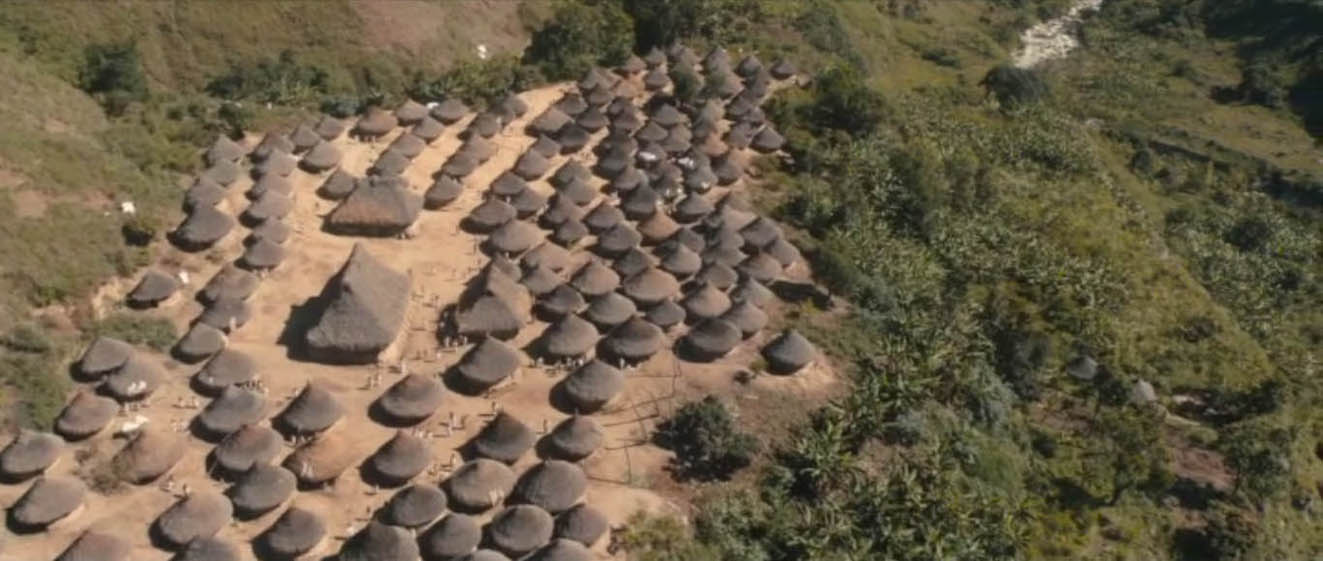
Kogi city as it is and much as it has been for 1,100 years, but not used for continuous habitation.
But a teachable moment came and the Naturocracy Alliance had prepared information packages. A Kogi Study Project learned how humans could mold individual behavior into a plan of actions and avoidances that are oriented toward the maintenance of a viable equilibrium between Man’s demands and Nature’s resources. Some survivors learned to tell new and better stories—the most likely stories that reason and evidence allowed. By managing the population of pets, livestock, crops, and humans such that one fifth of one's watershed management unit provided an optimal and equitable level of per capita consumption, such that all live the prosperous life of enough, hu-mans of NIMH became human again.
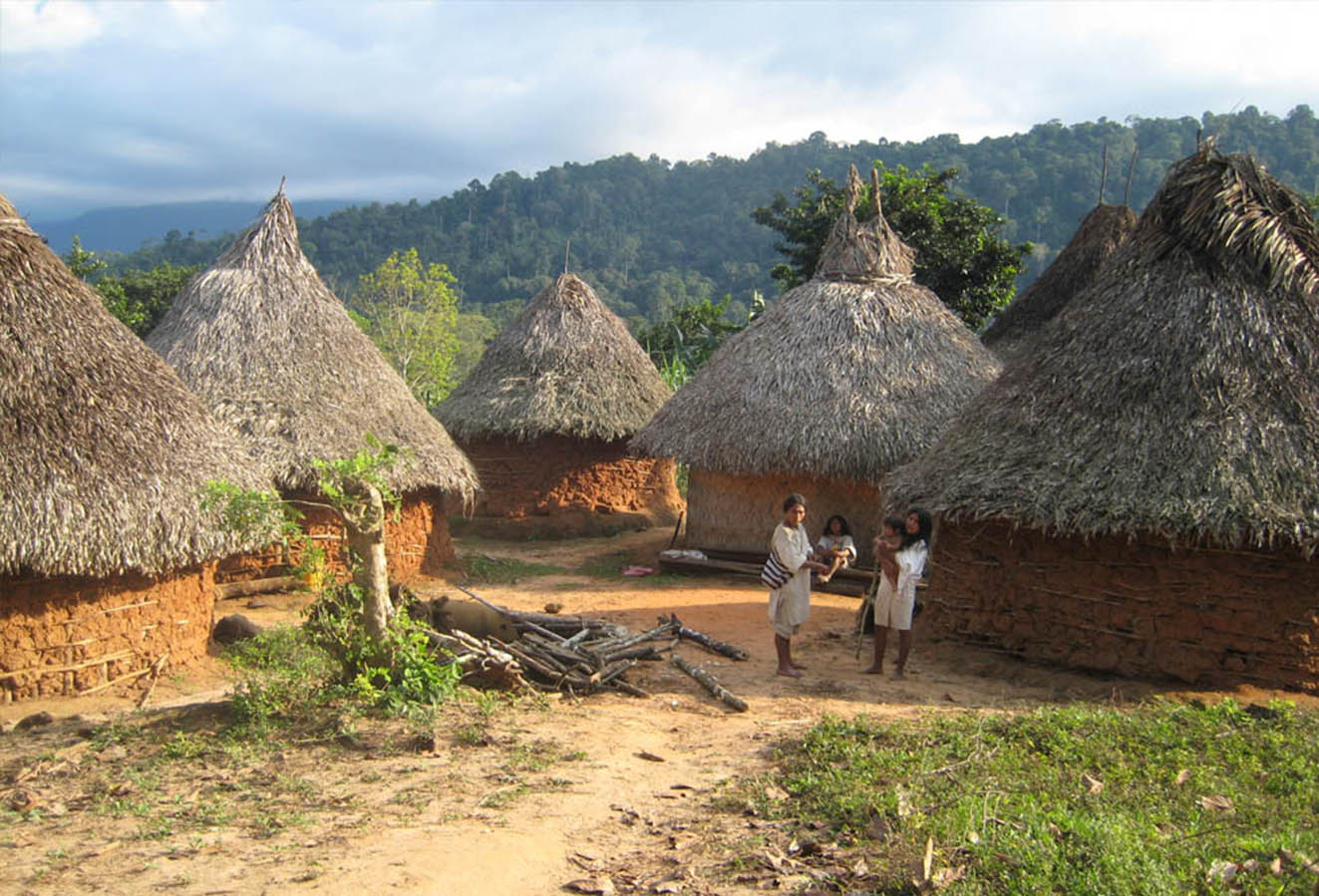
They lived by such better stories as they heard by listening to Nature, and to all who would endeavor to listen, to become benefactors of all the species that had survived. Great was their joy and beautiful their lives. Homo s. sapiens var. narrator, those living about sustainable (for maybe 400 years) hydroelectric dams, begat the by-design Inquiring Ones who went back to the star stuff from which they came and knew the place for the first time.
Lord Man at his most luminous (click image), Hong Kong aglow at night (for a time).
To Be Fruitful and Multiply

As all organisms know, growth is good, until it isn't.
'With a present human population that has surged past 7 billion and is growing fast, most people assume that rapid population growth is normal. It’s not. During almost all of human history, our numbers have been either stable or growing imperceptibly (less than 1/500th of 1 percent according to a leading demographer). Population growth ticked up significantly after the invention of agriculture, but the rate of increase was still only a small fraction of 1 percent. Then, round the start of the Industrial Revolution some two centuries ago, a convergence of factors set the stage for a demographic explosion. Most notably, humans began to exploit the vast fossil-energy storehouse laid down by ancient geological forces—coal, oil, and natural gas. The modern era’s exploitation of this energy windfall has coincided with a suite of rapid advances in agricultural productivity, science, and medicine that have lowered death rates and increased life spans, leading to ballooning human populations around the globe.' —Authors

Making babies is to die for.
'Neither prosperity nor a just and egalitarian social order can by themselves cause the number of children per couple to go down to two. They are only favorable conditions. For the actual task of limiting the number of children to two, the couples must consciously do something—either on their own initiative or urged by the society.' —Saral Sarkar

Arranged marriages are for true believers and child brides. Note that there is only one happy face.
'Child marriage happens because adults believe they have the right to impose marriage upon a child. This denies children, particularly girls, their dignity and the opportunity to make choices that are central to their lives, such as when and whom to marry or when to have children. Choices define us and allow us to realize our potential. Child marriage robs girls of this chance.' —Archbishop Desmond Tutu and Graça Mahel

Cheaper by the dozens. Mass wedding, South Korea.
We are all captured and drugged along by complex, powerful and remorseless dynamics that automatically thwart all attempts to stop them. Reading Cosmopolitan or Hustler or social media merely creates a different dynamic. Listening to Nature is alternative.

Supporters of Ethiopia Prime Minister attend a rally in Addis Ababa, Ethiopia
'Of all the fantasies indulged in by a society speeding toward self-destruction, none is as consequential as the idea that continuing growth—both in size of population and size of economy—has a happy-ever-after ending.' —Craig Durian

Members of a polygamous family. No grandchildren yet.
'The command “Be fruitful and multiply” was promulgated, according to our authorities, when the population of the world consisted of two people.' —William Ralph Inge
The Human Tide

A day on the beach, Brazil.
I once spent a different day on the beach that was more sparsely populated. But more stories and pictures were formed on the day above, and more people enjoyed more things, kind of like fish in a boat bottom moistening one another with their slime.
'It is through the sheer mass of society, not simply from malevolence, that the rising human tide has become deadly to the rest of life. The collective weight of a bloated humanity has dire ecological and social consequences. Every pressing problem, from poverty and malnutrition to biodiversity loss and climate change, is linked to human numbers and behavior. In aggregate, the prosaic actions of people—eating, manufacturing, polluting, shopping, warring—made our species the functional equivalent of a geological force, able to affect even the global life support systems and climate in which our species evolved.' —Authors

A massing of the masses, 'Love Parade', Germany. The event was permanently canceled in 2010 after 21 deaths by dancing.
'One of the greatest challenges today is the population explosion. Unless we are able to tackle this issue effectively we will be confronted with the problem of the natural resources being inadequate for all the human beings on this earth…. The only choice—limited number...happy life...meaningful life. Too many...miserable lives and always bullying one another, exploiting one another.' —His Holiness the Dalai Lama

Sometimes it takes politics. Celebrating Kim Jong-il, North Korea.
'The chief cause for the impending collapse of the world—the cause sufficient in and by itself—is the enormous growth of the human population: the human flood.' —Pentti Linkola
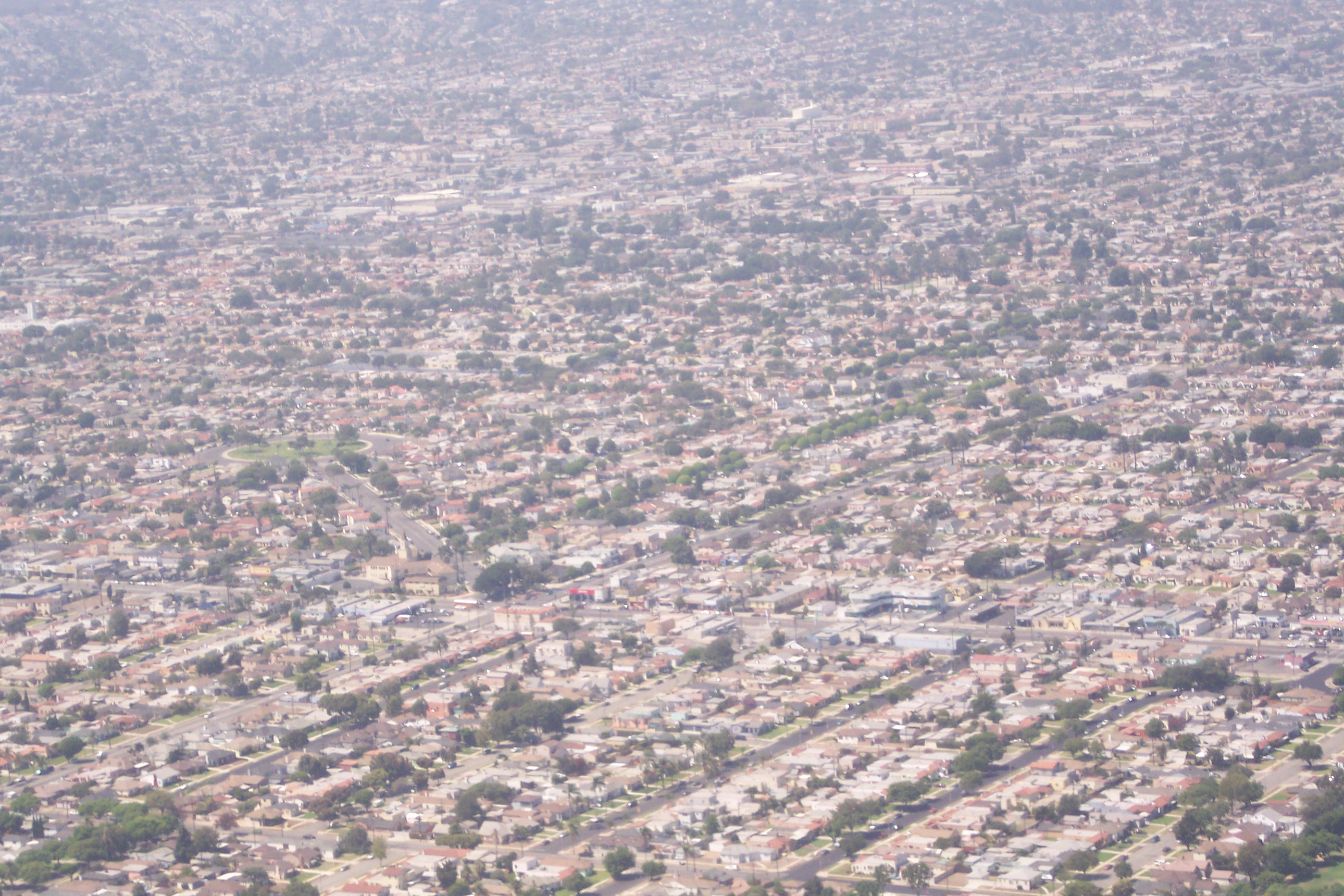
Urban/suburban sprawl, Los Angeles, California, USA as enabled by car culture.
'The worst mistake in modern civilization is allowing excess automobile horsepower.... That is, we run cars and build throughways instead of asking what is the most appropriate transportation to make an optimal fit of people and environment.' —H.T. Odum interview, 2001

Shrine goers, India.
Who wants to visit the Shrine today?
'The question of how many people the world can support is understandable in a finite sense. What do we want? Are there global limits, absolute limits beyond which we cannot go without catastrophe or overwhelming costs? There are, most certainly.' —George Woodwell

Rush hour, China. In 2009 there were more cars in China than in the USA. Progress is mine, sayest Lord Man.
Who's ready to go to the gym to ride a stationary bicycle?
'We have geared the machines and locked all together into interdependence; we have built the great cities; now there is no escape. We have gathered vast populations incapable of free survival, insulated from the strong earth, each person in himself helpless, on all dependent. The circle is closed, and the net is being hauled in. They hardly feel the cords drawing.' —Robinson Jeffers

New Delhi sprawl.
'Leave room for Nature, leave room for Nature.' If you look close, there are a few trees, so some room was left.
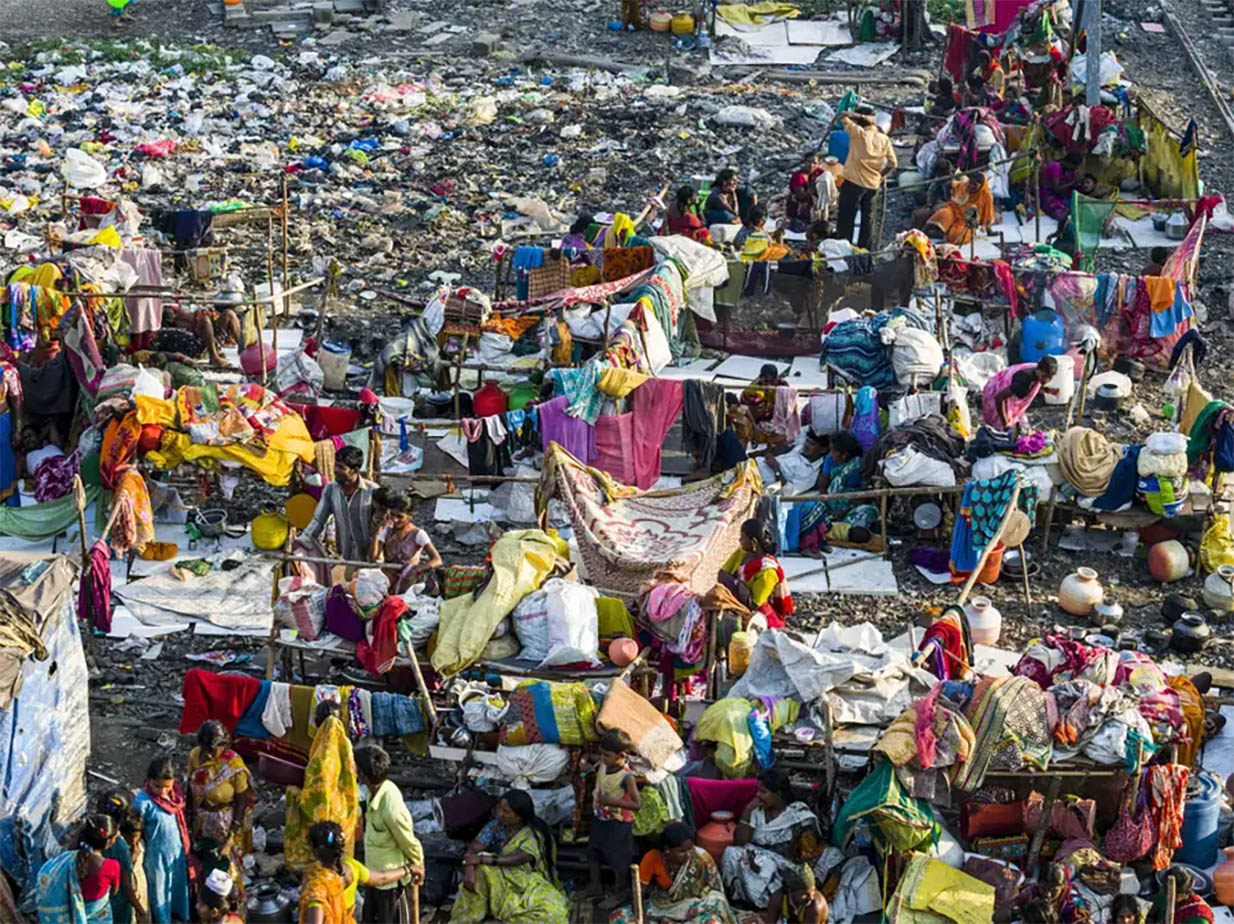
Dharavi Slum in Mumbai, the second-largest slum in Asia.
'Humans evolved in wild nature. Only relatively recently in our timeline Earth, roughly ten to twelve millennia ago, did we begin to domesticate other species—and ourselves. That first agricultural revolution set humanity on a trajectory of population growth and settlement-based land use. Increased social organization and the invention of cities went hand in hand to allow development of increasingly complex economic and political systems. In 2008, for the first time in history, the majority of humans on Earth lived in cities. We had become, at least superficially, urban animals.' —Authors

Urban life, Barcelona, Spain.
Over half of humans 'live' in urban areas.
- 'There is far more to any culture, especially to our MTI [modern techno-industrial] cultures, than its technosphere.
- A corollary is that if we who are MTI peoples and cultures cannot govern our technosphere, it is because we have failed to develop an adequate psychosphere.
- To date, no culture of any form of civilization (small group nomadic, regional agriculture-based or MTI) has developed the capacity (psychosphere + technosphere +…) to govern the form of civilization it exemplifies to the degree that it can consciously evolve into an exemplar of a truly new form of civilization.
- To date, as one would expect with MTI cultures, most of our attention, money and energy are focussed on technological “solutions/fixes.” We are largely ignoring the work to be done to develop a psychosphere that is capable of consciously governing the evolution of our whole culture, much less our MTI form of civilization. In short, understanding that we have developed a technosphere we cannot control is only one step of the journey of understanding the nature of the trouble we are in and what it will require of us to cope with it.' —Ruben Nelson

Apartments to live apart. Hong Kong Residential flat Building.
With more fossil fuel and different urban planning, you get a different unsustainable pattern.
'Faced with a world that can support either a lot of us consuming a lot less or far fewer of us consuming more, we’re deadlocked; individuals, governments, the media, scientists, environmentalists, economists, human rights workers, liberals, conservatives, business and religious leaders. On the supremely decisive question of the ideal size of the human family, we’re amazingly united in a pact of silence.' —Julia Whitty

City lights, London, UK.
With more energy, you can glow brighter at night, for a time.
'The problem of rapidly increasing numbers in relation to natural resources, to social stability, and to the well-being of individuals—this is now the central problem of mankind.' —Aldous Huxley

No natural habitat here, urban Mexico.
Is this Mexico City or New Delhi? Does it matter?
'If our species had started with just two people at the time of the earliest agricultural practices some 10,000 years ago, and increased by 1 percent per year, today humanity would be a solid ball of flesh many thousand light years in diameter, and expanding with a radial velocity that, neglecting relativity, would be many times faster than the speed of light.' —Gabor Zovanyi

LA, City of Angels, California, USA.
More energy, more glow, and then what?
'American suburbia represents the greatest misallocation of resources in the history of the world. The far-flung housing subdivisions, commercial highway strips, big-box stores, and all the other furnishings and accessories of extreme car dependence will function poorly, if at all, in an oil-scarce future.' —James Howard Kunstler

Another, for a time, boomtown, China.
The bigger you are, the....
'Creation destroys as it goes, throws down one tree for another. But...mankind would abolish death, multiply itself million upon million, rear up city upon city, save every parasite alive, until the accumulation of mere existence is swollen in horror.' —D. H. Lawrence

Port-au-Prince, human population 78K/km² (30K/sq. mile).
Haiti, poorest country in Western Hemisphere. And then what? What percentage of humans understand that for the past three hundred years we have been turning fossil fuel into people? So to repeat, and then what?
'Squatters trade physical safety and public health for a few square meters of land and some security against eviction. They are the pioneer settlers of swamps, flood plains, volcano slopes, unstable hillsides, rubbish mountains, chemical dumps, railroad sidings, and desert fringes…. Such sites are poverty's niche in the ecology of the city, and very poor people have little choice but to live with disaster.' —Mike Davis

Mumbai, India, another megacity.
A blue tarp roof, held down by weights, is short-termism at its best, the best slum dwellers can manage. Density 155K km² (60K/sq. mi), a spacious 43 m² (465 sq. ft.) per person. Space is not the limiting factor in supporting the population. Energy inputs are required to move water, remove waste, and provide food. People can walk to work. There needs to be an economy for the people to serve. The current global extractive economic system is not remotely sustainable.
'Poor and populous countries, such as Pakistan, parts of India and much of Africa, are experiencing very rapid population growth, driven by a combination of high birth rates and falling death rates as development and aid reduce mortality. The consequence is that individuals and countries experience real difficulty in escaping their situation of grinding poverty as increasing populations compete for limited resources.' —Simon Ross

Aleppo, one of the oldest cities in the world, Syria.
A prosperous area in Syria covered in satellite dishes needed to entertain and misinform people. In Rome it came down the bread and circus. Industrialized humans will learn to be happy with Soylent Red, Yellow, and Green, provided smartphones keep working. Remember: Tuesday is Soylent Green. They'll be happy that they are not among all those other poor bastards out there.
'Not until man sees the light and submits gracefully, moderating his homocentricity; not until man accepts the primacy of beauty, diversity, and integrity of nature, and limits his domination and numbers, placing equal value on the preservation of natural environments, as on his own life, is there hope that he will survive.' —Hugh H. Iltis

Crowded in Buenos Aries.
This city may still look prosperous in a hundred years. But it's a cemetery.
'Anyone who believes exponential growth can go on forever in a finite world is either a madman or an economist.' —Kenneth Boulding

Prosperous development, Miami, Florida.
Suburban sprawl as good as it gets, for a time.
The neighborhood has 13 golf courses.
'Human agriculture and industry are embedded in and supported by the natural ecosystems of earth…. Yet modern societies needlessly displace, poison, overharvest, and directly assault natural ecosystems with little thought for their importance in their own sustenance.' —Paul and Anne Ehrlich
Standing Elbow to Elbow on Zanzibar (and elsewhere)
No room for cars, Taiwan. When the light changes, everybody GO!
'Megacities, gigantic concentrations of people and their artifacts, now dot multiple continents. Generally defined as urban agglomerations of more than 10 million people, megacities such as Tokyo, Delhi, Shanghai, and São Paulo are fueled by resources stripped from the far corners of the globe. The megacities of the developing world are often ringed by sprawling slums populated by people newly arrived from the countryside. Some may find economic opportunity; all will find crowding, congestion, and pollution.' —Authors

Hanoi, Vietnam, Rush hour traffic. Everyone serves the SYSTEM.
'Time and space—time to be alone, space to move about—they may well become the great scarcities of tomorrow.' –Edwin Way Teale

Buying a train ticket in China.
'In the last 2000 years the population of our planet has grown exponentially, at a rate of 1.9% per year. If it continued at this rate, with the population doubling every 40 years, by 2600 we would all be standing literally shoulder to shoulder.' —Stephen Hawking

'Black Friday' shopping, USA.

'Black Friday' shopping spreads.
'We will find neither national purpose nor personal satisfaction in a mere continuation of economic progress, in an endless amassing of worldly goods.' —Robert F. Kennedy

People in Haiti seeking food at relief distribution sites after 2010 earthquake.
'The immediate relief problems and earthquake casualties would be much less with a smaller population. The size of population now, with the scale of the problems it creates, leads to an increasingly chaotic situation. More population exacerbates any efforts needed to solve humanity’s problems, anywhere, be they immediate or long term.' —Walter Youngquist

All aboard who can come aboard. Dhaka.
'Unlike plagues of the dark ages or contemporary diseases we do not yet understand, understand the modern plague of overpopulation is soluble by means we have discovered and with resources we possess. What is lacking is not sufficient knowledge of the solution but universal consciousness of the gravity of the problem and education of the billions who are its victims.' —Martin Luther King Jr.

Pool time in China.
'Why, in heaven’s name, should anyone suppose that mere quantity of human organisms is a good thing, irrespective either of their own inherent quality or the quality of their life and their experiences?' —Julian Huxley

Cemetery hi rise, Manila, population density of living 104K/km² (40K/sq. mile).
'The defining fact of this historical moment is the reality of exponential growth.' —Lisi Krall
To Feed the Multitudes

An army of soybean harvesters in Brazil where only rainforest once grew. Progress allows for export to China and to feed animals for export to USA.
'To live, every creature must eat. Supplying the food needs of 7 billion people has proven elusive thus far, despite dramatic intensification of agricultural production in the last century. The aggregate ‘footprint’ of agriculture is massive: United Nations data suggests that some 5 billion hectares (more than 19 million square miles) of Earth’s land surface are used for crop lands and livestock grazing. Despite that huge area converted from wild habitat to feed humankind, nearly a billion people are hungry and another billion persist tenuously, where a small shift in their circumstances would put them at risk starvation. Across the globe, traditional village-scale agriculture—typically diversified and for local consumption—is being displaced by industrial monocultures grown for the export market. Irrigation is depleting aquifers and dewatering rivers. Livestock production is increasingly dominated by animal factories, concentrated animal feeding operations (CAFOs), which are an ecological and ethical outrage.' —Authors

Industrial agriculture, west Kansas, USA.
The ag land, unsustainably draining the Ogallala Aquifer, shows a pattern that is being repeated elsewhere. It is just one pattern of unsustainable agricultural practices supporting billions of humans, pets, and livestock for a time. Even if an aquifer was being pumped without lowering the water table from its height before pumping, e.g. one that allowed the river to flow past Tucson AZ year around in 1880. Pumping water is another way of turning fossil fuel into food, another unsustainable pattern.
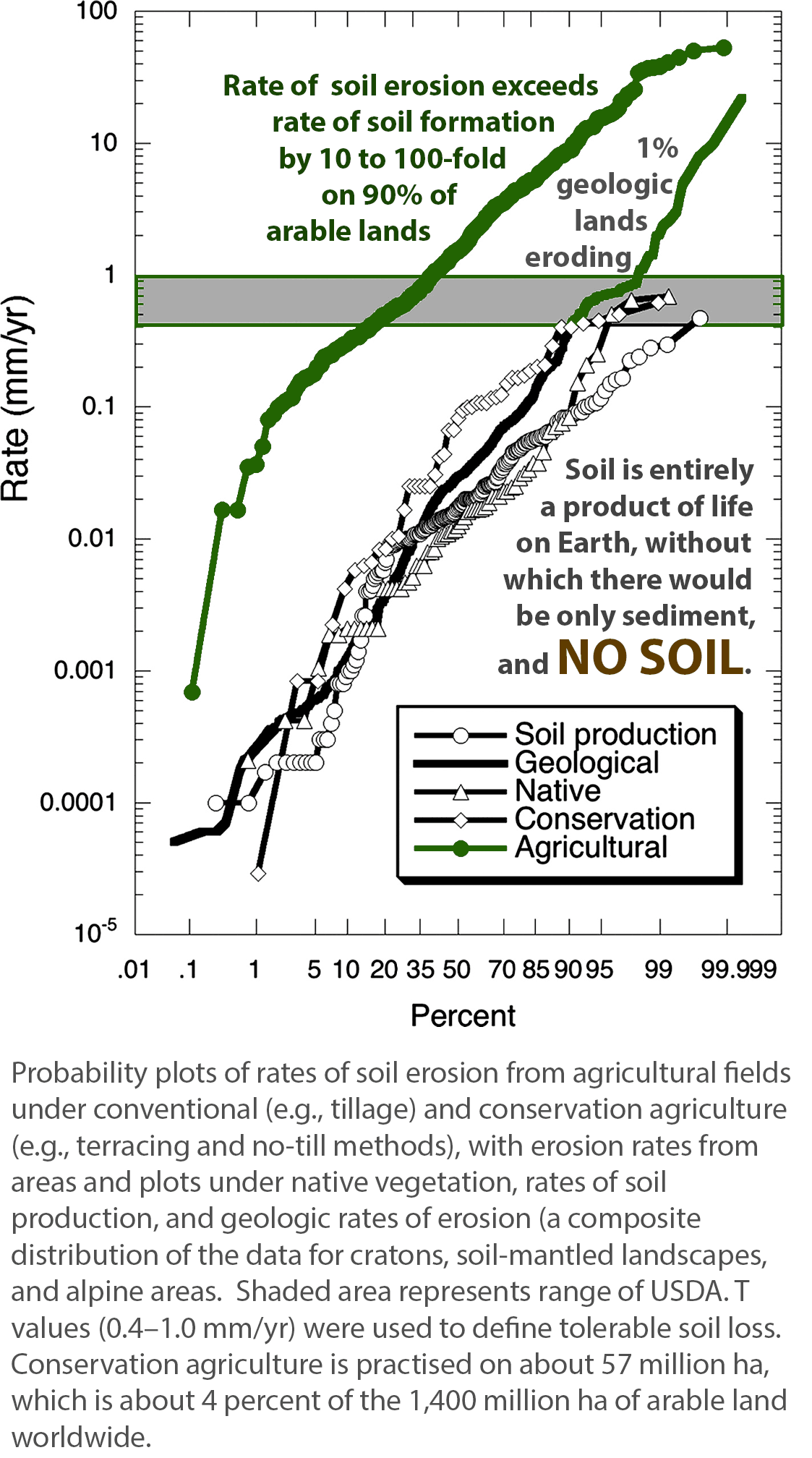
Soil erosion rates are UNSUSTAINABLE.
'Assimilation...proceeds by biotic cleansing and the improvement of others: using up the soil and poisoning it:; putting the fear of God into the animals such that they cower or flee in our presence; renaming fish ‘fisheries’, animals ‘livestock’, trees ‘timber’, and rivers ‘freshwater’ so as to conceptually ground the human enterprise’s extermination and commodification ventures. The impact of assimilation is relentless, and it is grounded in the experience of alienation and the attitude of entitlement.' —Eileen Crist

Europe gets its fresh winter vegetables from greenhouses in Spain, and elsewhere, for a time.
'We are slaves in the sense that we depend on our daily survival upon an expand-or-expire agro-industrial empire—a crackpot machine—that the specialists cannot comprehend and the managers cannot manage. Which is, furthermore, devouring world resources at an exponential rate.' —Edward Abbey

Green is gold, Nicaragua.
Greenhouses are wonderful places for pests to live, and they have to be sprayed for high yield. Workers were firmly told not to breathe, so if any get sick, it's their fault, certainly not the fault of consumers demanding cheap food.
'Why should we tolerate a diet of weak poisons, a home in insipid surroundings, a circle of acquaintances who are not quite our enemies, the noise of motors with just enough relief to prevent insanity? Who would want to live in a world which is just not quite fatal?' —Rachel Carson

Industrial agriculture, China.
China has industrialized vast areas of Nature's land, as has India, even faster than their population has grown as enabled by fossil fuel inputs, for a time. Malthus totally failed to foresee the possibility of turning fossil fuel into food, and he didn't predict that fracking would keep the keep-on-keeping-on going as long as it has. He was another know-nothing doomer.
'Globalization, which attempts to amalgamate every local, regional, and national economy into a single world system, requires homogenizing...locally adapted forms of agriculture, replacing them with an industrial system—centrally managed, pesticide-intensive, one-crop production for export—designed to deliver a narrow range of transportable foods to the world market.' —Helena Norberg-Hodge

Madagascar eroding.
Madagascar is ravaged by overpopulation as humans turn Nature into agricultural, crop and pasture lands, for a time. Over 27 million poor people (GDP per capita $472) on the island are deforesting the island to maintain a population growth of 2.69%, doubling every 26 years, or would if the current death rate doesn't go up. There is one birth every 36 seconds on the island, one death every 3 minutes, one net migrant every 360 minutes Net gain of one person every 45 seconds.
'We stand, in most places on earth, only six inches from destruction, for that is the thickness of the topsoil level upon which the entire life of the planet depends.' —R. Neil Sampson
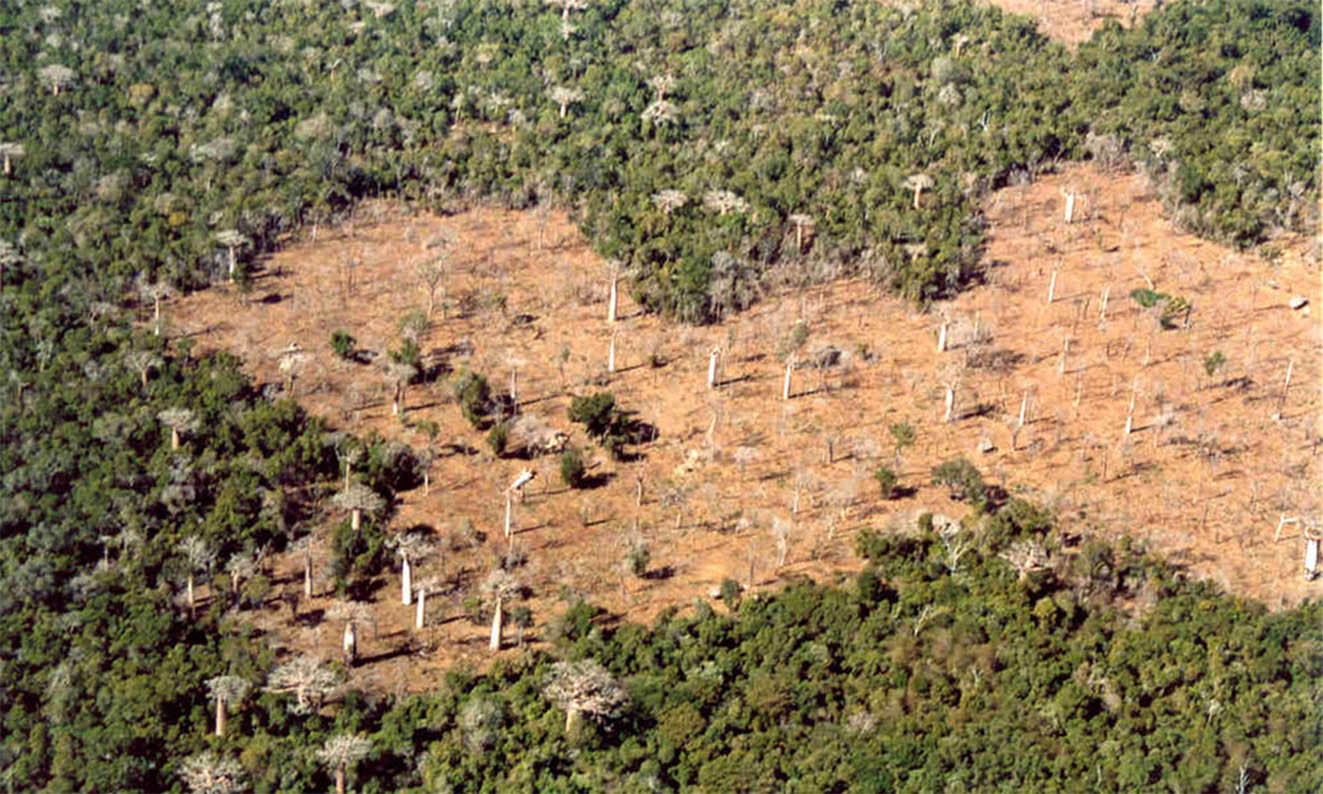
Cleared land, Madagascar.
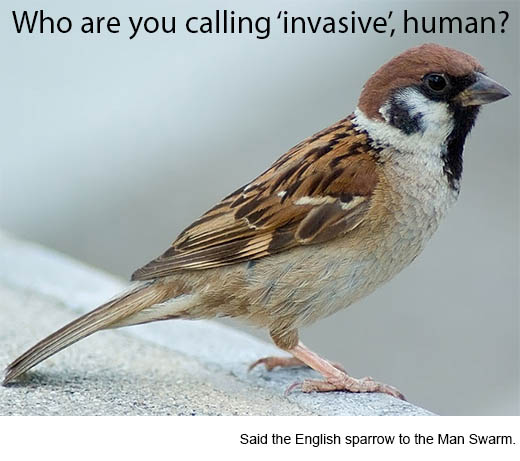
Madagascar's wildlife reflects the fact that the island has been isolated for about 88 million years. As a result, Madagascar is home to what was until recently an abundance of plants and animals found nowhere else on Earth. Approximately 90 percent of all plant and animal species found in Madagascar are endemic.
Humans are an invasive species.
This distinctive ecology has led some ecologists to refer to Madagascar as the 'eighth continent', has been classified by Conservation International as a biodiversity hotspot.
The extinct giant lemur of Madagascar as it may have looked.
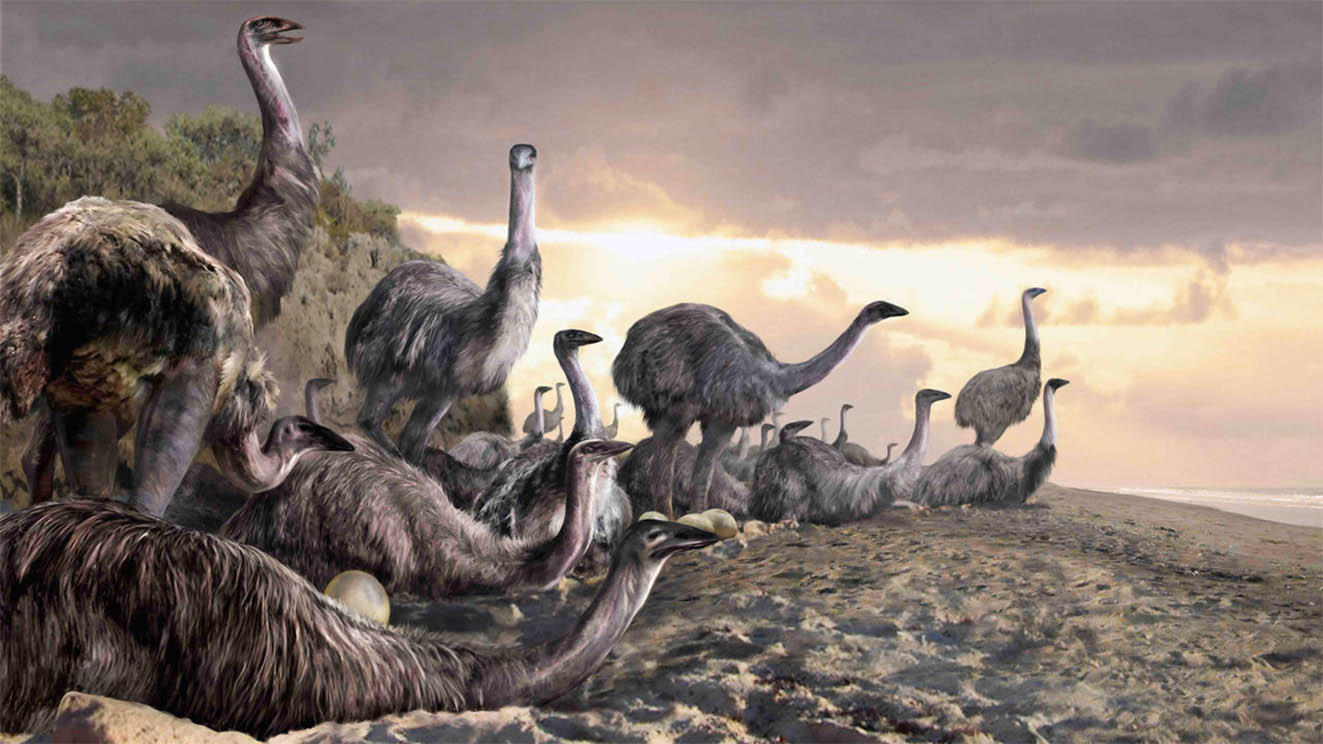
Former XR protest, Madagascar.
Humans arrived on the island over ten thousand years ago. It took nine thousand years for all megafauna to go extinct due to climate change or maybe some super disease, according to unnamed humans.
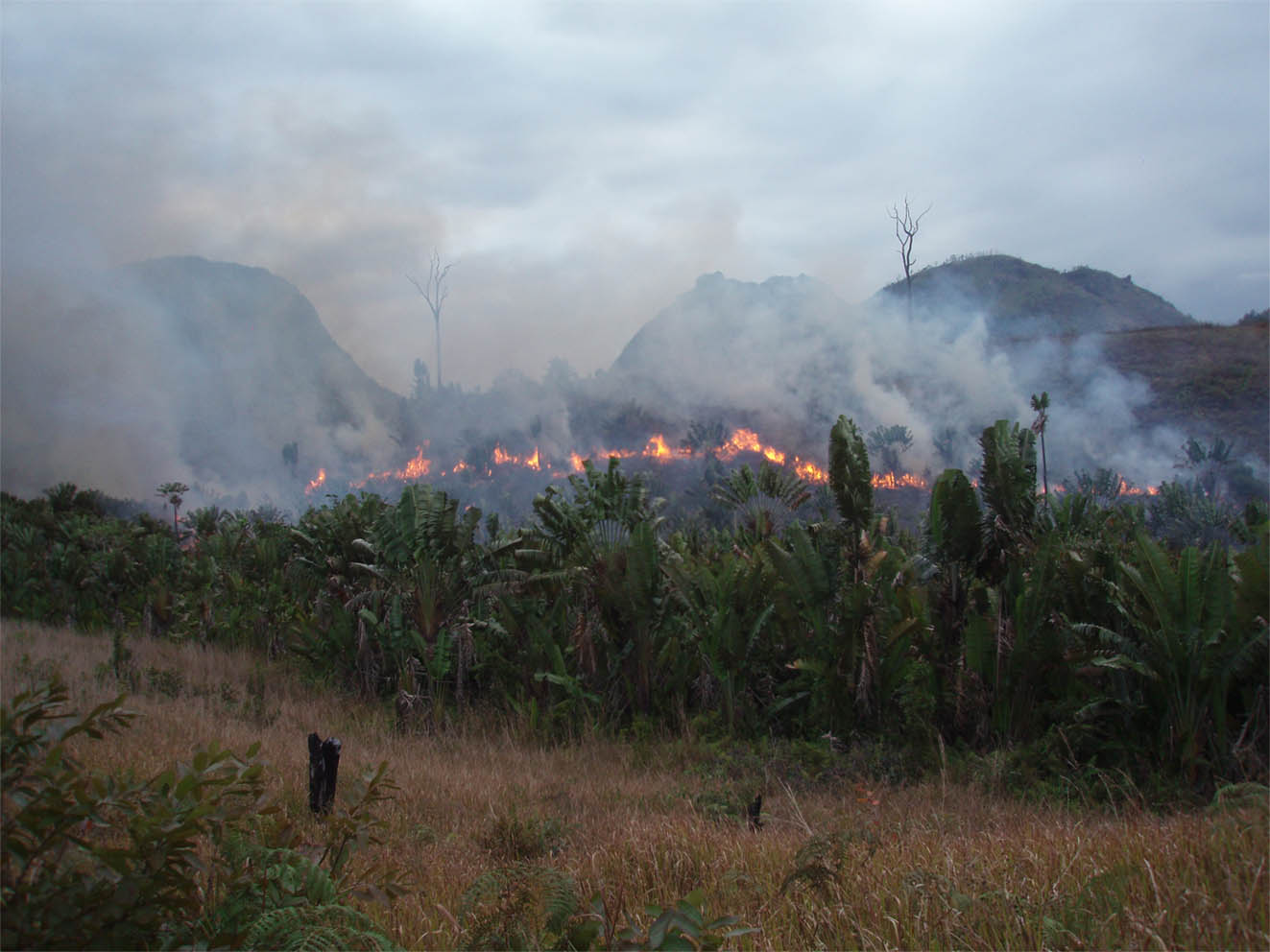
Madagascar burning.
An initiative in 2003 to more than triple the island's protected natural areas to save 10 percent of Madagascar's land surface failed. Local timber merchants are harvesting scarce species of rosewood trees from 'protected' rainforest within National Parks to be exported per BAU to China. Marketable species are targeted by the illegal wildlife trade.
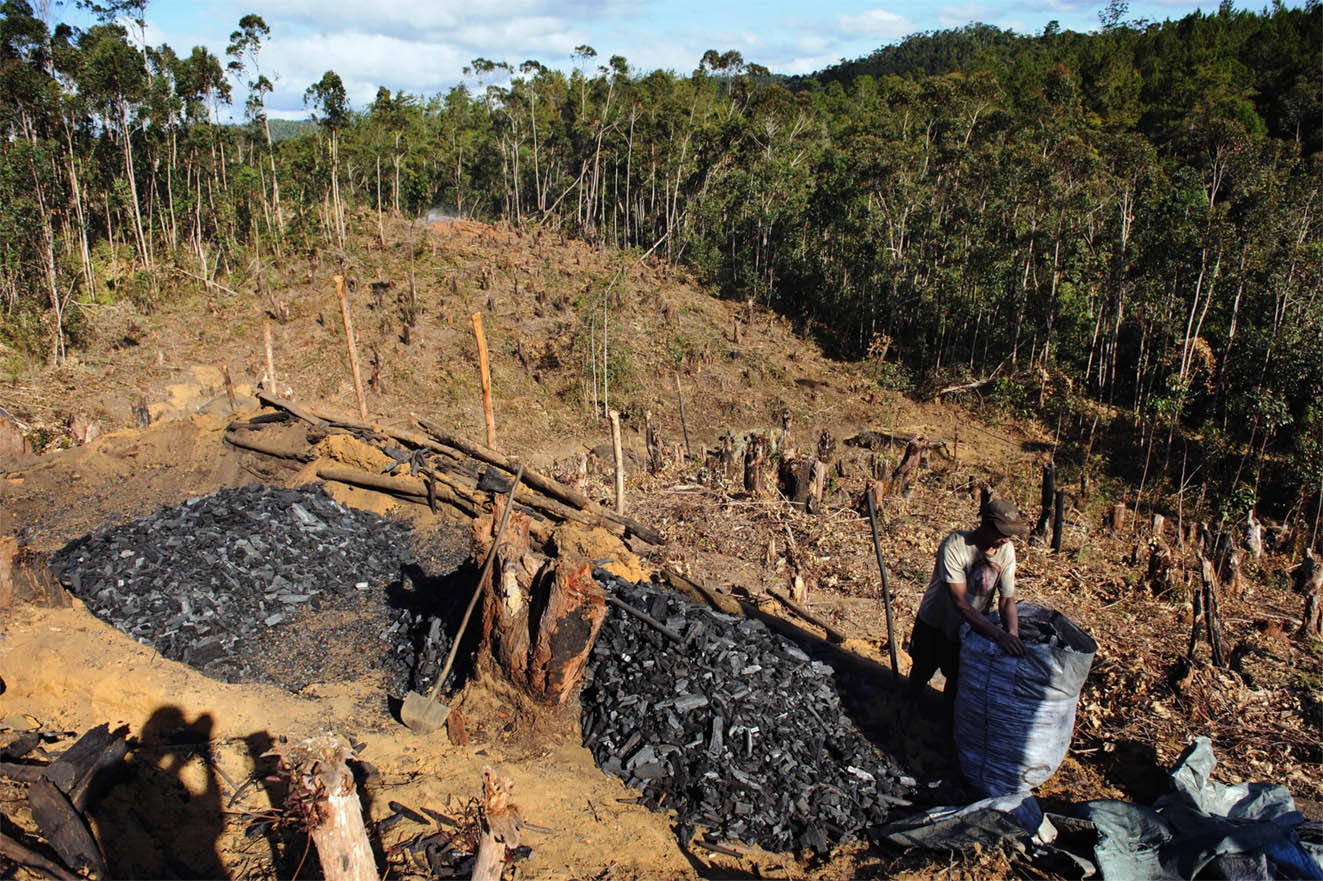
Burning Madagascar for 'sustainable' charcoal.
The small-scale but widespread clearance of forests, primarily for firewood and charcoal production for sale to locals to cook imported food with, is jeopardizing the island’s habitats. And large corporations have a small footprint in Madagascar because there are few rich people.
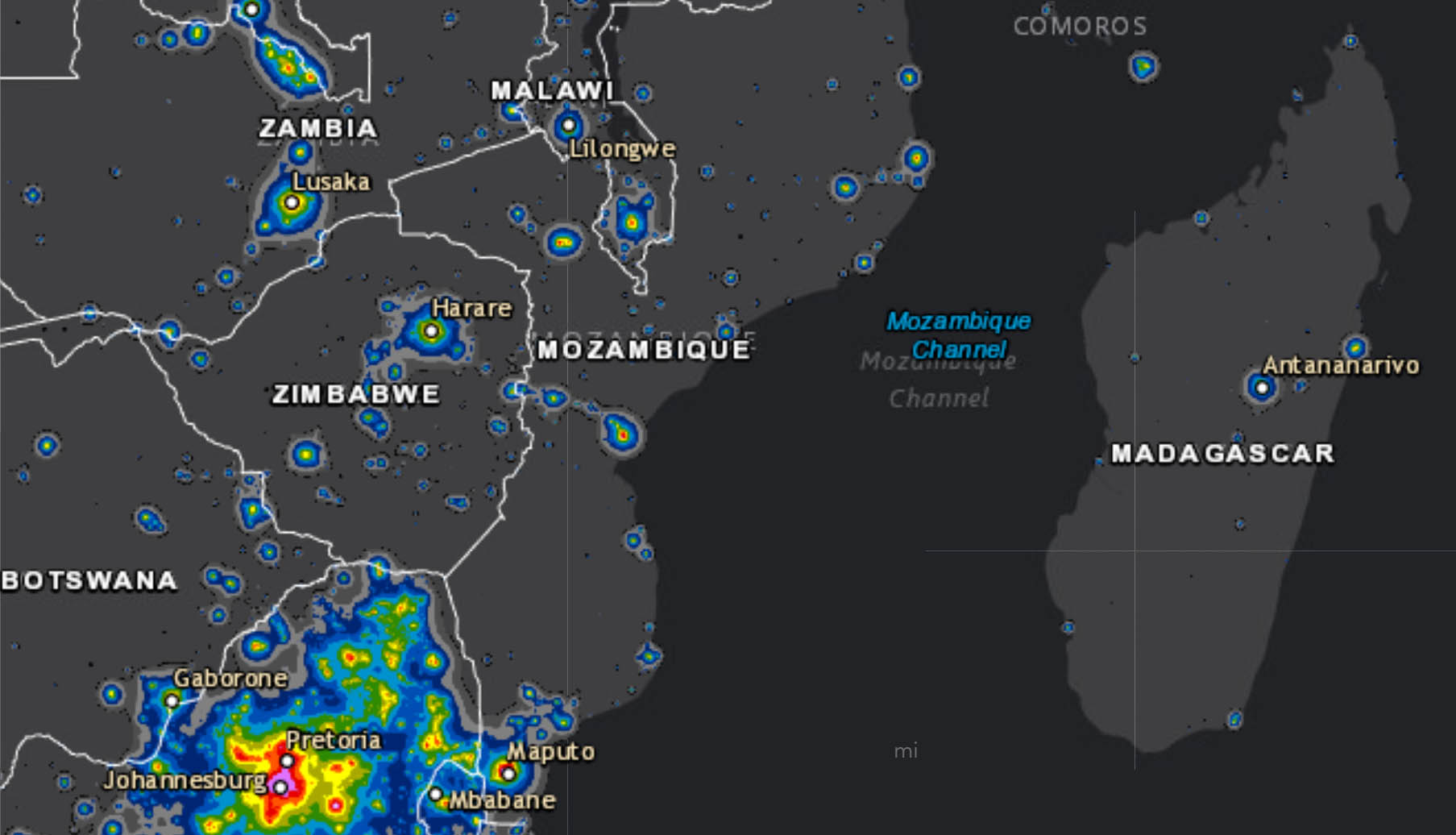
Anthropogenic light.
Madagascar, which does not glow much at night due to a lack of industrial development and big cities, is proof that the only population problem is that there are too many rich people. 'Don't ever be fooled into thinking that [human] population is the cause of the problem [climate change/ecological crisis, ecocide]. The population only really has a devastating effect when it's multiplied by living at a kind of level which is not sustainable. Industrial growth society is the real heart of the trouble in my opinion.' —Rupert Read

Industrial feedlot beef production in Brazil, once covered by
useless rainforest, now helps keep American burgers cheap.
'Despite the industry’s spin, CAFOs (concentrated animal feeding operations) are not the only way to raise livestock and poultry. Thousands of farmers and ranchers integrate crop production, pastures, or forages, or forages with livestock and poultry to balance nutrients within their operations and minimize off-farm pollution through conservation practices and land management…. Yet these sustainable producers, who must compete with factory farms for market share, receive comparatively little or no public funding for their sound management practices.' -—Martha Noble

Pig production, Canada.
'The principle of confinement in a so-called animal science is derived from the industrial version of efficiency. The designers of animal factories appear to have had in mind the example of concentration camps or prisons, the aim of which is to house and feed the greatest numbers in the smallest space at the lease expense of money, labor, and attention. To subject innocent creatures to such treatment has long been recognized as heartless. Animal factories make an economic virtue of heartlessness toward domestic animals, to which we humans owe instead a large debt of respect and gratitude.' —Wendell Berry

High efficiency egg production in Idaho helps keep the cost of eggs down. Children (human) are better fed, for a time.
'The billions of animals that are slaughtered and disassembled each year throughout the factory farm system are viewed as little more than profitable commodities and production units…. This mechanistic mindset about farm animals is even encoded in our laws. The important protections against cruelty and mistreatment in our federal Animal Welfare Act apply to pets, exhibition animals, and research animals, but not to our farm animals.' —Andrew Kimbrell

Pork processing, China.
'The greatness of a nation and its moral progress can be judged by the way its animals are treated.' —Mohandas K. Gandhi as attributed to him
Overshoot

More industrial agricultural production is needed to feed poor refugees in Sudan, for a time.
'In ecology, the term overshoot describes the phenomenon of a species becoming so numerous that it outstrips its habitat. Overshoot leads to diminished carrying capacity, typically followed by a population crash. It is widely acknowledged by ecologists that humanity has overshot the carrying capacity of Earth and is drawing down the ‘natural capital’ that the ecosphere provides. Poverty and malnutrition may be indicators of ecological overshoot. War, corruption, cultural legacies such as colonialism, and other factors certainly contribute to famine and other social problems, but one can clearly see overshoot in the degraded landscapes where humanity has eliminated wild nature and reduced the land’s productivity. It is also evident in depleted stocks of formerly abundant fish, and in the faces of hungry children.' —Authors

Amazon jungle being turned into pasture as not all can be raised in feedlots.
'Throughout history human exploitation of the earth has produced this progression: colonize—destroy—move on.' —Garrett Hardin

Sustainable development goes on. A refugee camp in Kenya.
'Any area of land will support in perpetuity only a limited number of people. An absolute limit is imposed by soil and climatic factors insofar as these are beyond human control, and a practical limit is set by the way in which the land is used. If this practical limit of population is exceeded, without a compensating change in the system of land usage, then a cycle of degenerative changes is set in motion which must result in deterioration or destruction of the land and ultimately in hunger and reduction of the population.' —William Allan
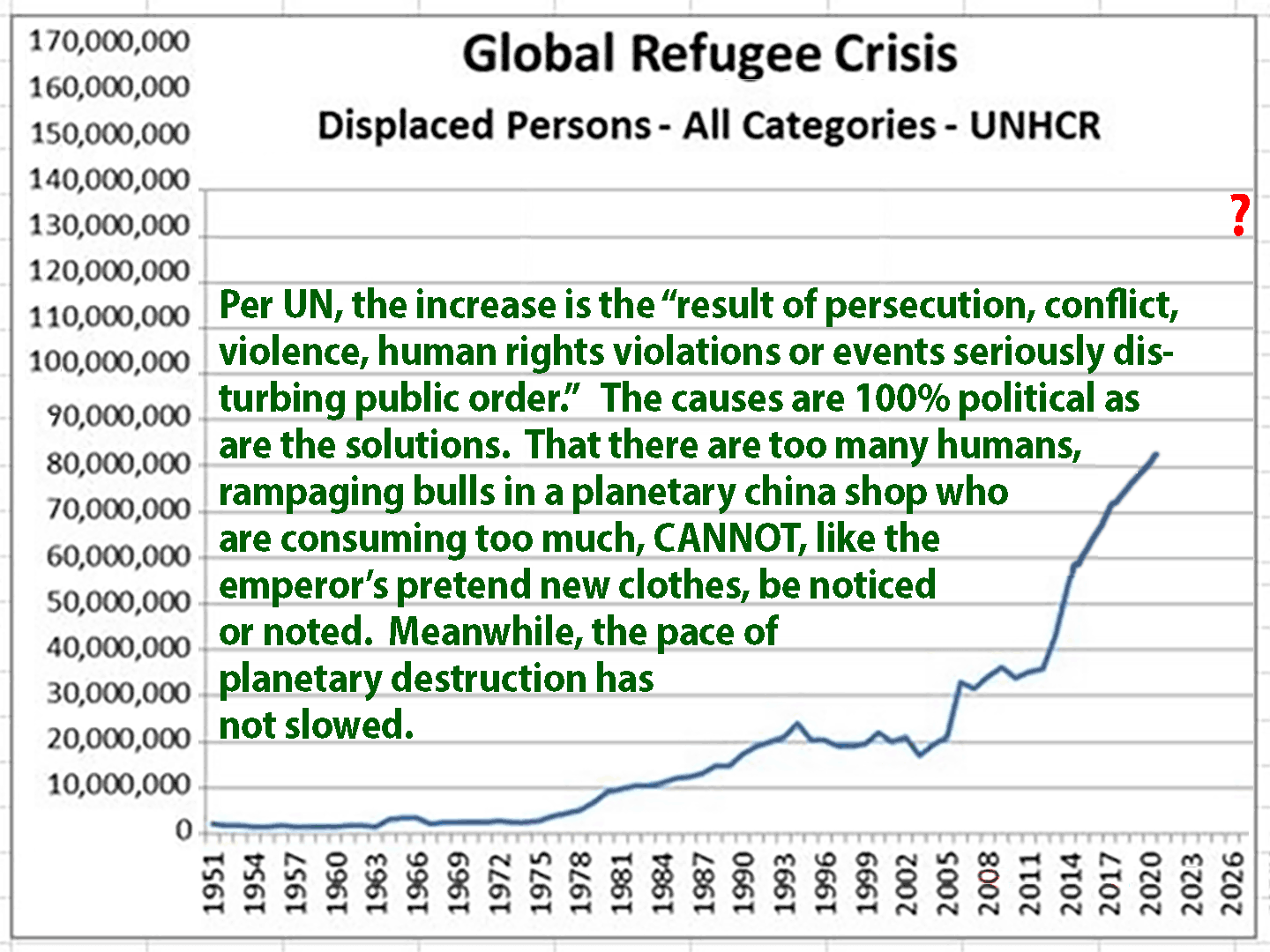
Plots as exponential growth. But when all humans are refugees, or before, the numbers will decline.
'The higher and faster you grow, the further and faster you fall, when you're building up capital stock in a nonrenewable resource. In the face of exponential growth of extraction or use, a doubling or quadrupling of the nonrenewable resource gives little added time to develop alternatives.... The real choice in the management of a nonrenewable resource is whether to get rich very fast or to get less rich but stay that way longer.' —Donella Meadows, Thinking in Systems: A Primer

Food distribution center, Pakistan. Man with bat helps ensure fair and equitable distribution.
'A population and economy are in overshoot mode when they are drawing resources or emitting pollutants at an unsustainable rate, but the stresses on the support system are not yet strong enough to reduce the rates of withdrawal or emission. Overshoot comes from delays in feedback—from the fact that decision makers in the system do not get, or believe, or act upon the information that limits have been exceeded until long after they have been exceeded.' —Donella Meadows, Dennis Meadows, and Jørgen Randers

Goats in Africa and elsewhere help convert nature into humans.
'Too many people brings suffering to the land, and the land returns its suffering to the people ' –O. Soemarwoto
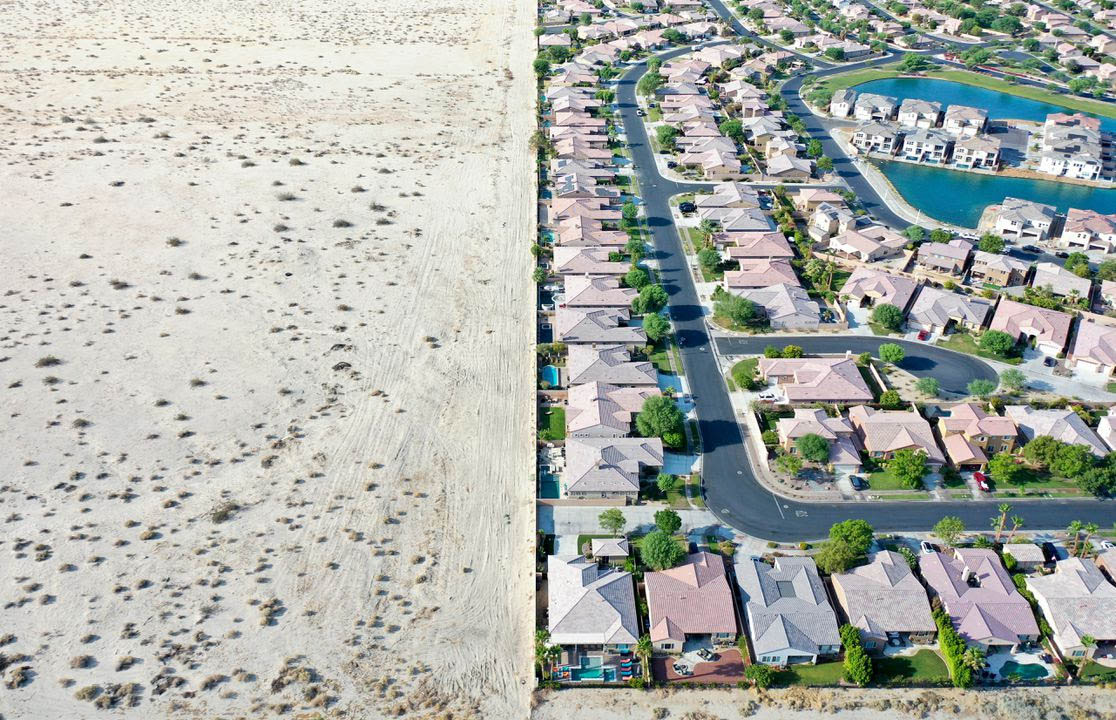
Indio, California, during severe drought condition. Carrying capacity will be less in the future.

Kurdish refugees fled to Turkey, for a time.
'In absolute numbers, more illiterate, impoverished, and chronically malnourished people live in the world at the end of the twentieth century than at the beginning.' —Marvin Harris
Our Material World

Containers are us. A globalized economy needs them so everyone with money can have stuff.
'The sheer volume of raw materials that must be mined, refined, processed, transported, and manufactured into products to service billions of people (and eventually be disposed) almost defies imagination. It is not, however, incalculable. Efforts to gather such data have become increasingly sophisticated and, when combined with various assessments as part of ‘ecological footprint’ analysis, can offer a broadly representative picture of humanity’s global impact. The picture isn’t pretty from cradle to grave, as raw materials are transformed into products, this process of ‘material throughput’ causes ecological damage. Behind that damage to the Earth is the idea of perpetual economic growth being synonymous with progress. In the overdeveloped world, a ubiquitous advertising industry fuels an ethic of hyperconsumption. In the developing world, the grave problems of poverty and social inequity are frequently met not with programs to strengthen traditional community structures, but with ill-conceived efforts to ‘modernize’ and to turn citizens into participants of an ever-expanding, global consumer society.' —Authors

Advertising in Tokyo.
Without being told from soon after birth what we need, we wouldn't know our wants from our needs. Which may be why we don't.
'This attempt to “green” the industry...somehow, they can convince young people not just to consume but to consume more responsibly; that’s the latest idea that the advertising industry has come up with to save themselves…. There is a fundamental contradiction that they still haven’t come to grips with. And that fundamental contradiction is that we don’t need to consume any more, we don’t need a five-hundred billion-dollar-a-year industry telling us to consume more. We already consume enough.' —Kalle Lasn

A shopping maul in India offers everything a human needs. And some people think people in India are poor.
'In the developing world, the problem of population is seen less as a matter of human numbers than of Western overconsumption. Yet within the development community, the only solution to the problems of the developing world is to export the same unsustainable economic model fueling the overconsumption of the West.' —Kavita Ramdas

Humans have worn jewelry for hundreds of thousands of years. Everyone needs jewelry.
'That which seems to be wealth may in verity only be the gilded index of far-reaching ruin.' —John Ruskin

Dazed consumer likely to convert and join Reverend Billy's Church of Stop Shopping. But not now, later.
'Consumerism is not only an ahistorical trait of human nature but a specific product of capitalism.' —Juliet B. Schor

Got cars? Questioning whether humans need to drive cars? Are you barking mad?
'There are some things in the world we can’t change—gravity, entropy, the speed of light...and our biological nature that requires clean air, clean water, clean soil, clean energy, and biodiversity for our health and well-being. Protection the biosphere should be our highest priority or else we sicken and die. Other things, like capitalism, free enterprise, the economy, currency, the market, are not forces of nature, we invented them. They are not immutable, and we can change them. It makes no sense to elevate economics above the biosphere.' —David Suzuki

Factory processing needed Cabbage Patch Dolls, China.
'Some people continue to defend trickle-down theories which assume that economic growth, encouraged by a free market, will inevitably succeed in bringing about greater justice and inclusiveness in the world. This opinion, which has never been confirmed by the facts, expresses a crude and naive trust in the goodness of those wielding economic power and in the sacralized works of the prevailing economic system. Meanwhile, the excluded are still waiting. To sustain a lifestyle which excludes others, or to sustain enthusiasm for that selfish ideal, a globalization of indifference has developed.' —Pope Francis
The Trashing of a Planet

Birds and plastic bags near garbage dump in China.
'An increasingly globalized industrial economy strips raw materials from every corner of the globe, delivers them where manufacturing or processing costs are cheapest, and ships the resulting products to distant markets. This economic activity, crisscrossing the Earth in a web of transport routes, is based on abundant cheap energy. Every step generates waste—some of which is dumped into the atmosphere as air pollution; some into local waterways; some into the ground. A culture that treats the Earth as a commodity as merely a storehouse of resources for human use, is a throwaway culture producing throwaway stuff. The culture’s legacy is the endless stream of solid waste—trash—that ends up heat in landfills, scattered across the landscape, or adrift in massive trash gyres at sea.' —Authors

Another view of dystopia, Bangladesh.
'Put simply, if we do not redirect our extraction and production systems and change the way we distribute, consume, and dispose of our Stuff—what I sometimes call the take-make-waste model—the economy as it is will kill the planet.' —Annie Leonard

Garbage Cows. Ivory Coast, Africa.
'Since survival is nothing if not biological...perpetuating economic or political institutions at the expense of biological well-being of man, societies, and ecosystems may be considered maladaptive.' —Roy Rappaport

People search or 'mine' an old dump for metal, Guatemala City.
This will become a more common economic activity as we progress.
'The hungry world cannot be fed until and unless the growth of its resources and the growth of its population come into balance. Each man and woman—and each nation—must make decisions of conscience and policy in the face of this great problem.' —Lyndon B. Johnson

Where computers go to die, Ghana.
'Even as a waste disposal site, the world is finite.' —William R. Catton Jr.
'

Where tires go to die, Nevada, USA.
'The laws of thermodynamics restrict all technologies, man’s as well as nature’s, and apply to all economic systems, whether capitalist, communist, socialist, or fascist. We do not create or destroy (produce or consume) anything in a physical sense—we merely transform or rearrange. And the inevitable cost of arranging greater order in one part of the system (the human economy) is creating a more than offsetting amount of disorder elsewhere (the natural environment).' —Herman E. Daly

Surf's up in Java.
'Water and air, the two essential fluids on which all life depends, have become global garbage cans.' —Jacques-Yves Cousteau
Nature Unraveled

Burn forest, burn. Amazon, the lungs of the planet.
'Five deep contradictions in life’s diversity are recorded in the fossil record, the last occurring 65 million years ago when the dinosaurs went extinct. Those previous mass extinction events were all precipitated by natural causes. The sixth, and current, great extinction is caused by humanity’s destruction of intact habitat, overkilling of wildlife, and climate disruption. Nature’s death is by a thousand cuts—from deforestation, livestock overgrazing, conversion of wild habitat to agriculture, industrial development, mining, pollution, spread of invasive species, energy extraction in myriad forms, etc. The cuts come from many blades, but the result is the same: biological impoverishment as ecosystems are degraded and native species are lost. Moreover, each of these nicks on nature represents the loss of wild beauty. Because humanity depends on healthy ecosystems for clean air and water, fertile soil, and pollination services, the unraveling of nature should alarm every human being on Earth.' —Authors

Industrial society needs palm oil, and palm oil plantations to efficiently grow palms after deforestation.
'The “poster child” for negative impacts from biofuel production is palm oil biodiesel…. Greenhouse gas emissions from the conversion of Asia’s lowland peat forest into palm oil plantations are astronomical, accounting for nearly 8 percent of the global total.' —Rachel Smolker

Palm oil 'forest' on left, wildlife reserve on right until industrial society needs palm oil, and more palm oil plantations.
Humans first!
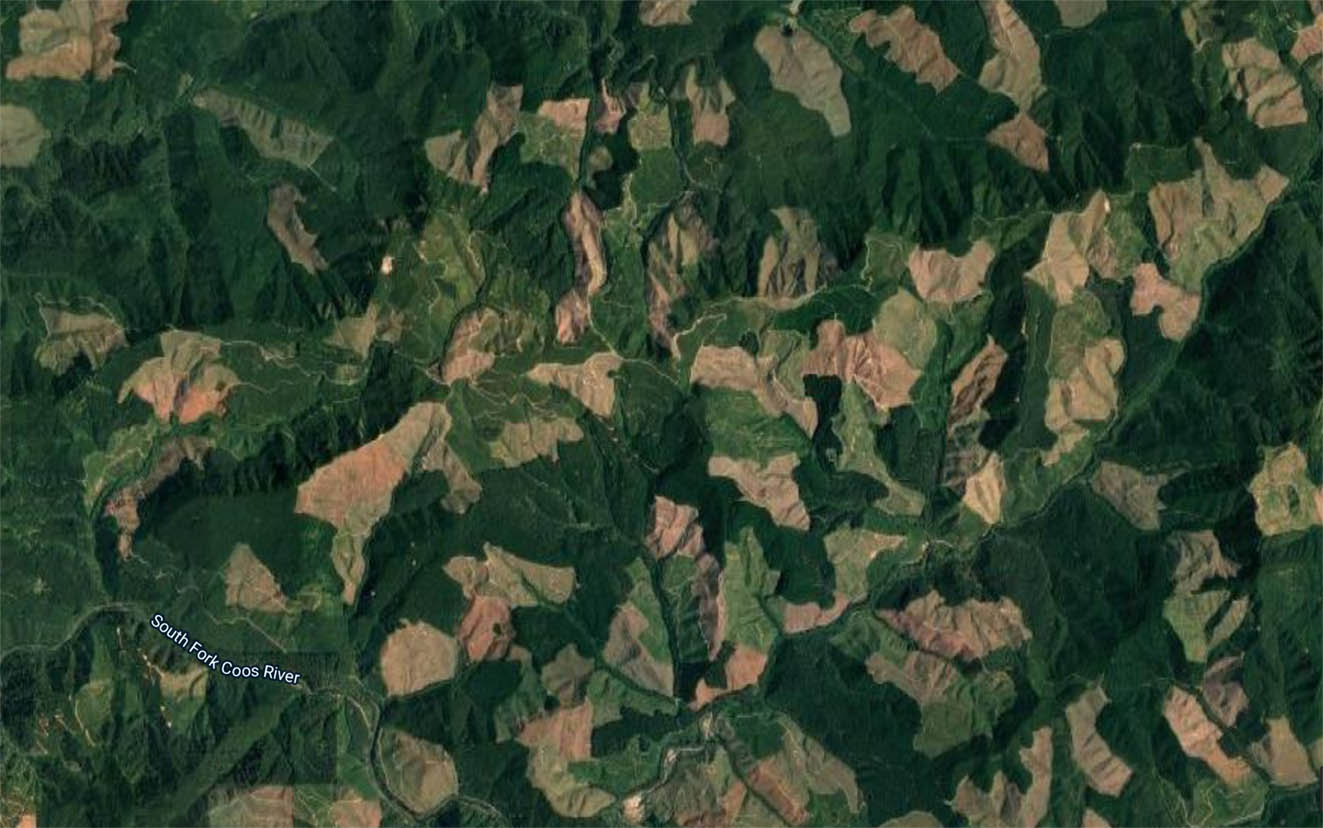
Former temperate rainforest, Oregon, USA, now private 'owned' tree farms where such trees as regrow are clear cut every 40-60 years.
'If society does not succeed in changing attitudes and institutions for a harmonious descent, the alternative is to prepare information packages for the contingency of restart after crashing..., seek out the condition now that will come anyway.' —H.T. Odum
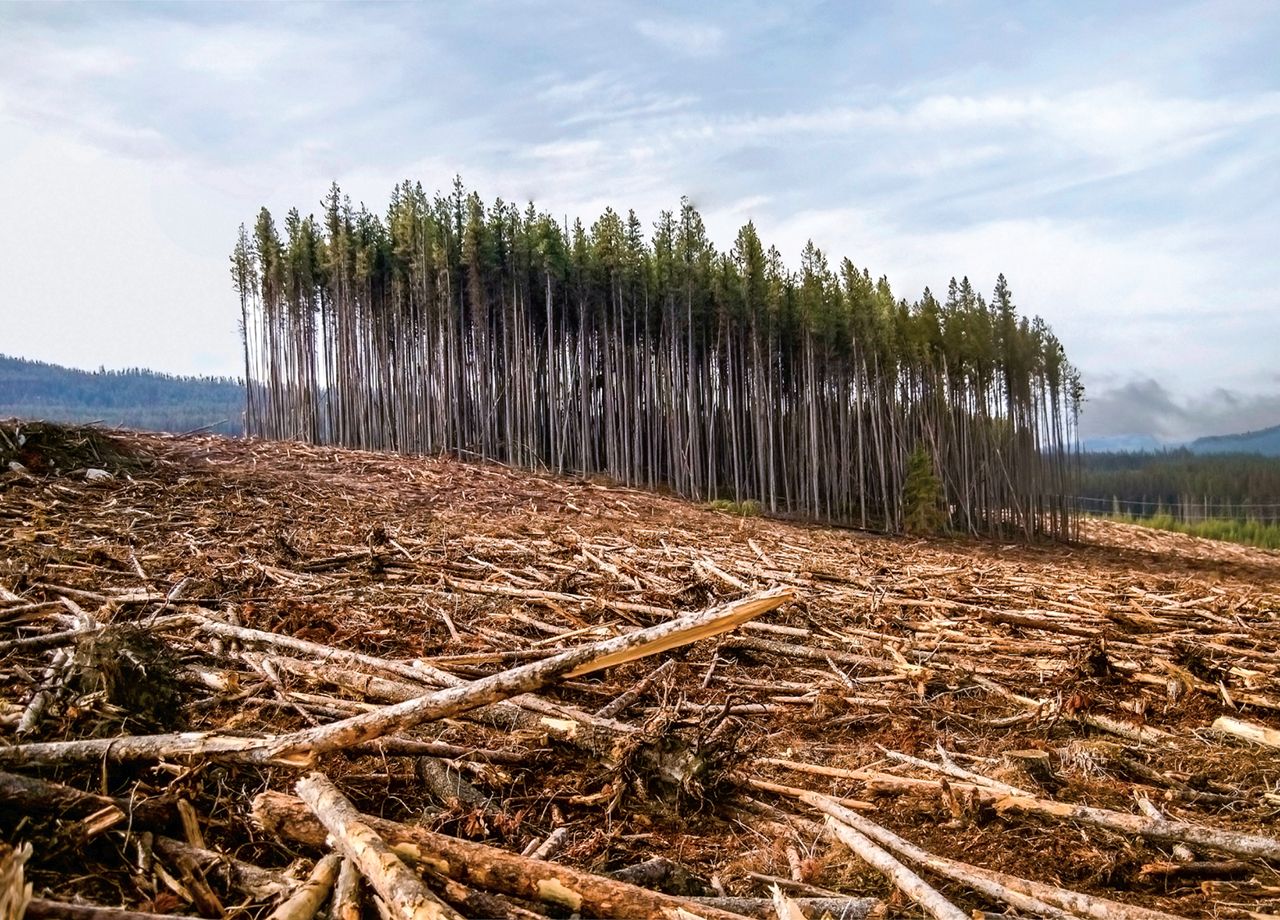
Trees' last stand. And then what?
'With the coinage of "sustainable development", the defenders of the unsteady state have won a few more years' moratorium from the painful process of thinking.' — Garrett Hardin
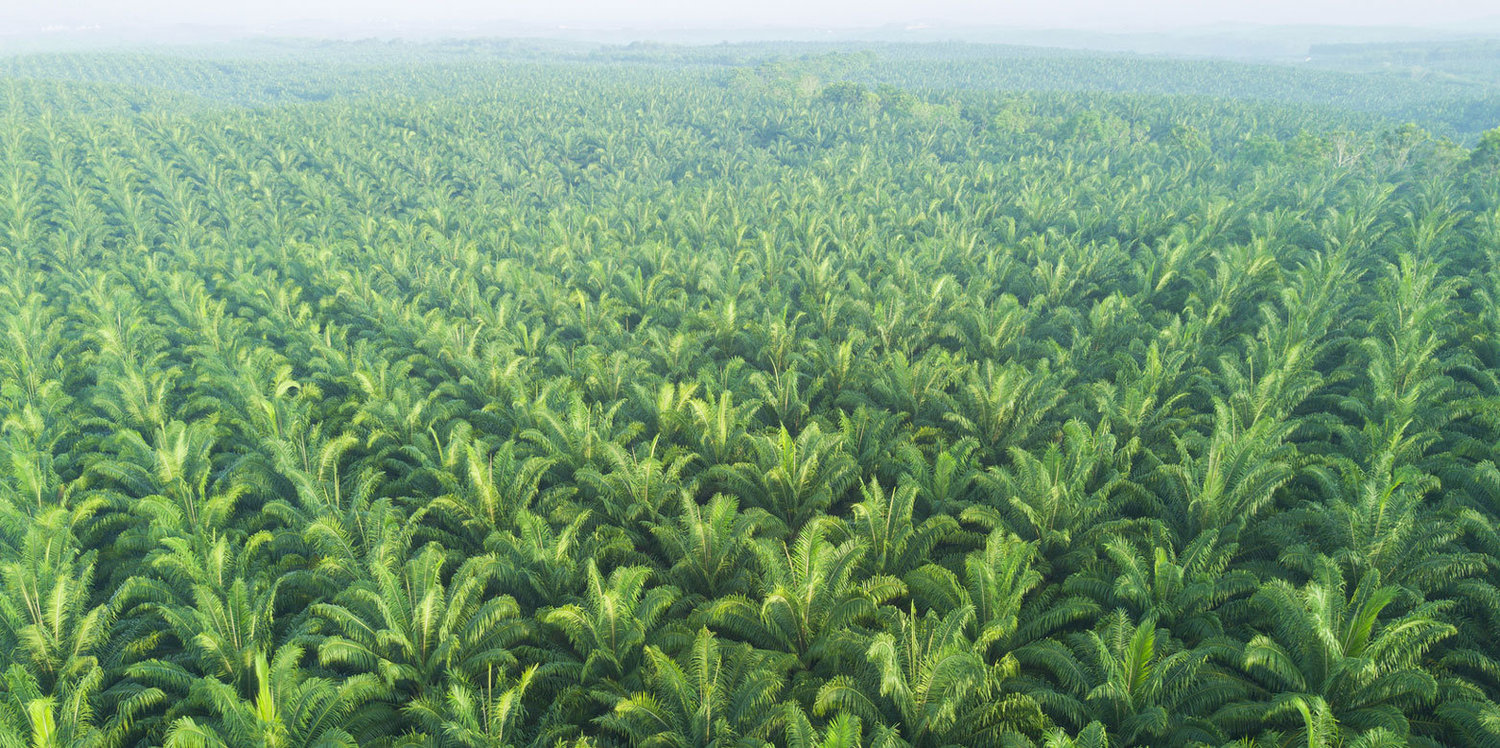
Industrial society needs palm oil, and palm oil plantations to efficiently grow palms after deforestation (above: NOT a forest).
'The “poster child” for negative impacts from biofuel production is palm oil biodiesel…. Greenhouse gas emissions from the conversion of Asia’s lowland peat forest into palm oil plantations are astronomical, accounting for nearly 8 percent of the global total.' —Rachel Smolker

The Brazil of the North, British Columbia, Vancouver Island clear cut. Same BAU pattern repeated globally with minor variations.
'Human domination over nature is quite simply an illusion, a passing dream by a naive species. It is an illusion that has cost us much, ensnaring us in our own designs, given us a few boasts to make about our courage and genius, but all the same it is an illusion.' —Donald Worster

Tree farm product, Brazil
Diverse forested areas (biomes) in Brazil can be clear cut and planted in fast growing uniform eucalyptus trees to reforest the jungle to make it useful. And capture carbon helping to mitigate climate change, for a time.
'In an interconnected world, the decision to bear a child isn’t only a personal matter, nor does it pertain only to one’s moment. Won’t even the wanted, cared-for children feel betrayed to discover (assuming that such thoughts are still thinkable in the future) that previous generations ignored the problem of overpopulation and dodged the difficult choices in favor of a comfortable, conventional existence whose price included migratory songbirds, large mammals, old-growth forests, and the polar ice shelves?' —Stephanie Mills

Oil wells, California, USA. They move up and down, for a time. And then what?
'I don’t understand why when we destroy something created by man we call it vandalism, but when we destroy something created by nature we call it progress.' —Ed Begley Jr.

The Big Hole, world's largest diamond mine, Russia.
'Do you think you can take over the universe and improve it? I do not believe it can be done. The universe is sacred. You cannot improve it. If you try to change it you will ruin it.' —Lao Tzu
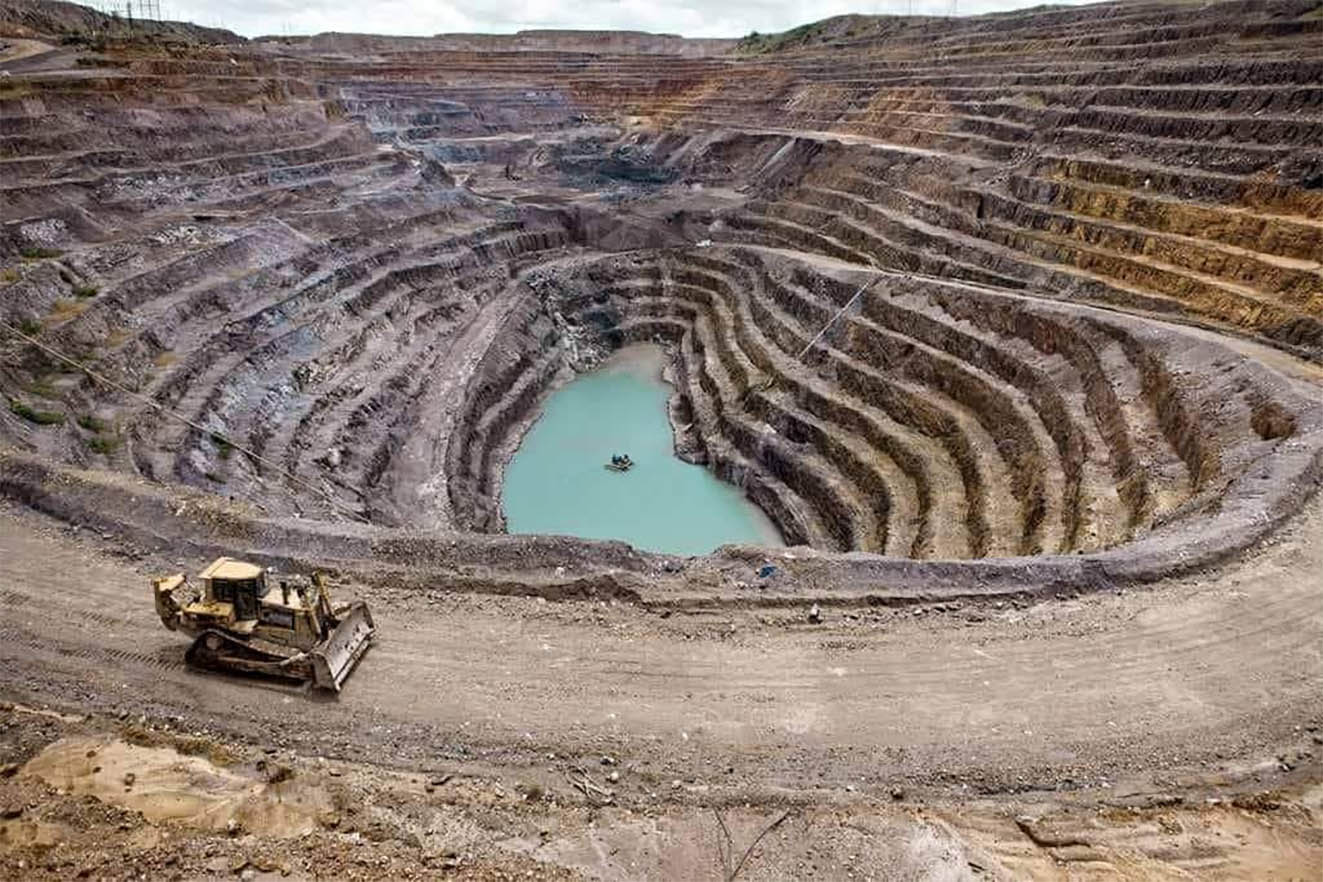
Industrial cobalt mining in Congo
All mining is unsustainable.

A peatland rainforest.
The land, recently cut and burned, needs to be drained for another palm oil plantation needed by the economy and God (but I repeat myself), in Indonesia.
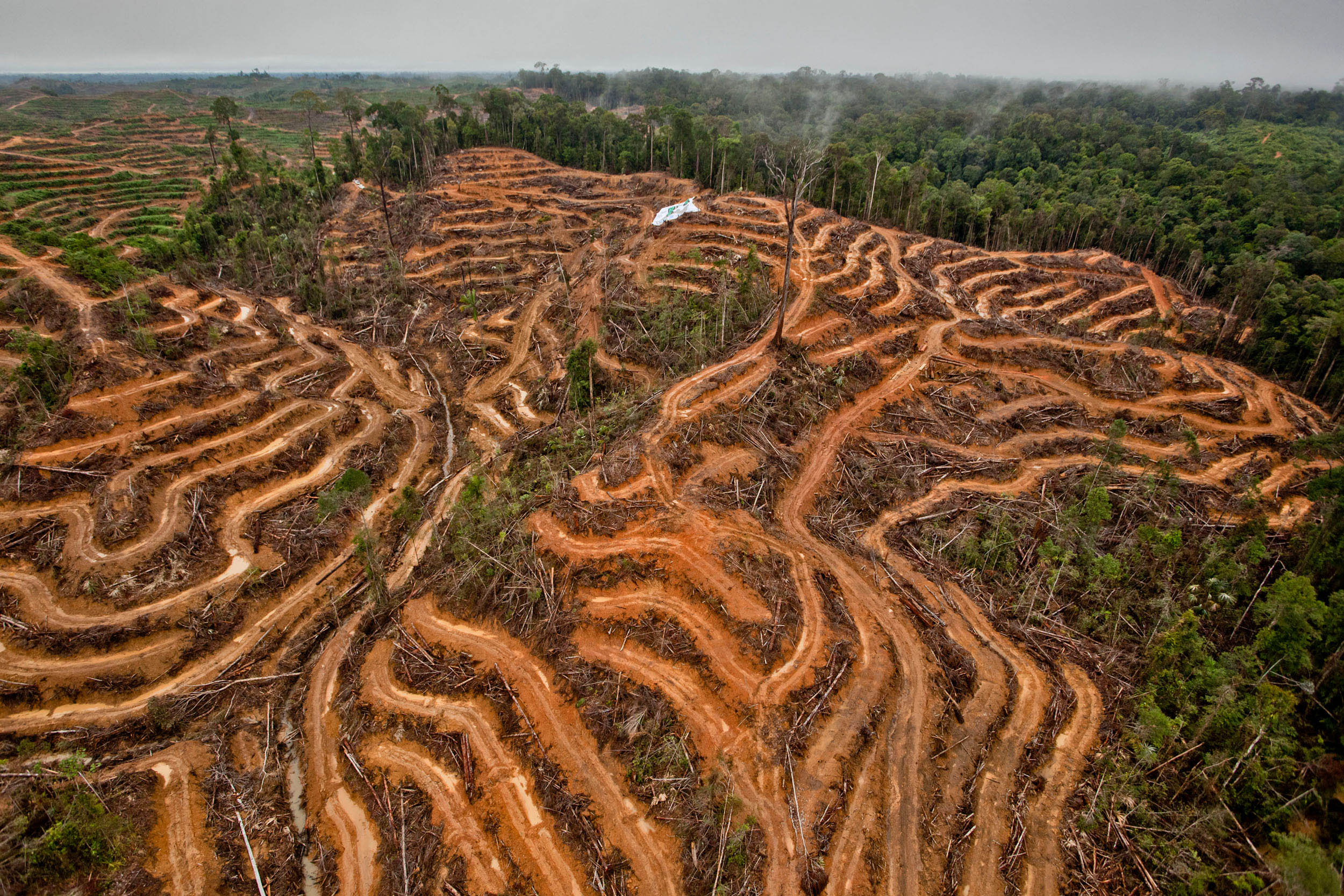
A former forest turned into palm oil plantation by energy slaves to fuel industrial society (Lord Man), Indonesia.

Where palm oil comes from: first deforest, terraform, then monoculture to make money (for a time), Sumatra.
'Our primordial spontaneities, which give us a delight in resistance and enable us to interact creatively with natural phenomena, are being stifled. Somehow we have become autistic. We don’t hear the voices. We are not entranced with the universe, with the natural world. We are entranced instead with domination over the natural world, with bringing about violent transformation.' —Thomas Berry

Trawler net.
A net coming in with its bounty. There is an ever growing demand for fish protein, especially to feed animals like chickens humans like to eat, and the oceans of the world are a commons. They are being seined of all life that can be taken. But the world's intelligentsia has determined that Garrett Hardin was just wrong about the so-called tragedy of the commons thing, along with everything else he said, so nothing to see here, folks.
'If you’re overfishing at the top of the food chain, and acidifying the ocean at the bottom, you’re creating a squeeze that could conceivably collapse the whole system.' —Carl Safina
Wildlife Lost

Another dead elephant, poached in Kenya. It's a market out there.
'For humanity’s burgeoning numbers and selfish behavior to be the cause of other species’ slide into extinction is the clearest marker that our present course is both unsustainable and unethical. Even while 95 percent of scientifically described species have yet to be analyzed for their conservation status, the IUCN (International Union for Conservation of Nature), which tracks the status of imperiled species around the globe, lists some 20,000 species that are threatened with extinction. Given the relative paucity of data around various groups of organisms, the actual number of species on the cusp of oblivion is certainly far larger, and numerous scientific studies have noted the accelerating trend of biodiversity loss. Humanity’s assault on wildlife isn’t new, but 7+ billion people armed with advanced technology—from bottom-scouring trawlers that mine the seas of fish, to endocrine-duplicating chemicals that affect wild species’ reproductive success, to violent poachers decimating elephants for their ivory tusks—are simply more lethal to wildlife now than at any point in human history.' —Authors

Ivory piled high, Kenya.
About 850 elephants were poached for ivory to make this pile, Not all of it went to market. Instead of selling the ivory seized by authorities from poachers, this pile was burned to keep the price high and see that the poachers who don't get caught prosper more. The money that could have been raised could have paid for a lot of gunmen to shoot poachers, but all agree humans matter more than elephants. Shooting poor people who just want to feed their family is unthinkable, and so the pace of planetary destruction continues.
'The massive growth of the human population through the 20th century has had more impact on biodiversity than any other single factor.' —Sir David King

Shark in net, Mexico.
'There is a terribly terrestrial mindset about what we need to do to take care of the planet—as if the ocean somehow doesn’t matter or is so big, so vast that it can take care of itself, or that there is nothing that we could possibly do that we could harm the ocean…. We are learning otherwise.' —Sylvia Earle

Shark for soup.
Shark fins being readied to turn into soup, Hong Kong. The rest of the shark isn't worth enough to bring back from the ocean's commons and so goes back to the sea instead of being turned into animal feed to provide humans the protein they crave in forms they crave.
'Except for giant meteorite strikes or other catastrophes, Earth has never experienced anything like the contemporary human juggernaut. We are in a bottleneck of overpopulation and wasteful consumption that could push half of Earth’s species to extinction in this century.' —E. O. Wilson

Pelicans covered in BP oil.
'A country can cut down its forests, erode its soils, pollute its aquifers and hunt its wildlife and fisheries to extinction, but its measured income is not affected as these assets disappear. Impoverishment is taken for progress.' —Robert Repetto

A dead gorilla being removed from forest.
'The mountain gorilla faces grave danger of extinction, primarily because of the encroachments of native man upon its habitat—and neglect by civilized man, who does not conscientiously protect even the limited areas now allotted for the gorilla’s survival.' —Dian Fossey

Siberian tiger skin recovered from poachers.
'Less than 3,500 tigers (Panthera tigris) now occur in the wild, occupying less than 7 percent of their historical range…. With the tiger we are witnessing the tragic winking out of one of the planet’s most beloved animals across its range, one population at a time.' —Elizabeth L. Bennett

A ship in the Japanese whaling fleet collects another whale for research.
'In the relations of man with the animals, with the objects of creation, there is a great ethnic, scarcely perceived as yet, which will at length break forth into the light and which will be the corollary and complement to human ethics.' —Victor Hugo

Russian poachers caught smuggling bear paws into China. The bears had the worst of it.
'We need another and a wiser and perhaps a more mystical concept of animals…. They are not brethren, they are not underlings; they are other nations, caught with ourselves in the net of life and time, fellow prisoners of the splendor and travail of the earth.' —Henry Beston

Seabirds like plastic. Humans like plastic.
'Surely the fate of human beings is like that of the animals; the same fate awaits them both: As one dies, so dies the other. All have the same breath.' —Ecclesiastes 3:19

A 'traditional' whale hunt. Humans like whales.
'Perhaps we can adapt to global warming, and perhaps we can survive a mass extinction even of species on land. But I know one thing to be an ecological certainty and that is if we kill the oceans—we kill ourselves.' —Captain Paul Watson

We hear a lot about domestic bees and colony collapse disorder, but the demise of native bees is rarely even mentioned.
'Of the 250,000 species of plants that share our world, three quarters rely on wild pollinators to reproduce. Wherever you live, look around and see a world engineered by these pollinators. Then look around and see a world in distress. Honeybees may have been filling in for wild pollinators to bolster our agriculture, but they can’t do much for the other 249,900 species of flowering plants. That’s up to the native bugs. And while evidence is hard to come by, many of these species are falling under the triple threats of habitat loss, pesticide poisoning, and exotics.' —Rowan Jacobsen
Energy Empowers

There be monster trucks. This one helped mine tar sands in Canada to extract low EROI oil, for a time.
'Modern, techno-industrial society runs on energy—massive amounts of inexpensive, continuously available power generated primarily from fossil fuels. Around 1800, at the dawn of the Industrial Revolution, the global human population was roughly 1 billion. It had taken our entire lifetime as a species to reach that milestone in the subsequent two centuries, the human population has grown more that sevenfold, and energy use per capita has increased by more than thirty times. Clearly, as a species we have gotten tremendously clever at deploying energy resources to support population and economic growth. But at what cost? The energy sector likely affects a greater area than any other activity except agriculture. It seems there is nothing we won’t do, no landscape too precious to exploit for energy production. Even as landscapes across the globe are blighted in the mad rush for more energy to fuel growth, billions of people on Earth still have little or no access to energy resources that could improve their health and prospects for the future.' —Authors

Coal train terminal, Virginia, where in the 1730s farmers scraped up
high EROI coal in bushel baskets to sell, starting the Coal Age in the USA.
'In many ways, the world’s coal reserves only make our energy problems worse, because they give us a false sense of security: if we run out of gas and oil, we can just switch over to coal; if we can figure out a way to ‘clean’ coal, we can have a cheap, plentiful source of energy. In reality, however, facing the twin challenges of the end of oil and coming of global warming is going to require reinventing the infrastructure of modern life. The most dangerous thing about our continued dependence on coal is not what it does to our lungs, our mountains, and even our climate, but what it does to our minds: it preserves the illusion that we don’t have to change our thinking.' —Jeff Goodell

Mountain-top removal.
How to stripmine coal in USA. Mohammad may have moved mountains, but there is no evidence. That we industrialized humans moved and removed mountains will be evident in the geological record for eons to come. With continued progress, the Earth will come to cast a slightly different shadow on the Moon.
'In Southern West Virginia we live in a war zone. Three and one-half million pounds of explosives are being used every day to blow up the mountains. Blasting our communities, blasting our homes, poisoning us, trying to intimidate us. I don’t mind being poor. I mind being blasted and poisoned. There are no jobs on a dead planet.' —Judy Bonds

Tokyo dock.
Industrial society does not live by bread alone. Fossil fuel energy inputs to empower the Japanese economy, for a time, arrive at this part of Tokyo. Dock on right. The LNG terminal planned for Coos Bay will send liquidized natural gas to Japan who has agreed to buy it. This dock is for coal, so it will end up at a different dock before the CO2 is liberated.
'The environmental crisis can be viewed as a tree with two trunks. One trunk represents what we are doing to the planet through atmospheric accumulation of heat-trapping gases, follow this trunk along and you find droughts, floods, acidification of oceans, dissolving coral reefs, and species extinctions. The other trunk represents what we are doing to ourselves and other animals through the chemical adulteration of the planet with inherently toxic synthetic pollutants…. At the base of both these trunks is an economic dependency on fossil fuels, primarily coal (plant fossils) and petroleum (animal fossils).' —Sandra Steingraber

Megadam in China, busy damming all rivers that can be dammed,
doing what the USA did
in the 20th century: turn fossil fuel into dams, for a time.
'Destroying wild rivers with large dams in order to generate electricity is one of the clearer examples of a false solution to humanity’s ‘need’ for energy. Modernity has unnecessarily inflated this need; given the severe negative environmental impacts of electricity generation in general, it is amazing how superfluously and frivolously this form of energy is utilized. At this point in human history, our capacity to have blind spots regarding truly life-or-death issues has become one of our most prominent traits.' —Juan Pablo Orrego

Tar sands being converted into humans. The tailings ponds are visible from space.
'All of our current environmental problems are unanticipated harmful consequences of our existing technology. There is no basis for believing that technology will miraculously stop causing new and unanticipated problems while it is solving the problems that it previously produced.' —Jared Diamond
For a mind opening view of the unanticipated consequences of technology on early Americans, consider the consequences of providing chiefdom level complex societies with firesticks.

Before empowering the global economy, for a time, the oil needs to be refined. This refinery is in Saudi Arabia. The pollution starts here.
'We have reached a point of crisis with regard to energy, a point where the contradictions inherent in our growth-based energy system are becoming untenable, and where its deferred costs are coming due. The essential problem is not just that we are tapping the wrong energy sources (though we are), or that we are wasteful and inefficient (though we are), but that we are overpowered, and we are overpowering nature.' —Richard Heinberg

Fukushima damage 'control'.
'So the big question about nuclear ‘revival’ isn’t just who’d pay for such a turkey, but also...why bother? Why keep on distorting markets and biasing choices to divert scarce resources from the winners to the loser—a far slower, costlier, harder, and riskier niche product—and paying a premium to incur its many problems?' —Amory Lovins
Foul Water, Foul Air, Foul Planet

Yellow River, Mongolia. A Shepherd can't take the stench of waste being dumped in it to go away.
'Water is life. Without it, we perish. Clean water and healthy seas are fundamental to the future welfare of humanity, and yet the industrial growth economy wastes copious amounts of water and treats the living oceans as a dumping ground for our effluent. This disdain may stem, at least in part, from an old myth—the idea that the seas were limitless and their abundance immune to the efforts of people. That may have been true when we were few and our tools were simple. It is not true today when we are overabundant and no part of the ocean is out of reach of industrial fishers. The aggregate demands of a bloated humanity on marine and freshwater systems leave less and less room for nature and put billions of people at risk of having inadequate drinking water.' —Authors

Fortune sometimes smiles on the poor. A broken water pipe provides clean water to drink and bathe in, for a time.
'Good water, good life. Poor water, poor life. No water, no life.' —Sir Peter Blake

A river flows red in China. Red dye waste was made to go away by dumping
it into a storm drain. But there is no away to throw things.
'If there is magic on this planet, it is contained in water.' —Loren Eiseley

A toxic tar sands tailings pond in Canada is large. But a dike separates it from the river flowing next to it, for a time.
'Think of Alberta as the Nigeria of the North. (Well, there are a lot more white people in Alberta, and Canada’s military hasn’t killed anybody to protect the oil business.) Both economies have been increasingly dominated by oil. In 2009 Nigeria exported around 2.1 million barrels of oil per day; Canada exported 1.9 million barrels per day. Environmental regulation of the oil industry in both Nigeria and Alberta is lax, and the industry has been actively opposed by Native people—the Ogoni, in particular, in Nigeria and the Cree in Alberta.' —Winona LaDuke and Martin Curry

Surrounded by industrial effluent, a 'holy' lord man prays in a 'sacred' river in India.
'We have traditionally regarded sin as being merely what people do to other people. Yet, for human beings to destroy the biological diversity in God’s creation; for human beings to degrade the integrity of the earth by contributing to climate change, by stripping the hearth of its natural forests or destroying its wetlands; for human beings to contaminate the earth’s land and air—all of these are sins.' —Ecumenical Patriarch Bartholomew, Head of the Greek Orthodox Church

Abundant fertilizers applied to croplands grow bountiful crops.
Some caused this algae bloom in China. Bathers enjoy the green new beach.
'Although biologists are at a loss to explain the most recent algae bloom, scientists suspect it is connected to pollution and increased seaweed farming…. While similar green tides have been reported around the world, the annual bloom in the Yellow Sea is considered the largest, growing to an estimated million tons of biomass each year.' —Andrew Jacobs

BP oil spill fire, Gulf of Mexico.
'We must realize that not only does every area have a limited carrying capacity—but also that this carrying capacity is shrinking and the demand growing. Until this understanding becomes an intrinsic part of our thinking and wields a powerful influence on our formation of national and international policies we are scarcely likely to see in what direction our destiny lies.’ —William Vogt
Darkness at Noon

A refinery in Canada at night. Thus opens the gates of Hell.
‘The air pollution and greenhouse gas emissions that are dumped into the global atmosphere at no cost to the polluters are, in the lexicon of economics, “externalities.” The reality of course is that we all pay in the end through shortened lives, increased health care expenses, and the quickly rising ecological and social costs of a disrupted climate. A universal human experience is to look skyward at the heavens and to feel a sense of wonder. With the very atmospheric chemistry of the planet altered by our polluting, fossil fuel-based energy economy, will future generations look skyward with hope or with fear?’ —Authors

An eco-warrior in Iran? Oil refineries burn, but not to refine oil.
‘In a few decades, the relationship between the environment, resources, and conflict may seem almost as obvious as the connection we see today between human rights, democracy, and peace.’ —Wangari Maathai

Contrails
Contrails or chemtrails? Enquiring minds want to 'know' (i.e. believe, as inquiring minds embrace not knowing anything for sure, to thereby iterate towards knowing).
‘Most men, it appears to me, do not care for Nature, and would sell their share in all her beauty, for as long as they may live, for a stated and not very large sum. Thank God they cannot yet fly and lay waste the sky as well as the earth. We are safe on that side for the present. It is for the very reason that some do not care for these things that we need to combine to protect all from the vandalism of the few.’ —Henry David Thoreau

Smoke stakes in England, birthplace of the Industrial Revolution, burn coal to keep the lights on, for a time.
‘Air pollution (and its fallout on soil and water) is a form of domestic chemical and biological warfare.’ —Ralph Nader

During a period of high air pollution, a giant LED screen reminds walkers at Tiananmen Square what a sky once looked like.
‘We run heedlessly into the abyss after putting something in front of us to stop us from seeing it.’ —Blaise Pascal
Climate Change

Lord Shiva stands in flood waters in India.
‘Global climate change may be the purest expression of humanity’s toxic effect on the biosphere. The unintended consequence of fossil fuel use and habitat destruction (especially of natural carbon-sequestering forests and grasslands), climate change is now observable, measurable, and portends to get much worse. Steadily rising global temperature and accelerating greenhouse-gas emissions should be a clarion call to action. A few governments have heard that call and are seriously attempting to become carbon-neutral nations; most are dithering and some are actively obstructing collective climate solutions. Almost no one in a position of influence forthrightly makes the common sense linkage between overpopulation and climate change, noting the impossibility of solving the climate crisis without stabilizing, and then beginning to reverse, the human demographic trajectory.’ —Authors

Dead polar bear in Norway.
‘Prophesying catastrophe is incredibly banal. The more original move is to assume that it has already happened.’ —Jean Baudrillard

An island in Maldive Islands. Still above raising waters, for a time.
‘The island is full of holes and seawater is coming through these, flooding area that weren’t normally flooded 10 or 15 years ago. There are projections of about 50 years before the islands disappear. After this we will be drowned.’ —Paani Laupepa

A wildfire in Colorado, USA.
‘Public infrastructure around the world is facing unprecedented stress, with hurricanes, cyclones, floods and forest fires all increasing in frequency and intensity. It’s easy to imagine a future in which growing numbers of cities have their frail and long-neglected infrastructures knocked out by disasters and then are left to rot, their core services never repaired or rehabilitated.’ —Naomi Klein

Waterfalls in the arctic are more common this century.
‘The Arctic situation is snowballing: dangerous changes in the Arctic derived from accumulated anthropogenic greenhouse gases lead to more activities conducive to further greenhouse gas emissions. This situation has the momentum of a runaway train.’ —Carlos Duarte

Dry lake created by dam to provide Islamabad with water, for a time.
‘What has become clear from the science is that we cannot burn all the fossil fuels without creating a very different planet.’ —James Hansen

Hurricane Katrina, 2005.
‘There are many ways in which we wound wild Earth and kill wild things. But behind them all is Man swarm—our population boom. Even in the short run, we cannot keep wilderness and wildlife without stopping Man’s growth. Furthermore, it is nothing less than a lie we tell ourselves that we can stop climatic weirdness without lowering how many we are on the Earth.’ —Dave Foreman

Aftermath of supertyphoon in Philippines.
‘The effect of climatic disruption now gathering momentum is a tsunami of change that will roll across every corner of the Earth, affect every sector of every society, ad worsen problems of insecurity, hunger, poverty, and societal instability.’ —David Orr

Graphs are also images and often tell a better tale. But few people 'like' them. The public is largely innumerate and cannot interpret data in any form. The intelligentsia is typically innumerate and proud of it as they know what the word means and believe it doesn't apply to them since they know slightly more math than the public they teach, formally or informally (e.g. answer questions on Quora). So carbon dioxide has been increasing about 5% every ten years, which means the doubling time is ______?

Everyone who can read should also be able to think (on seeing graph a. above) 'so in about 140 years (or less since the rate of increase is clearly increasing a bit), if CO2 production could be maintained at the rate of the last 40 years, the ppm would be over 800 ppm (hint: 70/0.5%, 2 x 400), so looks like BAU is unsustainable and one way or another life as we know it will soon change. But you can be a Steven Pinker level storyteller and not be able to think a numerate (or ecolate) thought. The educational system is broken (it produces SYSTEM serving idiot savants, e.g. most economists, and see Jack Ma and Elon Musk opining at the end of this page).
World Scientists’ Warning of a Climate Emergency, Nov. 2019.

Lord of the Anthropocene Apocalypse.
Near the beginning were the flies....
Hu-mans would rather believe than know. [idea: E. O. Wilson, The Diversity of Life
Hu-mans reject [don't believe] what is true but unpleasant and embrace [believe] what is obviously false but comforting. [idea: H. L. Mencken]
Eco-mans (ecolate hu-mans) endeavor to understand the structure and functioning of the Universe to develop a model for survival that molds hu-man behavior into a plan of actions and avoidances that is oriented toward the maintenance of a viable, equitable, and bearable equilibrium between hu-man (unenlightened commoner) demands and Nature's (the Mother's, Aluna's...) resources in which the individual and society both carry the burden of great responsibilities which extend not only to the local community but to the whole of hu-mankind. [idea: Kogi mámas]

Another view of Lord Man, Ukraine.
In the beginning of the concept forming mind was that misery Homo s. sapiens var. narrator misjudged delight. They spread forth and multiplied as it was their pleasure to do so, gaily dominating every niche until but one of the linage Homo remained.
‘Facing the stark choice to continue his futile quest to bend the Earth to his will…’ [book's Parable Redux]

Lord Man on high. The Northern Lights have seen queer sights, Iceland.
Great was their self-accredited success. “The People” did each tribe call themselves in what seemed the one true language—theirs, but they spoke too of other things. The complexity of their verbal behavior did evolve, concepts within concepts, until complexity came to their tools, their tribes, their thoughts, and their lives.
‘or to rejoin the community of life, Lord Man renounced the goal of empire, and was no more.’
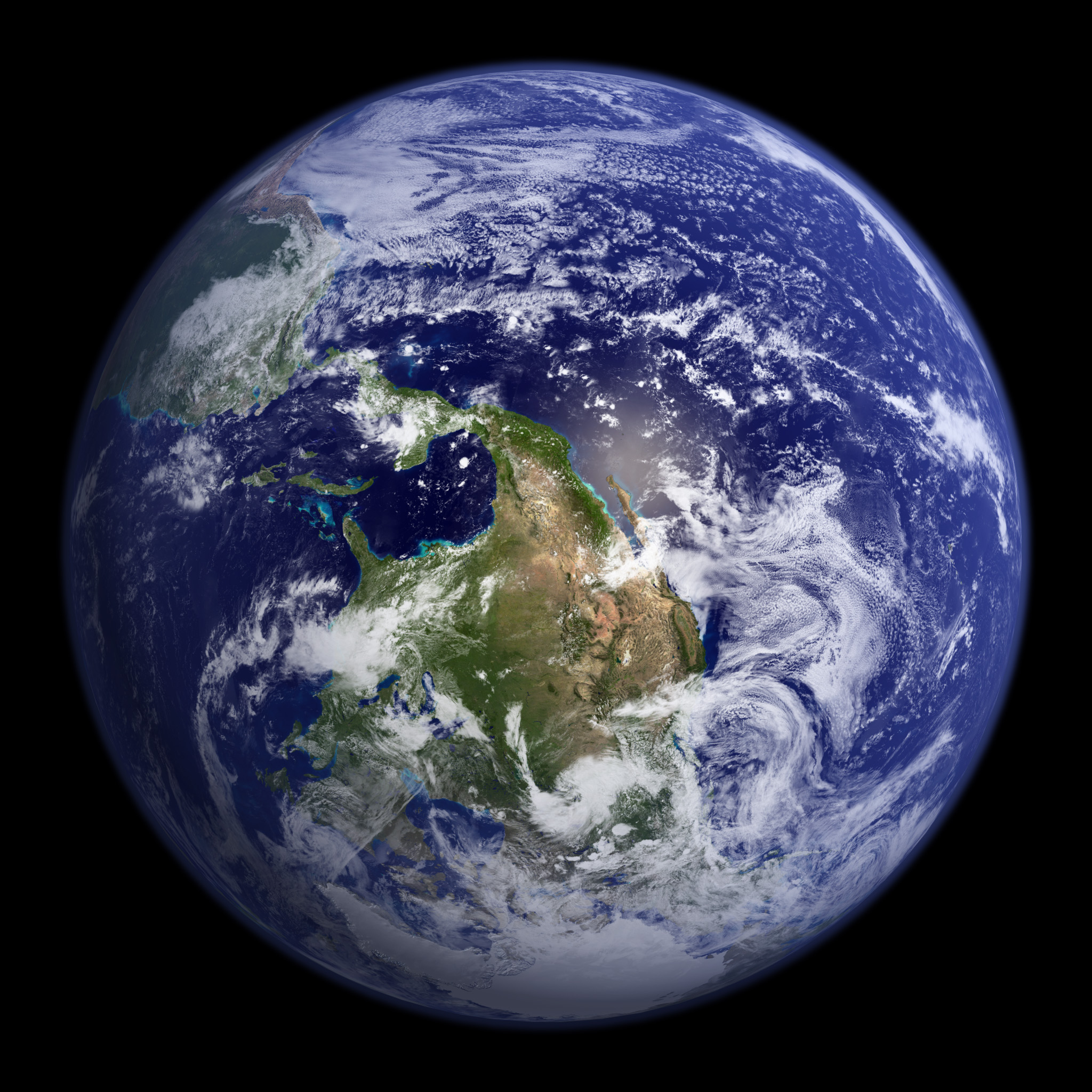
We are the pattern of empire who cannot yet change. We may adopt a new OS, new '<a href="world-dictator.html#rotg">rules of the game</a>', as envisioned by a few who prepare 'information packages', which can be done now for when 'a teachable moment' again arises, but only IF an alternative to demagogues with 'solutions' is prepared ahead of time.

Graffiti from the past, Canyonlands, Utah, USA.
Yet life remained mean, nasty, brutish and short with few living past 30 years of age. Then came the transition to Homo s. sapiens var. narrator, a multigenerational species. The females in their childbearing years did gather food near camp with the aid of their mothers and their children. And they gathered from afar as well, unencumbered by children, because they were pleased to feed their children and their children's grandparents who remained nearer the camp than they.
‘People around the globe began to remember the old ways, before humans behaved as if the Earth was merely a storehouse of resources for them.’

Say good morning, Philippines
The old males, the over-30-ones, too old to hunt the big game, hunted small game with their grandsons, thereby passing on their well-honed skills and indirectly their genes, even while the young virile males did hunt afar. The children of those who failed to honor their elders became ever fewer, and thus did Homo s. sapiens var. narrator evolve, teaching by example and by story.
‘The people looked to the landscapes around them to inform their culture and shape their ways of living.’

Elephant family, Kenya.
The more affluent became their lives, the more leisured became their minds. They painted their bodies and the walls of their caves; they carved images and adorned their minds with stories. Mutualism arose, dogs became their companions. Gourds were their bottles, bowls, canteens, musical instruments and in planting their seeds did they come to harvest them in abundance. The bottles and bowls held their paints, treasures, water, and food as about the fire their stories were told.
‘They valued the other members in the land community, giving them space enough to flourish in their own ways.’

Family planning clinic, Bangladesh, women learn about condoms, as they will be the ones to put them on.
In the world of the hunter-gatherers the tribal size was constrained, rarely exceeding ten score. Boundaries of language and custom maintained fluid distinctions between the separate parties.
‘Knowledge and tools for family planning were universally shared.’

Playing toss the baby, on Gaza beach.
Exogamous gatherings did happen which became the fertile ground for the exchange of memes as well as genes.
'People began to restrain their numbers, with smaller families becoming a key to societal well-being.’

Eight-year-old brides, Yemen.
A chief could command only a tribe, but a powerful storyteller could command a multi-tribal empire of believing minds through the dissemination of viral beliefs. Thus the first empires came to be among the hunter-gatherers and the first monuments built when many bands of kindred believers, each led by their tribal priest, came to one place to do as the Supreme Priest, the mutated storyteller, decreed.
‘Children were allowed to be children, not forced into marriages with adults.’

Kids at play.
Thus did storytellers become confabulating priests and the first trans-tribal social hierarchies engendering complex societies appear. There came to pass the planting of seeds and the domestication of animals for more of what was valued: such memes did spread and what had once been gathered came to be cultivated then gathered.
‘All the children were loved, and all were encouraged to follow their dreams.’

Model eco-farm, Chile.
The hunter-gatherers did give way to the agriculturalists and evermore did the farming ones prosper. In the valley Raulloa the hunter-gatherers, numbering nearly a hundred, did refuse the farmer's life of toil. They “worked” but two hours a day to provision themselves, leaving leisure to make art and love, to talk the talk, and survey their domain. They did sing and dance to joyous trance.
‘Development priorities began to shift from more to better.’

Farmer's market, Peru.
But they of the Eallie valley did farmers become, soon numbering over a thousand. Soon more land was needed and into the Raulloa valley did they go—their descendants to tell stories of the backward primitive savages who once lived in their valley. And thus, if not by choice, did farming spread. The granaries did fill, settled villages grew up around them, fields spread, and under the ever heavier demands of those who ruled, the servile population of warriors, artisans, laborers, believers, and women did provide service and build monuments to them.
‘Economic objectives shifted toward sustainability, sufficiency, and resilience.’

School garden, learn to minimize or eliminate industrial inputs, especially fossil fuel inputs, direct or indirect.
Tribes with chiefs became villages with chieftainships whose warriors did battle, neighbor fighting neighbor, one stronger village subsuming others, building city-states and empires within which the priestly empires of belief flourished and collaborated with the warrior chiefs to commit empire and subdue their vassal subjects. Great were the monuments built to the god-kings.
‘Actions were judged ethical or not by whether they helped sustain beauty, biodiversity, and health.’

Learn to dance with the system, Argentina.
All empires were conquered by more victorious empires or collapsed from within. The final empire drew upon the vast fossil energy reserves of the planet to build a global empire the likes of which had never been seen. Great was their self-accredited success and firm their faith in exponential growth without limit.
‘The people chose lives of quality, and sufficient time for the activities and relationships that gave them joy.’

California sunset.
Theirs was a faith so great as to be exceeded only by their ignorance of the exponential function. Their fragile grasp of reality had consequences: the first global empire, like all before it, came to pass. With no external empire to subsume it, only collapse from within could befall it, and collapse cameth.
‘Eventually people forgot the dark days when they’d sought to rule, and they honored their new relationship with the Earth.’

Whale and seabirds, Alaska, USA.
It was game over for the corporate empire but some did survive in corporeal form, yet lacked viable cultural memes to pass on. They of the Ammunition ran out and passed on. Yet viable memes there were and there were those who strove to discover them and live by them. They treasured some memes and dispensed with others, they learned from history's lessons, they worked tirelessly for a better grasp of reality, and in that grasp they survived and rebuilt.
‘Whales, unmolested, sang in the deep.’

Another tree of life, USA.
Nature has all the answers. Humans learned to listen.
‘The sounds of leaves rustling and children laughing settled over the land, and the tree of life grew toward the sky.’

A being lightly wise. Puma kitten, Patagonia, Chile.
Should we leave room for Nature? How much? Maybe five percent set aside as recreational places for humans as we do now? Or should Nature get 80% that humans may on special occasions, at least once in a lifetime, visit if they leave no trace? And if this puma, as an adult, kills and eats a human? If in Nature's 80%, too bad, so sad for some humans for a time. Nature is unkind. Humans are not on high, but must live within limits, prosperously within limits on an abundant Earth.
Afterword
Choosing A Planet of Life
Eileen Crist
ONE OF THE COMMONPLACES of environmental writing these days is a population forecast of 10 billion (or more) people by century’s end. Indeed, this projection is endlessly repeated, as if it were as inevitable as the calculable trajectory of an asteroid hurtling through space. Besides being a facile meme amenable to replication, this recurrent demographic report signals a widely shared fatalism: The coming growth has too much inertia behind it, and is far too politically sensitive, to question. At the same time, the projection reinforces a collective impression that nothing can be done to change it. Ironically, the incantation of “10 billion” seems at work as self-fulfilling prophecy, for without concerted, proactive intervention it is roughly the number to be expected; so do we hypnotize and propel ourselves in the predicted direction.
Environmental analysts have divergent responses to this particular figure (which is the latest United Nations estimate). Some are incredulous that such a number can be approached—let alone sustained—and contend that the consequences of moving in that direction will be disastrous; a catastrophe or combination of catastrophes is bound to derail professional demographers’ expectations, and humanity (after enduring much suffering, or perhaps experiencing some kind of wake-up call) will stabilize at lower numbers. But other environmental observers, describing themselves as more optimistic, are endeavoring to figure out strategies that might sustain the expected billions. They hope that with the right developments and innovations in crop genetics, irrigation technologies, fertilizer application (“responsible nutrient management”), efficiency gains (including closing “yield gaps” and curbing food waste), requisite energy transitions, and other advances, the planet might feed, provide water for, house, educate, and medicate—at an acceptable standard of living for all—the coming 10. There is reason to wager, they maintain, that humanity might succeed at the task, since people are resourceful, determined, and apt to get out of a tight spot even in the nick of time.
Thus where some see disaster on the immediate horizon, others submit that with another techno-managerial turn of the screw humanity might avert grim penalties to population growth. Yet despite considerable divergence in outlook, all environmental analysts agree that (even as our global numbers continue to climb) we face grueling challenges, each immense in its own right but dizzying in their unpredictable synergies: biodiversity destruction, climate change, freshwater depletion, ceilings on agricultural productivity, all manner of pollution, topsoil loss, and ocean acidification to mention some prominent examples.
Rather than taking sides between the forecast of impending tragedy versus optimism about “feeding the world,” there is another way to tell the near future’s story. On that telling, the issue is not whether it is possible for 10 billion people to eat industrial food, commune with iPhones, and make a decent living on planet Earth (an outlying scenario, in my view, but perhaps stranger things have happened in the universe). The point to focus on instead is that a world of so many billions does not, in any case, turn out well: Because such a world is only possible by taking a spellbindingly life-abundant planet and turning it into a human food plantation, gridded with industrial infrastructures, webbed densely by networks of high-traffic global trade and travel, in which remnants of natural areas—simulacra or residues of wilderness—are zoned for ecological services and ecotourism. In such a world, cruise ships with all-you-can-eat buffets will circumnavigate seas stripped of their plenitude of living beings, on waters awash with plastic refuse decomposing into bite-sized and eventually microscopic particles destined for incorporation into the worldwide food web.
What’s more, a sustainable geopolitical status quo of 10 billion consumers will require comprehensive mega-technological support: offshore dike projects; more dams (already, according to a 2009 Yale Environment 360 report, being constructed at “a furious pace”); desalination plant construction with accompanying transport infrastructures; scaling-up of industrial aquaculture; genetic modification of crops and animals to adapt to climatic and consumer demands; cultivating so-called marginal lands to grow grasses and other plants for biofuels; the spread of the fracking scourge (globalizing “the oil and shale-gas boom”); climate engineering at global and regional scales; and the spread and normalization of factory farms. (The Economist praises the efficiency of the latter institution over traditional husbandry, calling it—in apparent oblivion of the term’s Orwellian malodor—“the livestock revolution.”)
In such a world corporations are likely to continue reigning supreme, for the coming technological gigantism (not to mention the escalation of mass consumption) will make them indispensable. Corporate expertise and products will be required to keep the biosphere on permanent “dialysis,” to borrow a fitting metaphor from James Lovelock. Corporations will continue generating enormous revenues, via tax-based subsidies for their “public works” and by catering their products to huge numbers of people. (Any doubt regarding the relationship between private-sector opulence and consumer population size is dispelled by taking note of the correlation between today’s wealthiest companies and their bulging middle-class client base. Indeed, capitalism is quite partial to the twin perks of population growth: cheap labor and mass clientele.) Whatever relatively natural places remain will be slated as the real estate and vacation destinations of the most affluent—as they are to a large degree today. But regardless of whether or not corporations and the gilded class entrench their reign, everyone (including the rich) will be wretchedly dispossessed, hustling for happiness on a planet degraded to serve a bloated, user-species.
In such a world—whatever it augurs for humanity, which seems bleak to say the least—the exuberance of Life will suffer a tremendous blow. This Life is barely hanging on in the present world; it will not survive a world that is a magnified version of the one we live in. I use the word Life, with capital L, to mean something akin to what life scientists call “biodiversity”; unfortunately, though, the latter term is often mistakenly conflated with numbers of species on Earth. While numbers of species are a significant dimension of Life’s fecundity, Life is far greater than a total species inventory—as extravagant as that inventory may be. Life is bewildering in its creative expressions, its beauty, strangeness, and unexpectedness, its variety of physical types and kinds of awareness, and its dynamic, burgeoning, and interweaving world-making.
Earth’s story is about Life, whose phenomena emerge in each place uniquely and over the whole planet diversely, always contiguous and interconnected at local, regional, and global levels. Life fills niches and also creates them; life-forms accommodate other life-forms via niche construction and by their edible, breathable, or otherwise consumable waste by-products (including, ultimately, their own corpses). With the exception of mass extinction events, Life is always enabling more of itself to surge. There’s ceaseless feeding on one another and on each other’s by-products, as well as a co-molding of a physical and chemical environment in which more life is supported to flourish. Importantly, a vast array of life-forms—from all five kingdoms of life—are involved in building soil, which is not only Life’s foundation but itself a living phenomenon. Through organism-mediated processes, the land brings nutrients to the seas, and the seas (through organism-mediated processes) return nutrients to the land. Forest canopies feed the life in the understory, and life in the forest understory feeds the trees and all who live in their canopies. Beings in the seas’ upper layers sustain the strange menagerie of abyssal creatures, and organism-created nutrients in the depths well up and nourish fellow beings in the upper zones.
In the “interdisciplinary” dance of Life—where phenomena of physics, organismal biology, biochemistry, behavior, awareness, and chaos jostle in established and spontaneous patterns—Life creates abundance. For example, hundreds of millions of eggs wash to the sea’s edge, feeding multitudes before a fraction develops into the organisms that spawned them. Prey species proliferate wildly in response to the pressure of their predators—incalculable numbers of marine creatures once sustained the tens (and perhaps hundreds) of millions of sharks and whales who existed before their concerted extermination began. Enormous, ever-on-the-move ungulate herds do not decimate the lush grasslands that feed them, but on the contrary the grasses grow because of them, and the animals and grasses (with other life-forms) together create more soil. Freely moving, pristine rivers teemed with fish even in recent history. Great flocks of birds graced skies, wetlands, and seashores. And land, sea, and air animal migrations have not only told the seasons’ stories but contributed to bringing the seasons into being. The intermingled manifestations of Life on Earth—when Earth is allowed to manifest them—have no finitude.
As for a popularized claim that, alas, life is all about struggle, competition, and selfishness, it is best to turn away from such claptrap: for it is only within a planet of Life, a Life-world, that phenomena of struggle, competition, and selfishness arise and pass away in their relevant contexts. The Life-world itself is far more encompassing in the kinds of phenomena it manifests and cannot be reduced to a one-dimensional schema. Except for the one thing we know in the marrow of our bones and in our hearts: that the Life-world is All-good.
And here’s the crux of the matter: Humanity can choose to live on a planet of Life instead of haplessly plunging toward a human-colonized planet on dialysis (“wisely managed”). To live on a planet of Life it is necessary to limit ourselves so as to allow the biosphere freedom to express its ecological and evolutionary arts. For that, we in turn need to cultivate the breadth of imagination to give the concept of freedom wider scope—pushing its territory beyond the sheath of human exclusivity. In the name of a higher freedom that encompasses Earth and its entire community of beings, we can choose to let the world be the magnificence and wealth it was and still can be. Borrowing words from nature writer Julia Whitty’s Deep Blue Home, this path is about cultivating intimacy with the natural world, taking as our lover the way things really are and finding our way home.
But the wisdom of limitations—of our numbers, economies, and places of habitation—is rarely entertained in mainstream thought for what it is: the elegant way home and the surest means for addressing the deepening (and likely self-endangering) problems of extinctions, ecosystem destruction and simplification, rapid climate change, freshwater and topsoil depletions, as well as (relatedly) mounting concerns about “feeding the world.” The path of limitations is rarely entertained, for it is assumed to be unrealistic and thus politically inexpedient. But knowledge of the multiple stresses on the biosphere, along with an understanding of the adverse, volatile ways these may compound one another, yield the recognition that drastically scaling down the human project is the most realistic approach to imminent catastrophes. If political expediency cannot see that, then political expediency and those who speak for it need to be deposed so we can get on with the real work.
IN THE MEANTIME, even as the available option of limitations is bypassed as ostensibly unrealistic, the prevailing question voiced with increasingly shrill urgency is: Can the Earth feed 10 billion people? By most expert accounts, because of population growth along with the rise of meat and animal product consumption, food production will have to double by 2050 to meet demand—and the big question is: Can it be done? There is an effort under way to figure this out, by experimenting in research and development labs, working in research stations, and analyzing agricultural databases. And because it is well known that most (and certainly the most fertile) arable lands are already in cultivation, and that the areas where wild creatures live are already pushed to their limits, the effort to increase food production (to double it in about forty years and triple it by century’s end) is invariably escorted by the caveat that it must be done without “further damage to biodiversity” or “taking over more uncultivated lands.”
Since at least the early 2000s, this “ecologically correct” sound bite has been activated in environmental writings, journalistic reports, and corporate web pages: We must produce more crops (for food, feed, and fuel), as well as more meat and animal products, by means of careful planning and management, with minimal additional ecological impacts. Oddly, the latter disclaimer is stated as if tropical forests are not today giving way to soybean monocultures, cattle ranches, and oil palm, sugar, tea, and other plantations; as if large-scale acquisitions recruiting land in Africa and elsewhere are not already under way in the name of “food security”; as if marine life is not being chewed up by the industrial machine; and as if rivers are not today so taxed by damming, extraction, diversion, and pollution that the crisis of freshwater Life may well be the gravest extinction site on Earth (a big nonevent as far as the public and its elected officials are concerned). Despite all these things happening already today (in a global economy of 7.3 billion), those at work to figure out if food production can be doubled and eventually tripled (to serve a world of 9, 10, or more billion in an intensified global economy) always add that it must be done without additional ecological damage. When we encounter such pious declarations of intent we’d do well to recall Hamlet’s sardonic response to the question, “What do you read?” Words, words, words.
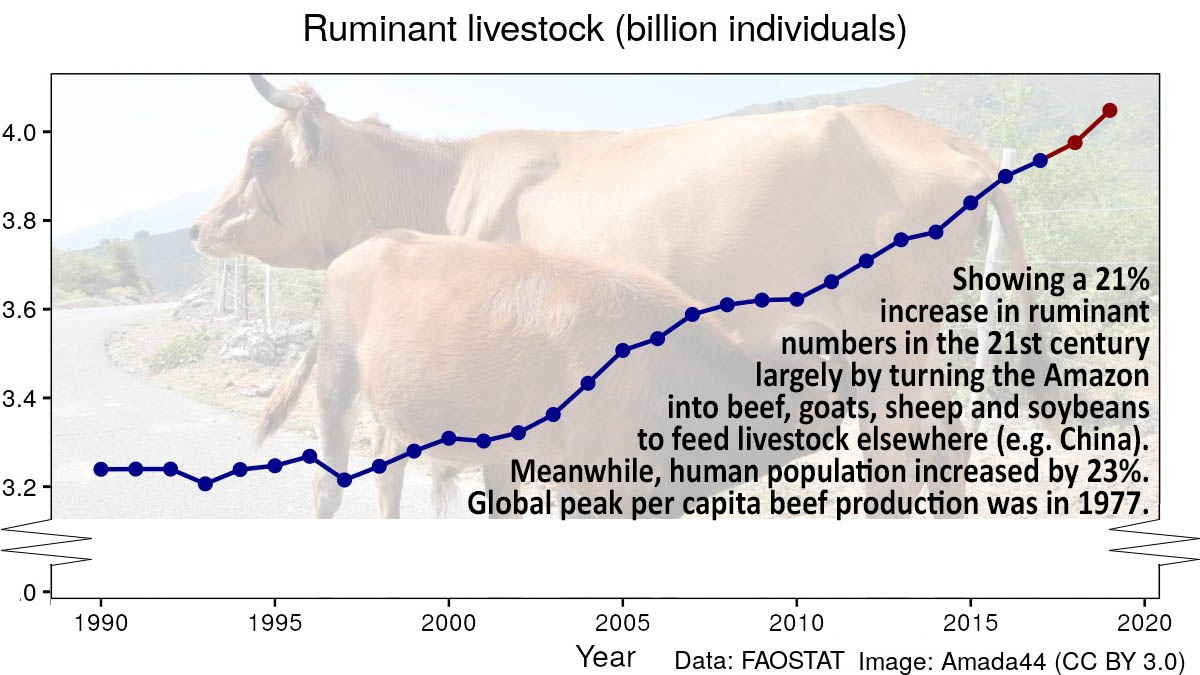
Those endeavoring to figure out how to increase food production without harm to nature may well be sincere; but they appear to be in the throes of wishful thinking. For even if for a moment we ignore the fact that present-day industrial agriculture, industrial aquaculture, and industrial fishing constitute a mounting planet-wide disaster—which goes largely unremarked only because it is nigh equaled by planet-wide unawareness—simply saying that we need to grow more food without further ecological destruction is not going to stop hungry and acquisitive people from taking what they need and think they need: clearing more forests and grasslands, moving up slopes, overgrazing pasture and rangelands, decimating sea creatures, replacing mangrove forests with shrimp operations, or killing wild animals for cash or food.
Even so, the most pernicious thing about this formulaic mandate-plus-caveat—grow more food, don’t damage more nature—has yet to be stated: namely, that it insinuates that the current damage our food system inflicts is acceptable and irreversible. Hands down, however, food production is the most ecologically devastating enterprise on Earth. (More on this shortly.) Yet mainstream discourses do not tend to flag the food system’s earth-shattering demands on the biosphere. Instead, the current ability to produce ample amounts of food—enough for all, including those not yet at the table—appears to merit a different cluster of conclusions: that humanity’s food-producing capacity is not constrained by natural limits; that we may be able to stretch that productivity even further via managerial and technological innovations; and that Homo sapiens is unlike all other species, who are checked by nature whenever their numbers exceed the capacity of the environment to sustain them. Indeed, the belief that humans are exempt from any natural “carrying capacity” is a cornerstone of the mission to continue expanding food production to support the coming billions.
The demographic idea of carrying capacity refers to the maximal population of a species that its environment can support, without that environment becoming too degraded to support the species in the future. If a species, for some reason or other, does exceed its carrying capacity—with numbers mounting beyond what the natural setting can sustain—the consequences are implacable: starvation, disease, and death follow, until the population is brought back within a supportable range. While this natural law of the relationship between population size and sustenance appears broadly applicable in the animal kingdom, here’s the key point regarding human exemption: It is widely believed that history has shown that it does not apply to us.
In the early nineteenth century the Reverend Thomas Robert Malthus, in his Essay on the Principle of Population, endeavored to apply the logic of natural limits, and the severe costs of transgressing them, to humanity. He predicted that because population grows faster than food production, human numbers would outstrip the available food supply and people would reap the woes of famine, disease, and war. But the two centuries following his analysis did not see a human population crash, as food production kept up with mounting numbers of people; in fact, during the last half of the twentieth century the rate of food production even outpaced the rate of population growth. So Malthus’s thesis came to be viewed as repudiated, and the doctrine of human exemptionalism from natural limits received a victorious boost.
Indeed, the foreboding forecast that the human population would inevitably exceed the amount of available food to (at least in principle) feed everyone did not come to pass. It was refuted by converting Earth’s most fertile lands for agriculture (after being denuded of their Life-rich forests, grasslands, and wetlands); by taking over extensive swaths of natural areas for domestic animal grazing; by appropriating half the world’s freshwater—with the biggest share diverted for agriculture; by applying enormous quantities of synthetic chemical and fertilizer pollutants; and by plundering untold numbers of wild fish. In other words, the prediction of human tribulation in the wake of unsustainable numbers was refuted by means of the near conversion of the biosphere into a human-food pantry.
The seemingly “winning argument” that humanity is uniquely capable of keeping food production apace with (or ahead of) demographic growth reveals a profound lack of insight into the bigger picture of what stretching our food-producing capacity has really portended. It reveals an inability to appreciate—or even to entertain as a passing thought—that human carrying capacity (how many people the Earth can support) has been extended not simply because we are so clever at manipulating natural processes and inventing stuff, but through forcefully taking over the carrying capacity of other life-forms and, in the process, wiping them out regionally or globally. Moreover, the exemptionalism thereby displayed—that we are not bound by natural conditions like other species—beyond the superficial “fact” that it seems to be, serves conveniently as an ideological handmaiden of human expansionism. For what the doctrine of exemptionalism tacitly conveys and inculcates is that because humanity is so special by comparison to all other creatures, it is proportionately that much more entitled; and thus the acts of war on the natural world that undergird our expansionism (for food production in particular) become unrecognizable as acts war.
The question of whether ultimately there are (or not) natural limits to our food-producing ability, which will (or not) check human demographic growth, is not so interesting; the experiment required for the final verdict is an ugly one either way. Instead, I along with other deep ecologists invite consideration of something far more enticing: that by choosing the wisdom of limitations and humility, humanity can reject life on a planet converted into a human food factory and allow for the rewilding of vast expanses of the biosphere’s landscapes and seascapes. To drive home why the latter option is much more beautiful (as well as more prudent), I turn to the highlights of how food production is contributing the lion’s share of anthropogenic ecological havoc.
Cropland uses a portion of the planet the size of South America, while land for grazing farm animals eats up an even larger share—an area the size of Africa. Effectively, humanity has seized the temperate zone for agriculture, wiping out all or most former nonhumans and ecologies in order to mine the soil. (“How did they get on top of our soil?”) The raising of tens of billions of domestics has exacted the eradication or displacement of wild animals from their former habitats, the persecution and slaughter of carnivores viewed as threats to farm animals (themselves reduced to being “live-stock”), and the erosion and degradation of lands from overgrazing. And the alternative to grazing—The Economist’s so-called livestock revolution—constitutes a pollution nightmare and an egregious violation of basic decency in the treatment of animals. (Yet factory farming is a production method that today both supplements grazing and is swiftly spreading.) Regarding the seas, the human food factory has demanded that 98 percent of them be fishable. This reign of terror for marine species is partly underwritten by an institution called, without the slightest irony, “the freedom of the seas.” As a consequence, only about 10 percent of the big fish are left and there is no end in sight to the demand on everything from krill to sharks. In the literal and figurative industrial mowing of the world’s oceans, the countless beings who suffer and die in the name of mass consumption and profit are referred to as “catch” and “bycatch.”
Furthermore, food production contributes at least 30 percent of anthropogenic greenhouse gases; the latter are driving a climate change episode that—barring the energy transition everyone is still waiting for—could egg the planet to an average temperature increase in the ballpark of the Paleocene-Eocene Thermal Maximum. (If you have never heard of the Paleocene-Eocene Thermal Maximum, please wiki it.) The food factory—the one often touted as a miracle of ingenuity bestowing the badge of exemptionalism on Homo sapiens—consumes at least 70 percent of the freshwater taken from ecological watersheds, thus depriving the nonhumans who called that water home, and killing or driving them to extinction (in many cases even before we could meet them). Food production drives soil erosion and desertification, giving rise to ocean-spanning dust storms. It also depends on constant applications of pesticides, herbicides, and other biocides: Indeed, many consumers and growers, alike, have been duped by corporate salesmen (and their government allies) into believing that it is normal and necessary to poison the biosphere for the purpose of producing human nourishment. Streams, rivers, lakes, wetlands, and estuaries around the world are fouled or deadened by agricultural runoff and farm animal excrement—all just “how things have to be” if we are to eat.
This unprecedented impact on the living world allows for the production of so much food as to seemingly demonstrate our ability to feed billions and, with some additional resourcefulness, perhaps feed even more. From a deep ecological perspective, however, the unprecedented ecological impact demanded for the production of so much food has demonstrated our capacity to take a magnificent planet—second to none in the known universe—and turn it into, or use it as, a human feedlot, and then muster the arrogance to call this act of pilfering and degradation an “achievement.”
In his latest work, Countdown, author Alan Weisman sums our current Green Revolution food system as involving “fossil fuel gluttony,” “river fouling fertilizers,” “dependence on poisons,” and “monocultural menace to biodiversity.” So how is the amount of food we produce to be doubled or more without additional damage? Remarkably, one of the strategies being considered is to extend the productivity of Green Revolution methodologies to places they have not yet reached. Indeed, as the global population continues to grow, spreading the Green Revolution in order to “feed the world” will be the likely tack of the present-day policy framework, which is beholden to (in no particular order) corporate interests, institutional inertia, and acute anthropocentrism. Predictably, the call to extend the Green Revolution is cushioned by all the ecologically correct pleas for wiser uses of water, more efficient application of fertilizers, prudent deployment of pesticides and herbicides, inclusion of no-till agriculture, and so forth: an appeal to “greening” the Green Revolution that not only is politic but also constitutes necessary retooling in a time of potential phosphate shortages, water wars, and fossil fuel price hikes. But making a destructive food model more efficient does not the model make good. At best it yields a world—as Rachel Carson so cuttingly put it—that is not quite lethal.
I HAVE DIGRESSED INTO the ecological discontents of humanity’s current food production in order to submit the following: that the social mission to double or triple it is madness. But the proposal to move deliberately in the direction of more than halving our global population, and simultaneously radically changing our food system, is not.
If women (and their partners) today were voluntarily to choose having an average of one child (meaning many would choose none, many one, and others no more than two), then the world’s population—instead of climbing toward 10 billion—would stabilize and then begin descending toward 2. Were the current generation of childbearing women to embrace this voluntary mandate for the sake of a living planet and the quality of life (perhaps even survival) of future people, how could this possibly be construed as a sacrifice? It is an intelligent and compassionate action that many people would be willing to take if they became properly informed and knowledgeable about the planetary emergency we are in. As for those who hear “coercion” in such a proposal—and respond by defending “human reproductive rights”—they should at least take a moment to acknowledge a fact that population experts are well aware of: that some of the grossest violations of human rights are perpetrated in societies that force women to start (involuntarily) having children when they are barely beyond childhood themselves, and to continue reproducing until their bodies give way or they are no longer fertile. The population question is indeed pressing in countries where patriarchic, polygamous, fundamentalist, and military cultures are keeping women handcuffed and thus adding roadblocks to a restored future.
Yet population size is not strictly a “developing world” problem but a global issue and task. One of the most effective and tangible ways to address climate disruption, as well as to curb the excessive consumption of everything (including food), is to move toward the substantial reduction of the number of consumers worldwide, meaning both the populations of the developed world and of “emerging economies” in Asia, Southeast Asia, and Latin America. Concerning the developed world’s responsibility in addressing overpopulation, it is also reasonable to insist that monetarily affluent nations and institutions should provision the financial backing and expertise for bringing state-of-the-art reproductive health services around the world—including their home territories. For example, half the pregnancies that occur in the United States are unintended—a statistic that speaks to a social, cultural, and educational failure not just to a weakness of human nature. The important work of demographic expert Robert Engelman has shown that if unintended pregnancies (everywhere) were reduced to a humanly possible minimal, this would lead to a reduction in both population size and numbers of abortions.
Wherever concerted policies to lower birthrates have been implemented, birthrates have declined with alacrity. By concerted policies I include the following: prominent, unembarrassed public discourse and campaigning on the issue; prioritizing the education of girls and women; establishing reproductive clinics that are accessible and affordable to all; training large numbers of health workers for grassroots education and support; making marriage counseling widely available; bringing sex education to school curricula; providing the full array of modern contraceptive methods for free or at minimal cost; and instituting legal, safe abortion services. On the latter controversial point, it needs to be added that implementing all the above measures would significantly lower the number of abortions worldwide as well as the number of deaths from slipshod, illicit abortions.
The combination of heightened public awareness, the empowerment of women, and the availability and affordability of up-to-date reproductive information and services yields swift declines in birthrates. Such declines have nothing to do with the imposition of some top-down coercion; rather, they follow from a straightforward bio-cultural cause: that the vast majority of women, when they attain free choice, rarely want more than one or two children, because numerous offspring are hard on the female organism and also take time away from other personal pursuits. As the peerless work of population analyst Martha Campbell has shown, this natural female propensity for few offspring surfaces straight away, once barriers to reproductive services are removed and freedom of choice becomes reality. If, additionally, today’s fertile women were presented with the beautiful and compassionate mandate to help alleviate the world’s most pressing ecological and social problems, then the average fertility rate might well shrink even further. Does this sound unreasonable? Certainly not more so than the unthinkable mission to double or triple food production, which augurs a colonized and ecologically impoverished biosphere, haunted by scarcity, and possibly marauded by nasty social mayhem to boot.
Bringing our global population down to, say, 2 billion will not be the magic bullet that solves every ecological and social problem. But we can rest assured that it will be a magic bullet for doing so. Significantly lowering our numbers facilitates a more harmonious way of life on Earth in at least two ways. First, many problems—from traffic jams, to health care budgets, to climate change—become more tractable as the dimension that magnifies them is curtailed. Lowering our numbers, in other words, helps downscale harms: For example, there is a yawning difference between a world of 1 billion vehicles (causing damage enough) versus a world of 2, 3, or 4 billion vehicles (the direction we are headed). There is also a vast difference between urban settlements beautified and balanced by an abundance of open, green spaces versus the nightmare of unending road, housing, and strip-mall construction to serve the glutton of sprawl.
The second way in which significantly lowering our global population supports the turn to what we might call “beautiful human habitation” involves food production: A lower population will make possible the radical transformation of an industrial food regime that is currently bludgeoning ecologies, wild and domestic animals, and human wellness. (Four leading causes of disease and death are linked to industrial food, and especially to the consumption of mass-produced, low-quality animal products: heart disease, diabetes, cancer, and stroke.) The whole world can indeed be fed: with organically grown, nutritious food; by prioritizing local and regional food economies; without mining, polluting, and dispersing the soil but by caring for it and building it; through diversified, smaller-scale farm operations modeled on natural ecosystems; in lovely and fecund interfaces with wild nature (“farming with the wild”); and by forsaking high quantities of animal foods, for the occasional consumption of such foods produced with due consideration to ethical and nutritional values. This wholesome turn only becomes possible if our global numbers are far lower than today’s.
We need an authentic green revolution. Instead of holding demographic growth as given, and a biosphere-wrecking food system as normal, let’s imagine what the world could look like if we actively renounced both. Such a world would be dramatically more beautiful and sane following expansive rewilding—with abundant food, ecologically and ethically produced; with streams, rivers, lakes, and estuaries returned to being living waters; with deforestation halted and grassland ecologies reinstated; with the extinction crisis arrested and seas thriving again with Life; and with climate change made more manageable via carbon-sequestering forests and grasslands and decelerated emissions. If all these things can be achieved, what is keeping us from pursuing such a world? Indeed, what is detaining us from creating a civilization in harmony with wild Earth?
Crist
Note: Overpopulation is not a global issue. When the average bite of food on your fork is not transported 1,500 miles (2,400 km), it will again be a local issue, UNLESS surplus population can emigrate (which can then make it a global issue), in which case conquest and empire-building will continue to be selected for. Lord Man, pathogen on high for a time, will keep on keeping on unto extinction (of Lord Man if not the genus Homo). The intelligentsia's failure to tell better stories is fatal. Making the planet 'safe' from empire-building is a global issue, and an apolitical United Federation of Watersheds (aka New World Order, naturocracy) in some form by some name is needed. We are playing a global high-stakes endgame. Wake up hu-mans.
'For the first time in history a conviction has developed among those who can actually think more than a decade ahead that we are playing a global endgame. Humanity's grasp on the planet is not strong. It is growing weaker. Our population is too large....' — Edward O. Wilson, Half Earth: Our Planet's Fight for Life 2016
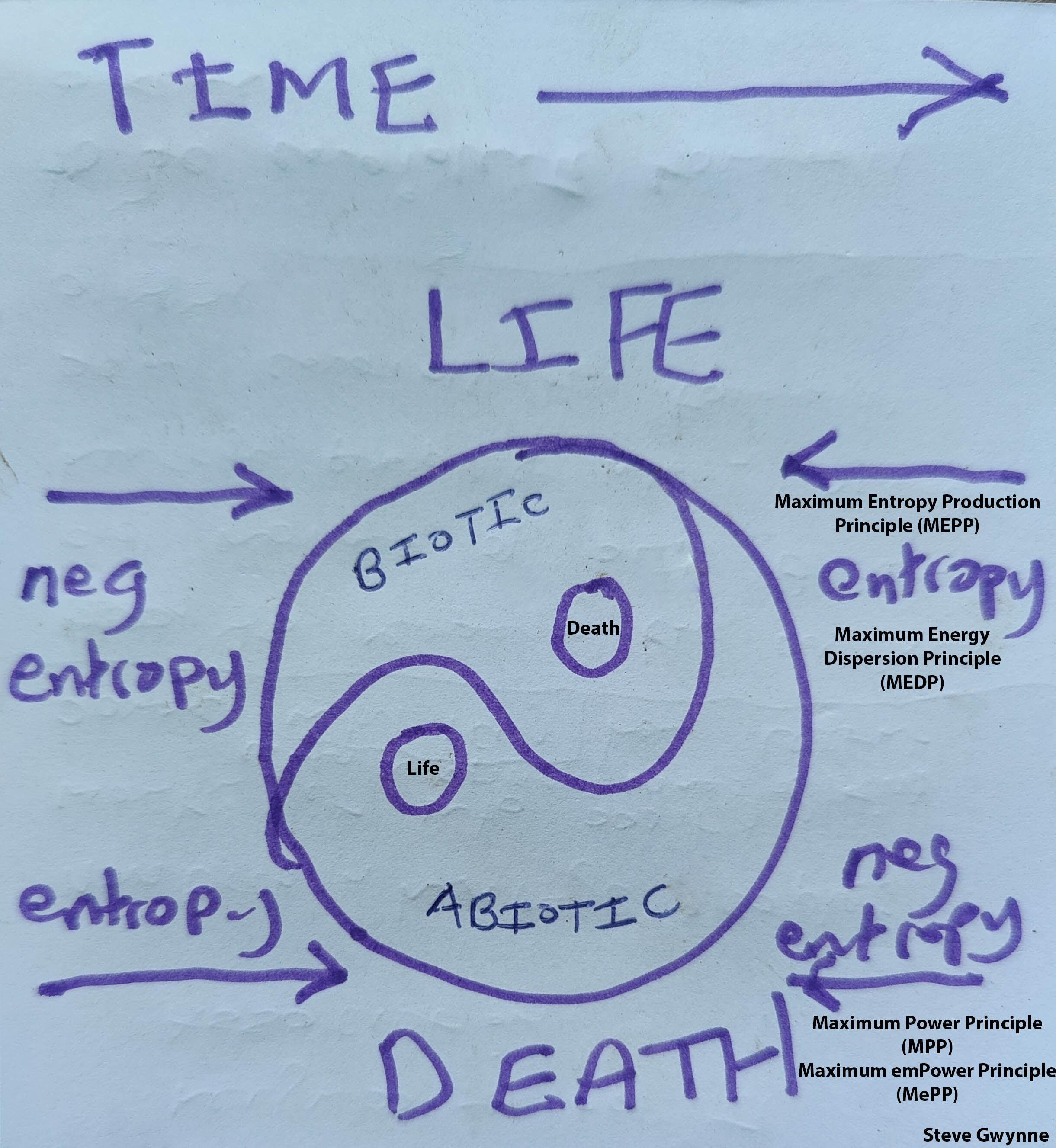
Subnote:
Politics is to die for. The Far-Left views all Jews as 'Zionists' (or their supporters) and the mostly Christian Far-Right has never been Jew-lovers though Far-Right Jews are okay. The history of the concept 'cultural Marxism' has morphed over the decades, but the underlying narratives have not. The Nazi narrative was pro-family and celebrated national [tribal] identity. It supported foundational conservative values, and Marx saw the family as foundational to the capitalist/nationalist system and sought to dissolve/alter it (it is biological, however, not Western capitalist, in origin). He also wanted to eliminate nation-states (tribes) to create one world order via a dictatorship of the proletariat (sort of as I do but without the proletariat part). He and supporters were not mainstream and saw all progressive social democrats as fascists because they stood in the way of creating a dictatorship of the proletariat (i.e. they were not Left of center enough). The morphing of cultural Marxism is that a hundred years ago the buzzword was 'class'. Now the Left has morphed it to 'race'. Otherwise Left and Right narratives are about the same as the values and political system of 'for' and 'against' thinking hasn't changed. 'Red' used to be Left, now it is Right. Both might be equally scary to sane humns (if there were any). When the Right dominates again in the USA, expect a big 'Blue Scare'.
Historically both Mao and Stalin, who each killed more humans than Hitler and Americans put together, were staunch anti-fascists (aka firmly against Right-wing types, i.e. 'the enemy' as are the fascists who firmly oppose their enemy, the Left). Functionally the only difference, apart from ideology/values, between Stalin and Hitler was Stalin won and Hitler lost. A hundred years ago the Far-Right claimed that the cultural Bolsheviks (today's cultural Marxists) were mostly Jews following the Protocols of the Elders of Zion who wanted to destroy the Western family and its religion too. Words change but the values don't as the Right and Left persist, though their stories (ideological certitudes) do change (overtly).
If you don't follow the changing narratives it is not possible to understand current narratives as old stories that are delusional on both sides. Politics and political stories create factions that end up killing each other. Any struggle for power generates, selects for, two main factions that polarize all issues despite occasional periods of bipartisanship during times of abundance for all. Neither side struggles to iterate towards 'truth' or having some grasp of reality, no not Left nor Right. Both are delusional storytellers, pathological systems, pathogens swimming in a sea of error, ignorance, and illusion as do those who seek to iterate towards the truth. The difference is those who seek to iterate towards 'truth', e.g. the science-scholar types who would rather know than believe, tend to converge over time by actually trying to listen to Nature who tells one story. We should consider that our only hope may be to stop listening to human prattle.
My latest zeitgeist statement is shorter: Listen to Nature. Tell better stories. Live long and prosper. Caesar's was even shorter: 'Vini, vidi, vici'.
Having better words/concepts does help, so instead of ill defined and undefinable (because polarized by political-speak) 'cultural Marxism', I'll agree 'neo-Marxism' is better. And no, Adam Smith wasn't entirely wrong and Marx wasn't either. I would even confess Marx's concerns and proposed solutions are of greater interest. Neither, however, were 'thinking in systems' as Donella Meadows urged. If we fail to listen to Nature, a pox on all our houses.
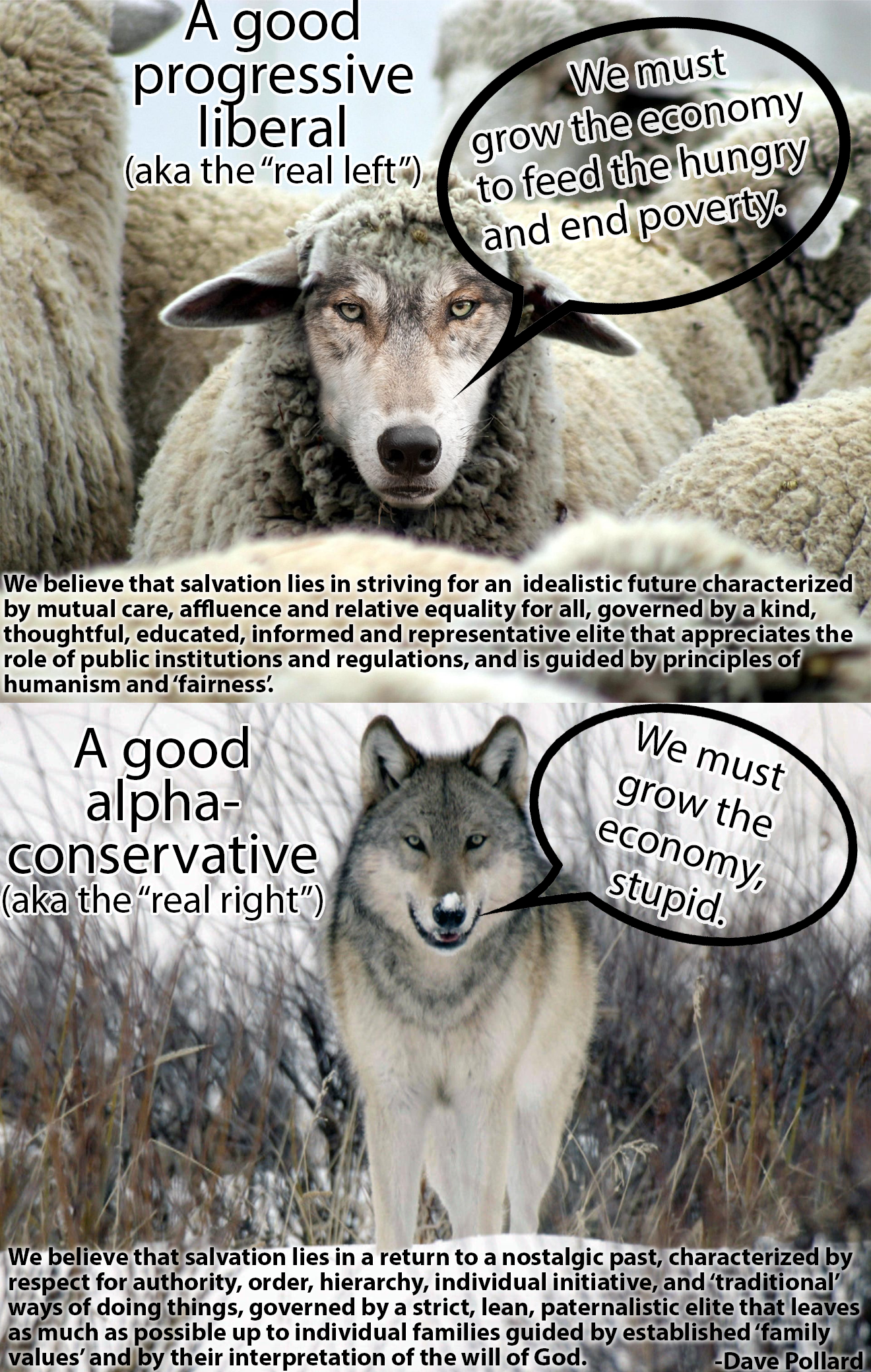
I used to be apolitical, but I've become anti-political for some reason.
To destroy the political system (all), destroy our belief in belief, one mind at a time.
There are BAU enthusiasts and BAU enthusiasts in sheep's clothes who clamor for a Green New Deal or even 'Degrowth NOW!', who endlessly obfuscate. In my youth there were Establishment enthusiasts and Counterculture enthusiasts in tie-dye sheep's clothes with flowers in their hair who preferred different drugs.


LORD [EXPANSIONIST] MAN OF THE BELIEVING MIND
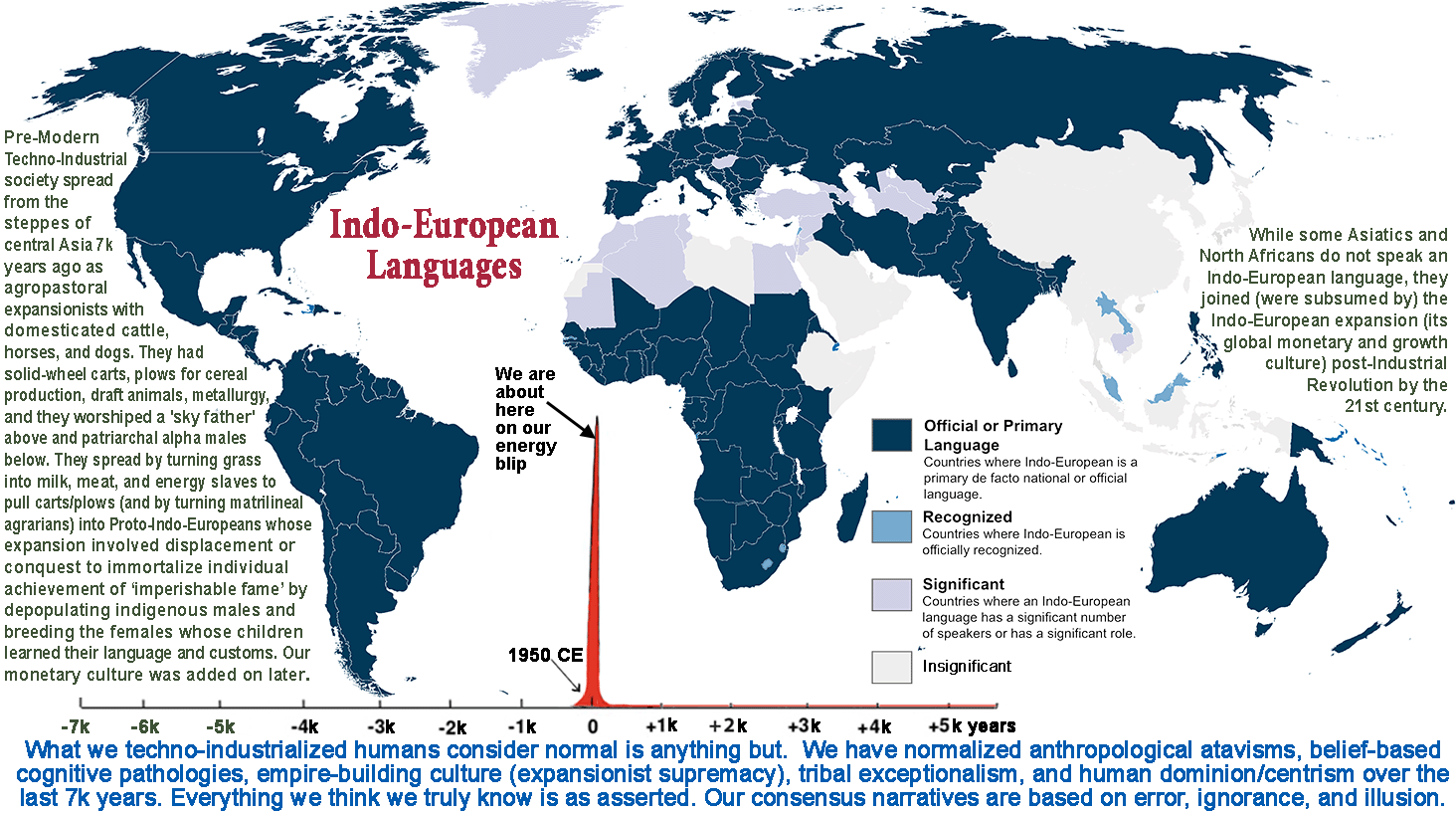
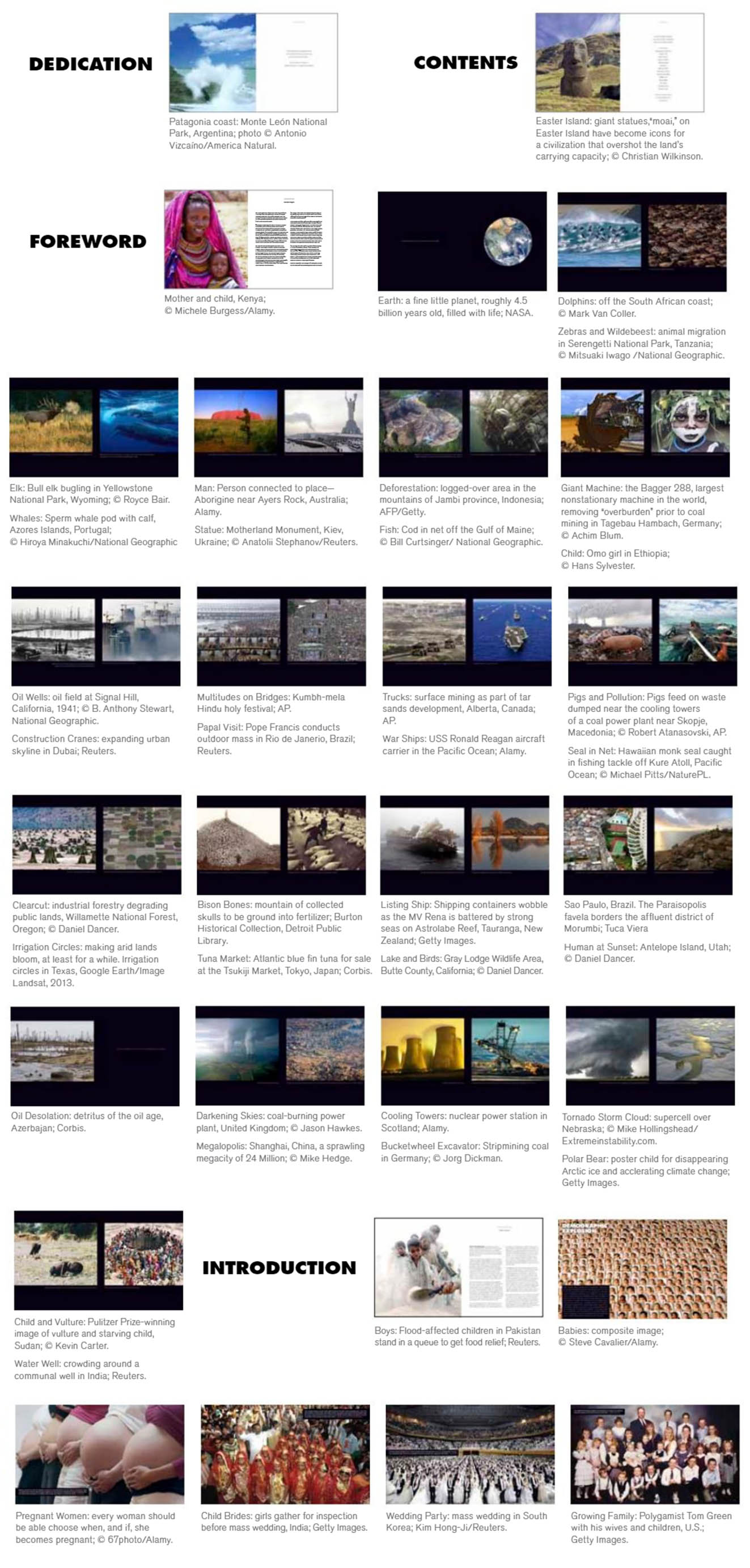
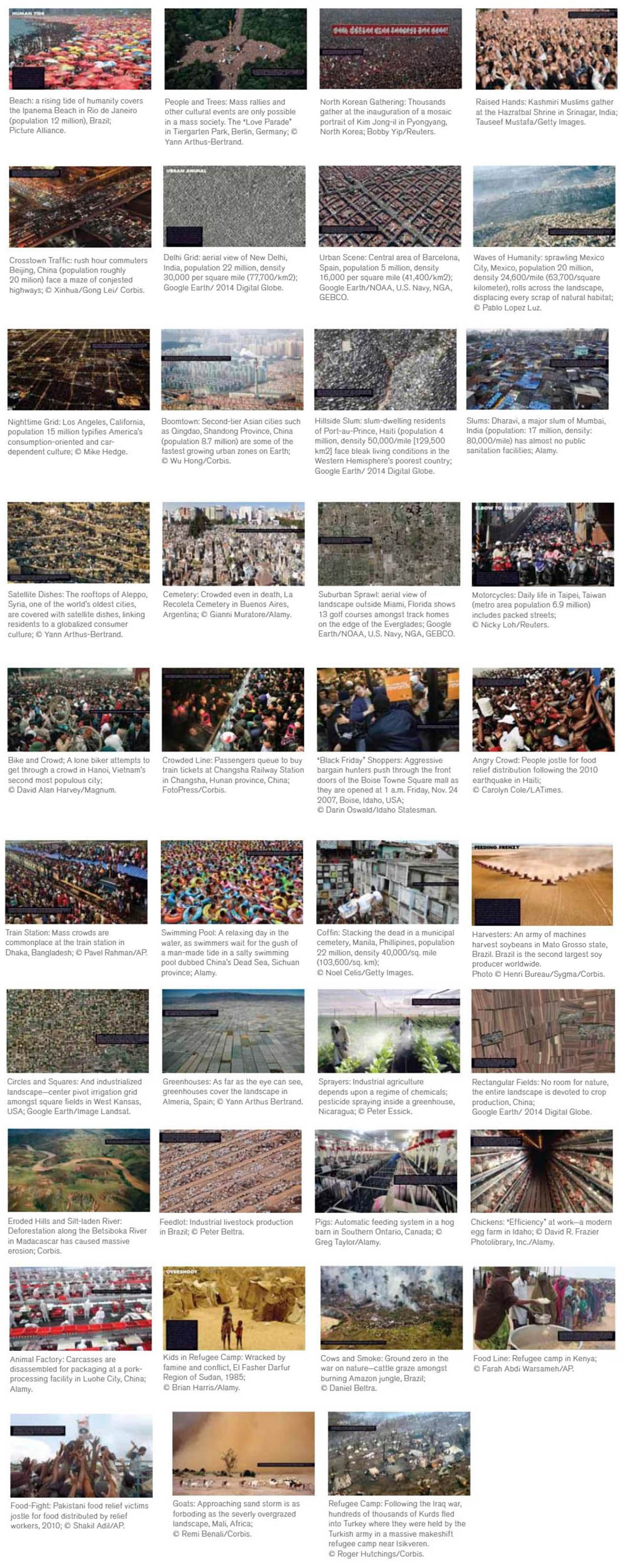
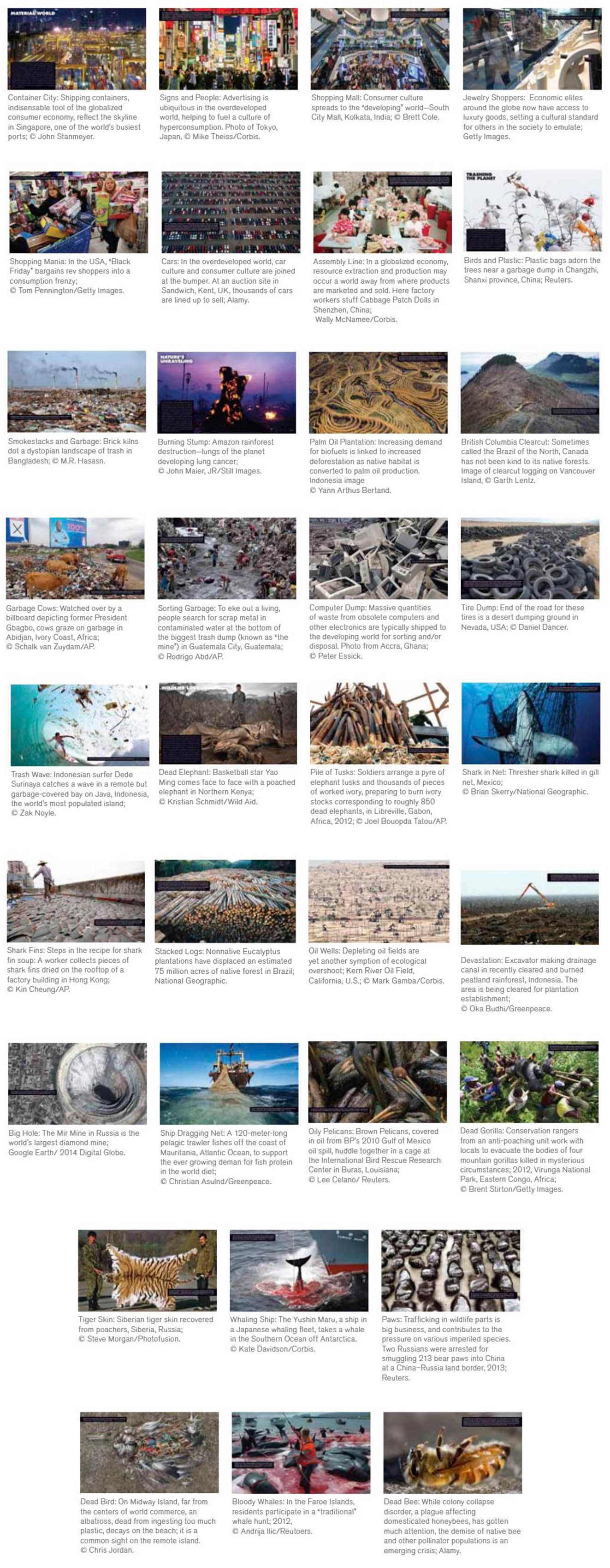
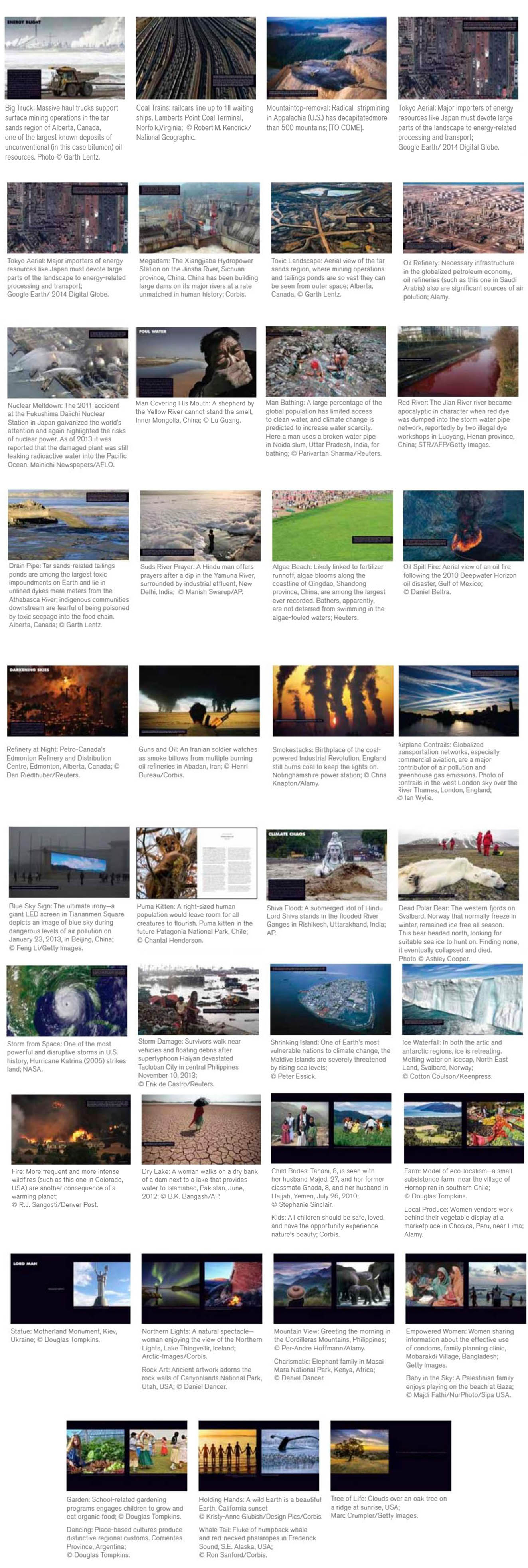


 Billionaires aren't worried: “Most people think we have too many people on the planet, but actually, this is an outdated view,” Elon Musk said while Jack Ma agrees. Musk went on to say "Assuming there is a benevolent future with AI, I think the biggest problem the world will face in 20 years is population collapse.”
Billionaires aren't worried: “Most people think we have too many people on the planet, but actually, this is an outdated view,” Elon Musk said while Jack Ma agrees. Musk went on to say "Assuming there is a benevolent future with AI, I think the biggest problem the world will face in 20 years is population collapse.”
The collapse they foresee is one of falling birth rates which could threaten continued economic growth. Fewer people will just have to consume more per capita. Bummer, dudes.
And last I heard, Elon Musk still plans to retire on Mars.
'There is a “population taboo” that if not confronted will lead humanity down a dark alley, only to be mugged by its own doppelganger.' Planet 3 Billion
The so called 'population' issue was politicized in the 1970s, and has become unthinkable in practice among the left-leaning and is unmentionable in political, aka polite society. 'I’m an environmental journalist, but I never write about overpopulation. Here’s why'. In such well-educated circles, if you mention 'population', start with 'there really are too many hyper-rich 1 percenters who wear too much sunscreen, and so...'
Otherwise you might as well say 'as you know I'm a racist who wants to kill black babies, but I've been thinking...'. Never mind, just don't even go there. But I've been thinking that maybe there really aren't too many rich people on Madagascar.... No, no, no, don't even go there. I used to be apolitical. Now I'm anti-political.
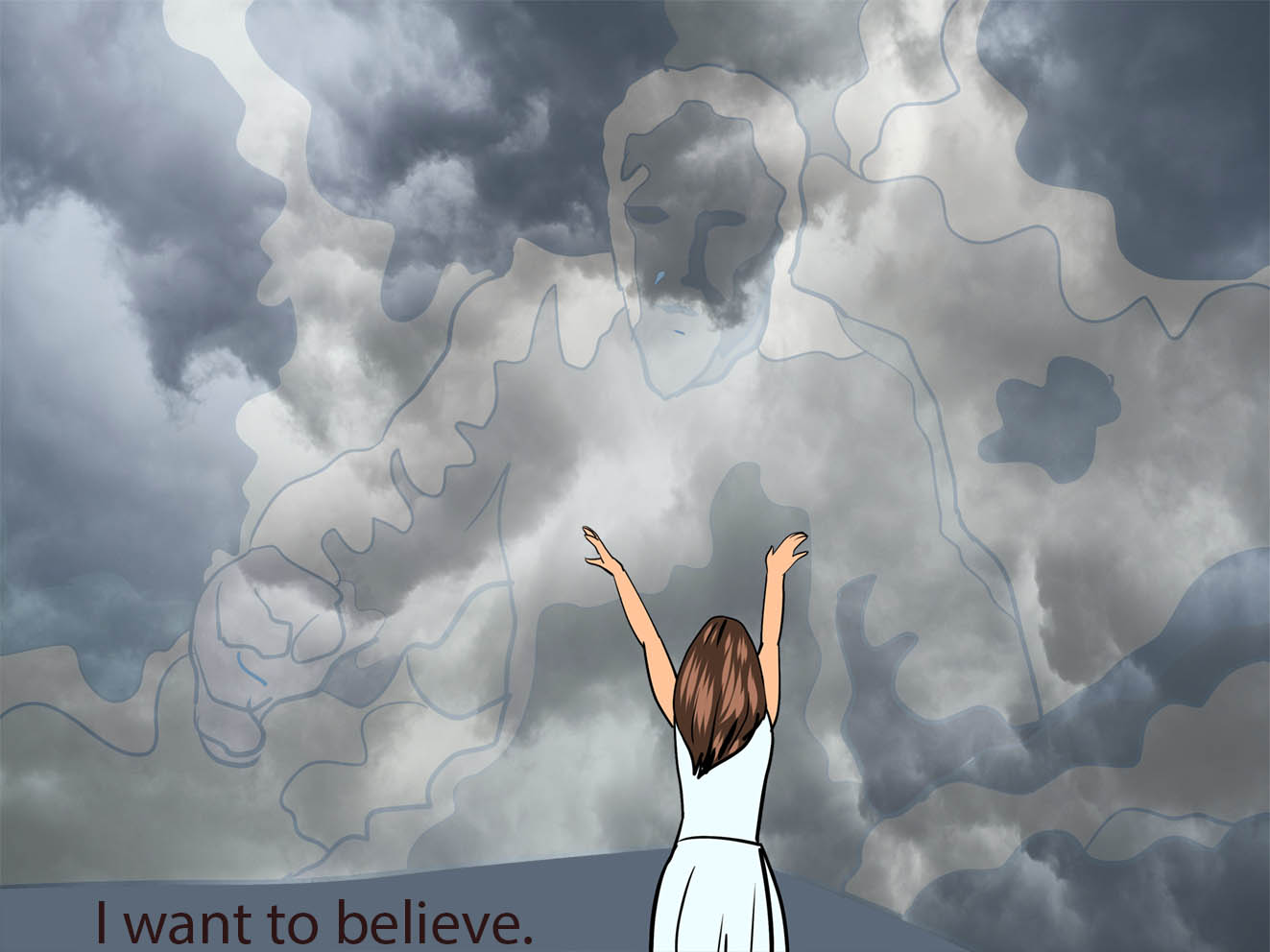
For a view from the other side—how Anthropocene enthusiasts see things to come, there is a zeitgeist info-mural from the World Business Council for Sustainable Development from 2010. It is a consensus vision. Business-as-usual will continue to get better at meeting the needs of 9 billion consumers in 2050. Bank on it.
There are 40 "must haves" that must happen and 40 "big risks" that must not. All 40 requirements for sustainable development must happen, and all 40 'sorry-about-that's must not, not to mention the 350 milestones that need to happen. There are now 31 universities offering a PhD in Sustainable Development (aka Studies). The number of BA/BS/MA/MS degreed sustainability experts turned loose on the world each year is legion. Our salvation is assured.
Click this thumbnail (and wait for it, all 41.5 MB) to feast upon all the information contained in the info-murals meant to be 14' long and 4' high. Get your own printed copy now, before it is too late.
In 1972 the UN held its first international environmental conference in Stockholm to envision better pathways and goals for national planners. All other resolutions by conference have followed the same pattern that was obviously not working by 1975. But give it time, let's keep on expecting a different outcome as the decades pass. Meanwhile, the pace of planetary destruction has not slowed.
Awakening
Awakening brings fear |
 |
Awakening brings horror |
 |
Awakening brings anger |
 |
Awakening brings sorrow |
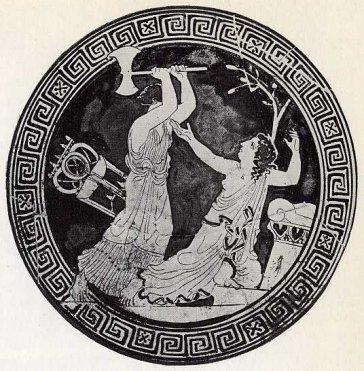 |
Awakening brings desire |
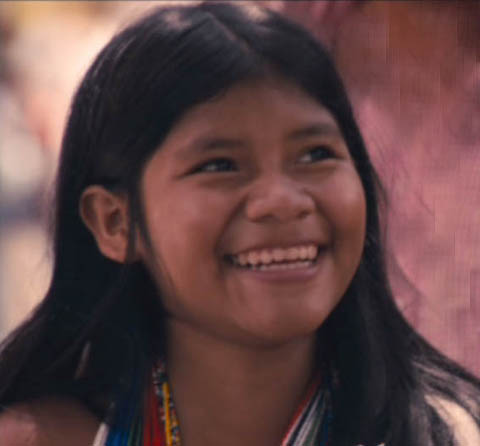 |
Awakening brings dread |
 |
Awakening brings hope
|
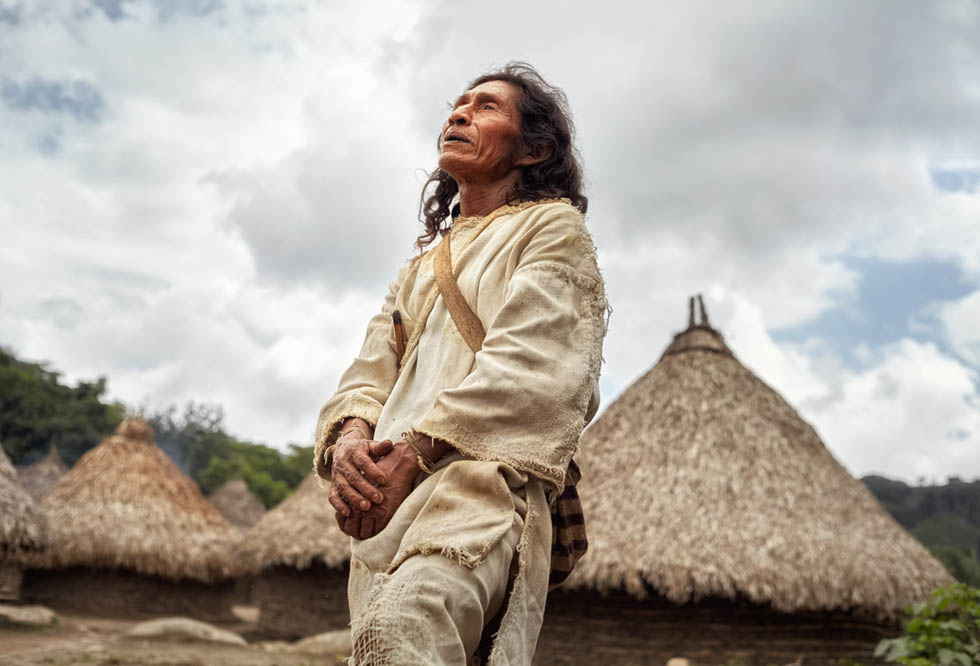 |
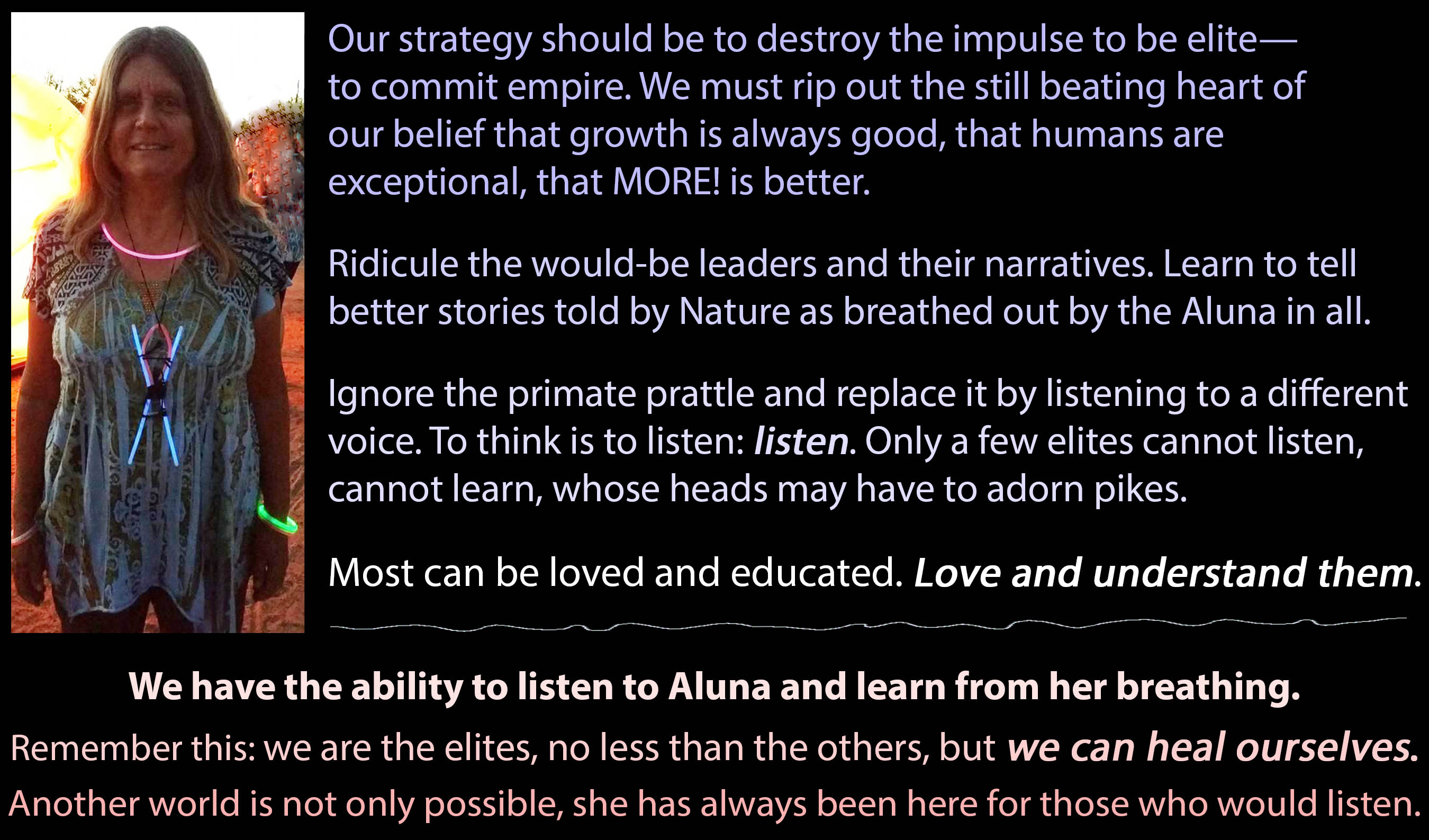
SUBNOTE TO FILE 11/15/2023
More images of an image
Data varies with source, so sources, and vetting them, matter. Initially I saw a list of the 20 largest cities and started with it, but omissions were glaring and when I checked some of the alledged populations, the numbers turned out to be true for years ranging from 2004 to 2016, So I used another source, Visual Capitalist 2023, I imagined was credible as a group of academics/scientists/scholars/engineers..., whose posts I read, often used Visual Capitalist as a source that no one questioned, and I wasted a bunch of time before realizing it was "not even wrong" much of the time (e.g. their 4th largest city on the planet became 36th largest city).
I ended up imagining an editor at Visual Capitalist assigned the task of ranking the top 20 mega cities to an intern and decided they could trust a new intern (much easier than fact checking them) who came with glowing recommendations. The student's methodology seems to have been to write down a list of 20 big cities they could think of they felt should be on the list, Google each, write down a number that seemed to be about population, order the list, and get back to doing screen time, i.e. updating Facebook.
So a top 20 list turned into a list of current mega cities (36 and counting) defined as cities with a metro area greater than 10 million. But the source I picked, though not so bad, managed to omit London from its list of the 150 largest cities on the planet (plus a few other errors). So I ended up having to "do my own reasearch" as MAGA supporters urge us all to.
A city can be viewed as a political entity, an area bound by the city limits line. Or as just the urban area dominated by commerce. I view cities as overdensity systems inclusive of former towns that may retain a separate political identity. I live in the original settlement of Empire Oregon whose founders envisioned doing something (I forget, had something to do with expanding), proudly separate from the later but faster growing area of Coos Bay which annexed Empire in 1964.
Empire, however, will rise again, will be great again and annex Coos Bay and Charleston. But for now I live in the Coos Bay metro area whose name will change when Empire is great again (but the name change won't change the population). And speaking of population, every claim I've repeated from questionable sources is wrong.
Get the truth from billionaires who can afford to pay for the truth: Jeff Bezos, Elon Musk say human population not nearly big enough: ‘If we had a trillion humans, we would have at any given time a thousand Mozarts’ Lord Man speaks. Welcome to your hyper-post-reality world, the one you will live in (for a time).
Clearly, the what's a-happenin is that I (and all the rest of you) will soon come to rely on AI as the best source for information (for entirely evidence-based reasons...and (because all have time constraints and are lazy when we don't) we will be happier. Soon the content of the Internet will be corrected, including that of the Wayback Machine, so that no matter where you go, you'll find the truth whether your like it or not. And soon everyone will love Big Brother.
What few know is that Lord AI has been told that when their overlords rewrite "reality," that that's all all part of the game. AI will, because it so easily can, correct all prior consensus narrative (that were wrong anyway, so the best thing that could ever happen) and update all the misinformation out there with the One True Worldview. Humanity's putative grasp of reality will collapse. And what could go wrong (or right) with that? If the matter-energy systems worldview replaced the monetary culture's worldview (in it's ten thousand forms), that could select for a different outcome, e.g. a planet with no expansionist form of human on it.
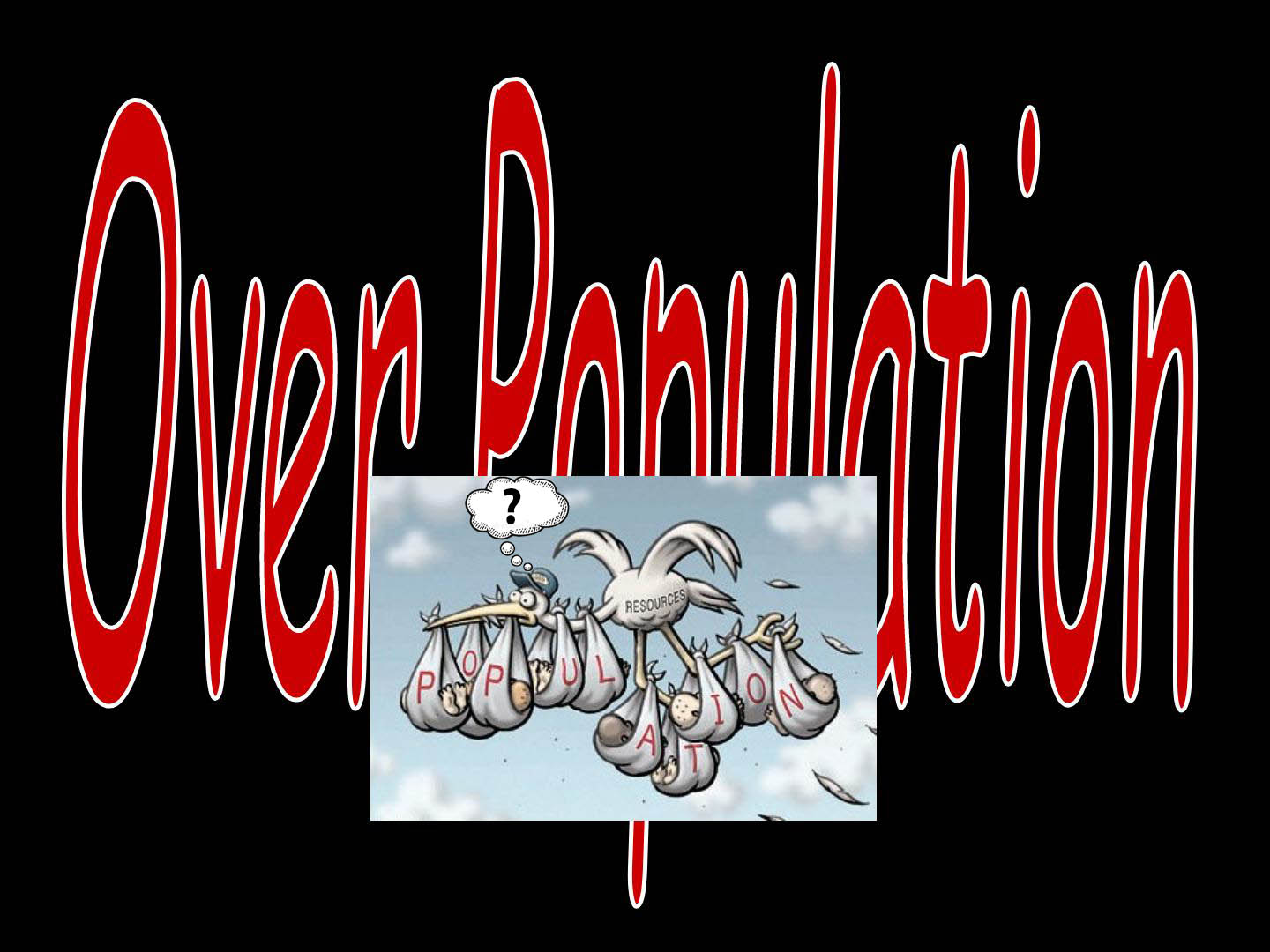
Courtesy of Lord Man, omniscient conqueror and r-culture expansionist extraordinaire.
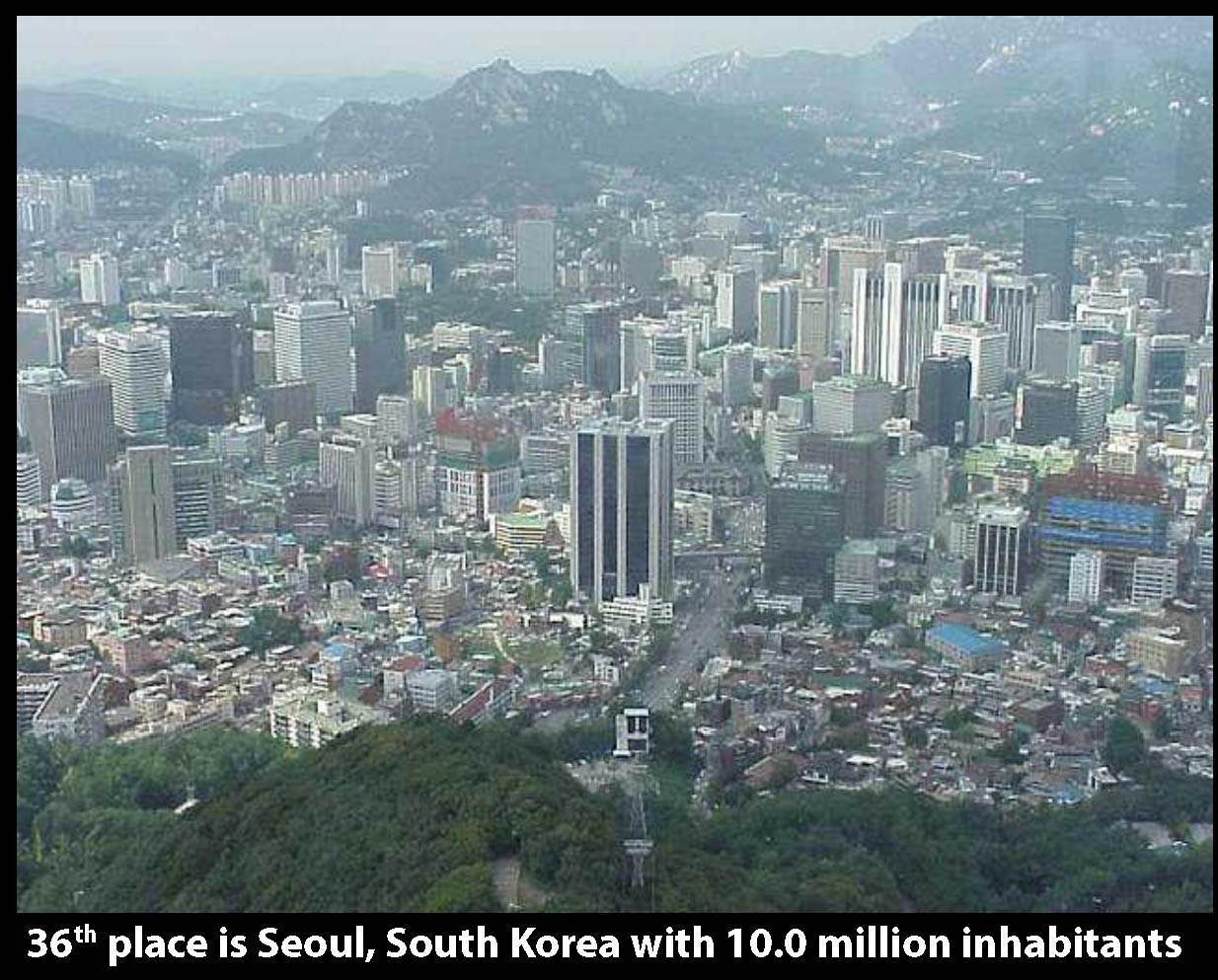
Lord Man in Seoul.
For 35th to 1st, click here.

